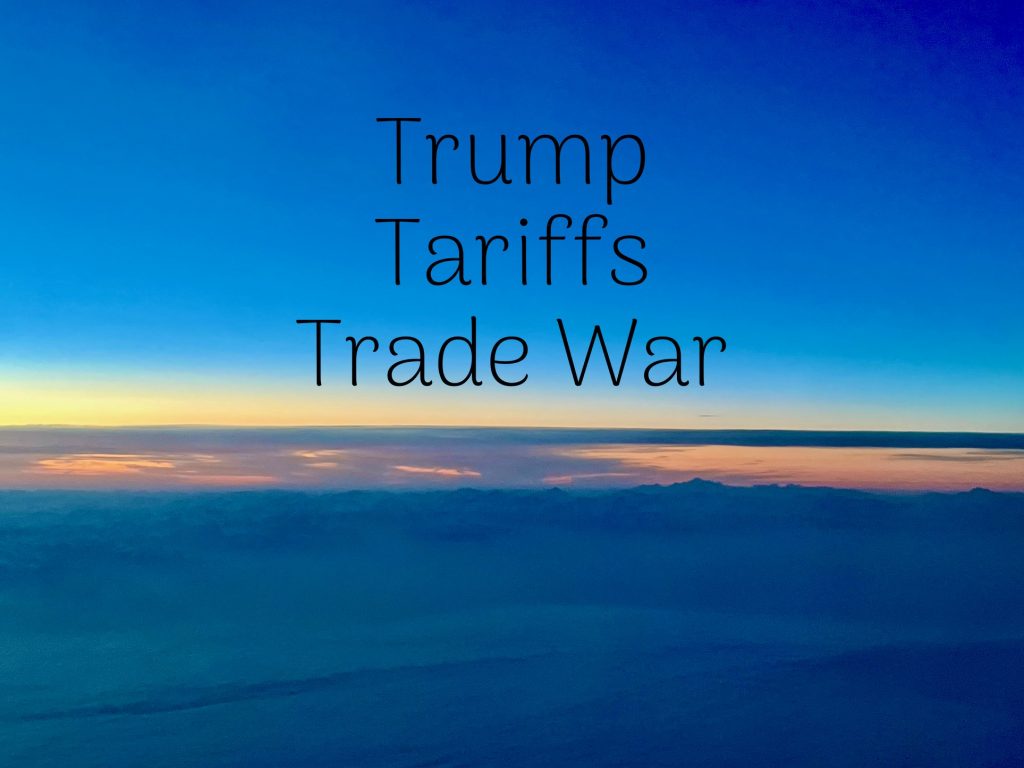
US President Donald Trump is imposing his tariffs to an absurd 104% rate for imports from China. Five days ago, China claimed a reciprocal 34% tariffs on all imports from the United States from April 10. But the latest wave pushed China to raise the import duties on imported US goods to 84%.
An escalating standoff between the world’s two biggest economies is looming. Markets across the globe lost trillions of dollars after Trump announced the new tariffs last week, with many Americans fearing price rises and some analysts predicting increased problems of recession.
The steep new duties on China and 184 other US trading partners are supposed to take effect today.
The EU is hitting back with tariffs on US goods, but in a seemingly too mild way. Facing 25% import tariffs on steel, aluminium and cars, as well as the new broader tariffs of 20% for almost all other goods, the 27-nation bloc under the European Commission, which coordinates EU trade policy, proposed the extra duties mostly of 25% on a range of U.S. imports. Still assessing how to respond to the car and broader levies, the EU is being already threatened to pay 200% tariff on the EU wine and spirits if it goes ahead with the planned 50% duty on bourbon.
Imports from the US to the EU include motorcycles, poultry, fruit, wood, clothing and dental floss, in total about 21 billion euros ($23 billion) last year, less than the 26 billion euros of EU metals exports hit by U.S. tariffs. As a matter of fact, the bigger chunk of the US import in the EU is the services offered by the US IT companies.
China’s State Council Tariff Commission issued a notice today, criticizing the US practice of escalating tariffs on China as a mistake on top of a mistake, seriously infringing on China’s legitimate rights and interests, and seriously damaging the rules-based multilateral trading system.
Analysts pointed out that if high tariffs continue to take effect, American consumers may face the pressure of price increases for many commodities such as electronic products, clothing, and home appliances. At the same time, it is not only Chinese manufacturers that are affected, but also small and medium-sized enterprises in the United States that rely on China’s supply chain. The latter will face the risk of a sharp increase in operating costs. (20250409 sources include BBC, Yahoo, Zaobao, RFI and Reuters)

Hours before the US President Trump disclosed his plan of the so-called “Liberation Day” for the US Americans, his special advisor Elon Musk had let the wind blow that he would retire in the coming weeks, probably at the end of May or early June, according to the US magazine “Politico” today.
With his Doge (Department of Government Efficiency), Musk has been in the past 130 days responsible for austerity measures, reducing state funds and dissolving various US authorities. Doge has caused, however, big confusion and protests.
Among much guess, one reason could be that Tesla is suffering from a strong sales loss. 13% fewer Tesla cars were delivered in the first quarter of 2025, compared with the same period last year. Musk’s prominent political role could have played a role in the loss, in addition to the competition from China, as was observed by the industry.
Meanwhile, how Trump’s carpet bombing of tariffs (as high as 34% for China and 20% for the EU) would affect the world economy and security, is by no means to be neglected.(20250402)
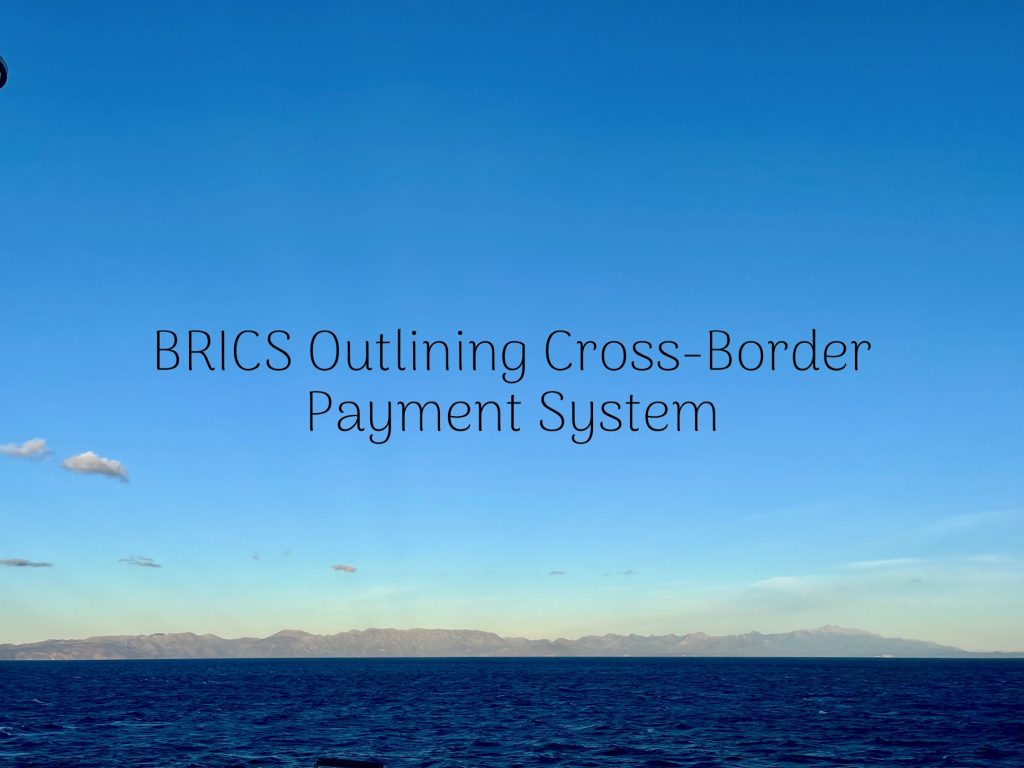
US President-elect Donald Trump has called on the BRICS countries to abandon the idea of a competing currency to the US dollar. Otherwise, the countries would be subject to 100 percent tariffs and would face having to say goodbye to selling their goods to the wonderful US economy, as how he put it.
The name “Brics” is made up of the initials of the first members of the group, which are Brazil, Russia, India, China and South Africa. The group now also includes Iran, Egypt, Ethiopia and the United Arab Emirates.
At their summit in October held in Kazan, Russia, the heads of state and government of the BRICS countries predicted that the group’s influence in world politics would grow significantly and outlined projects such as a cross-border payment system. This should help them trade with each other without using the dollar-dominated global financial system. Due to the size of China, the BRICS currently accounts for around 45 percent of the world’s population and 35 percent of the world economy – more than the G7 group of western industrialized countries. (20241201 source: t-online)
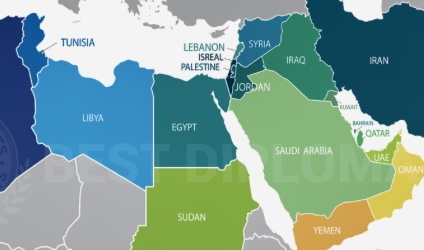
October 7th, 2024 marks one year since Hamas launched a large-scale terror attack in Israel, killing over 1,250 Israelis and foreign nationals. More than 250 people were abducted and taken to Gaza, including many women and children. Since then, the Middle East crisis has worsened to a complication of Israel being in fight with not only Palestine, but also Lebanon, Yemen and Iran. How the situation will affect the world peace is highly uncertain and worrying. (20241008)

In early May, the Chinese president XI Jinping was on a state visit to France, Serbia and Hungary. During the visit to Paris, the President of the European Commission Ursula von der Leyen emphasized how important relationships between the EU and China are. The conversation with the presidents of China and France, XI Jinping and Emmanuel Macron, in the Elysée Palace in Paris, was open and honest.
The relationships between the EU and China described the Leyen as a complex: “We start with a clear eye, constructive and responsible. A China that acts fairly is good for all of us. At the same time, Europe will not hesitate to make difficult decisions if it requires the protection of our economy and security.” The meeting touchted topics like geopolitics (Russia and the Middle East) as well as economic and trade questions. ( 20240507 Source: germany.representation.ec.europa.eu)
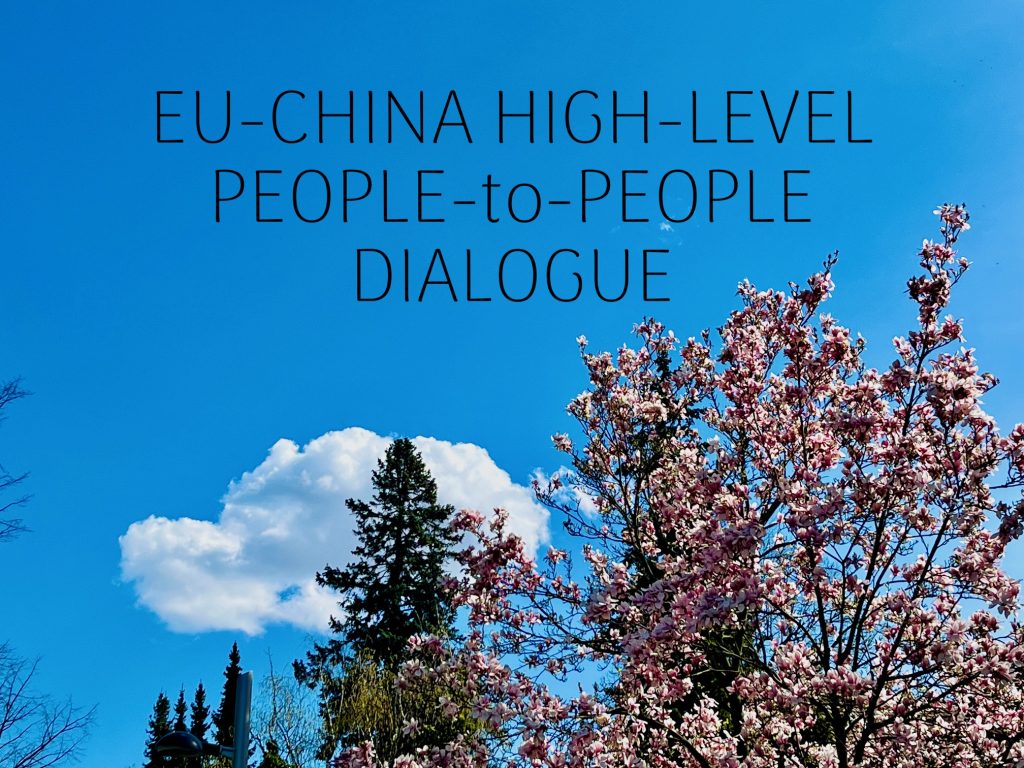
On 29.March 2024, the 6th EU-China High-Level People-to-People Dialogue (HLPPD) on education, culture, youth and sport took place in Beijing, China. This was the first in-person meeting since 2017. The meeting was held as a follow-up of the EU-China Summit that took place in Beijing on 7 December 2023.
The theme of this HLPPD was “working together for a greener and more sustainable future”, and the key role of education in underpinning the transition towards a greener society was one of the main topics of discussion. The need for a more balanced student mobility, which experienced a major set-back during the COVID-19 period was highlighted. The EU Commissioner Iliana Ivanova underlined the key importance of providing an open, welcoming and inclusive academic environment for European students too.
The discussion also included such topics as open scholarly exchange, civil society institutions, climate change, cultural heritage, gender equality and sport sector.
The High-Level People-to-People Dialogue (HLPPD) was launched in 2012 and is one of the High-Level dialogues held between the EU and China, along with the High-Level Strategic Dialogue, the High-Level Economic and Trade Dialogue, the High-Level Environment and Climate Dialogue and the High-Level Digital Dialogue. The HLPPD is the forum where the EU and China discuss mobility, education, gender equality, youth, sport and culture. (Source: European Commission)
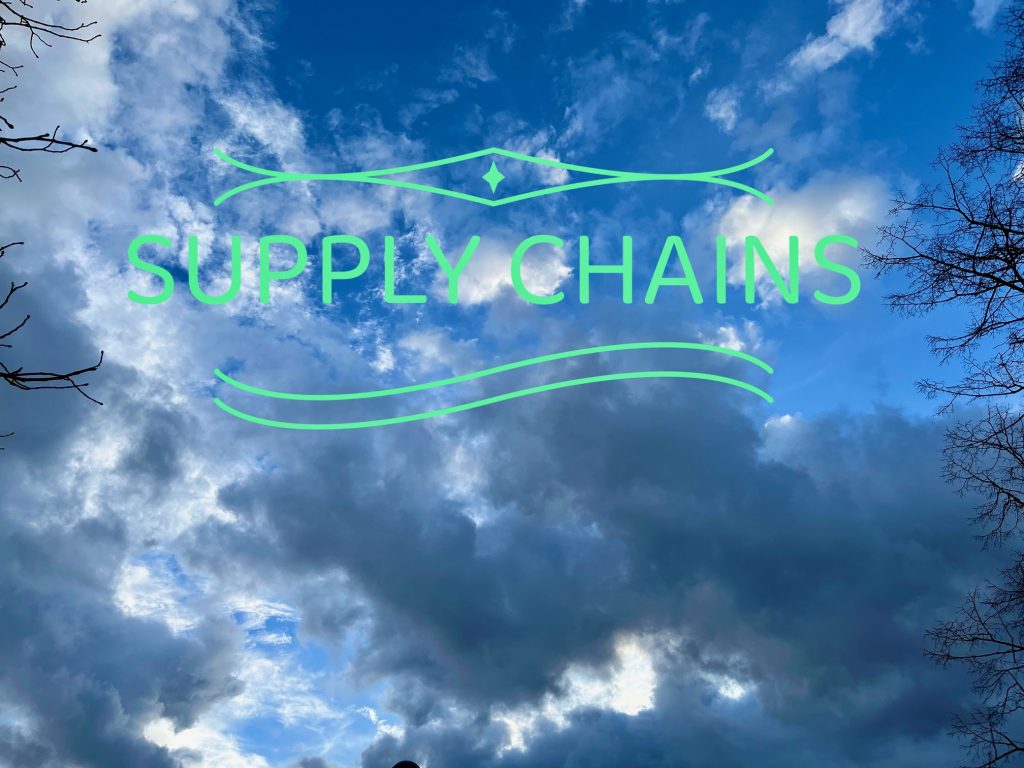
The draft of the EU supply chain directive in February 2024 has failed to be approved unanimously by the member states.
The EU directive is intended to oblige companies to be more responsible in their supply chain. Specifically, corporations with 500 or more employees and an annual turnover of 150 million euros should monitor their direct and indirect suppliers for violations of human and environmental rights. For vulnerable sectors such as the textile sector, a lower threshold of 250 employees and 40 million euros in sales applies.
Small and medium-sized businesses would also be indirectly affected, because larger corporations will contractually pass on their obligations to their direct suppliers. According to the draft guidelines, smaller companies must be supported by larger contractual partners, but many critics believe that this does not go far enough. They fear that responsibility will be passed on to smaller companies and that they will have to contend with additional bureaucracy.
In the course of more than two years of negotiations, the directive has already been weakened in several points. For example, the civil liability of companies has been defused, and the termination of a business relationship is explicitly defined in the directive as the “last resort” if no improvements are really possible for a supplier. Even in this case, the business relationship does not have to be terminated if termination would have even more serious consequences than maintaining it – which leaves a wide scope for interpretation. (Source: Der Standard 20240228)
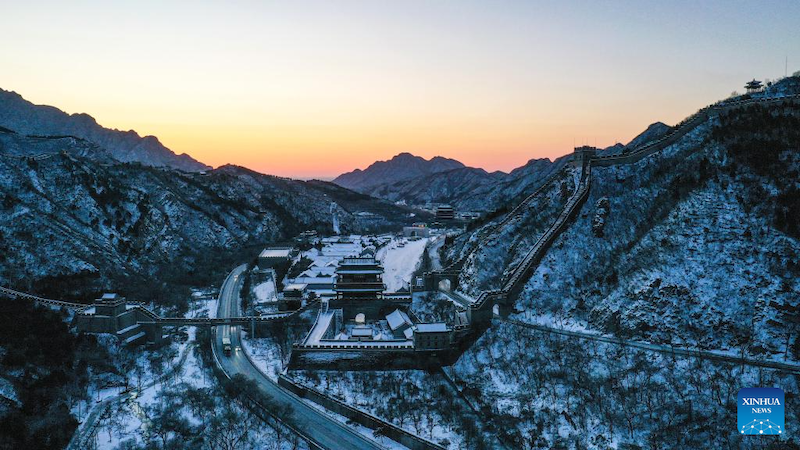
The snowfall hit Beijing a few days ago, followed by a cold wave with the lowest temperature at night around minus 15 degrees Celsius. Beijing is currently under an orange warning for heavy snow, a yellow warning for road icing, and a blue warning for cold wave. The public is advised to pay attention to cold avoidance and travel safety, and stay away from dangerous areas such as walls, old trees or plaques. Snow on various venues such as gymnasiums, long-span buildings, agricultural facility greenhouses, and temporary structures must be removed in a timely manner to prevent collapse, said the government. The icy roads and the heavy amount of accumulated snowfall have already caused casualties. Meanwhile, the snow scenery creates grandiose beauty as is shown in the photo by Xinhua.(2023.12)
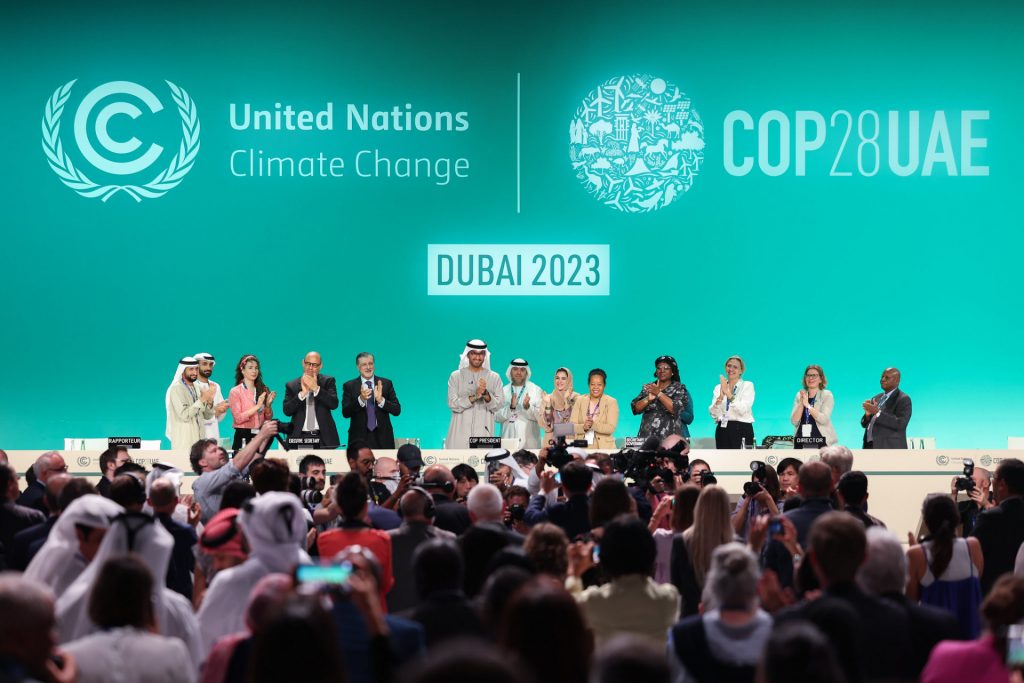
COP28 closed on 12.12.2023 with an agreement that signals the “beginning of the end” of the fossil fuel era by laying the ground for a swift, just and equitable transition, underpinned by deep emissions cuts and scaled-up finance.
In a demonstration of global solidarity, negotiators from nearly 200 Parties came together in Dubai with a decision on the world’s first ‘global stocktake’ to ratchet up climate action before the end of the decade – with the overarching aim to keep the global temperature limit of 1.5°C within reach.
“Whilst we didn’t turn the page on the fossil fuel era in Dubai, this outcome is the beginning of the end,” said UN Climate Change Executive Secretary Simon Stiell in his closing speech. “Now all governments and businesses need to turn these pledges into real-economy outcomes, without delay.” (Source: unfccc.int/cop28)
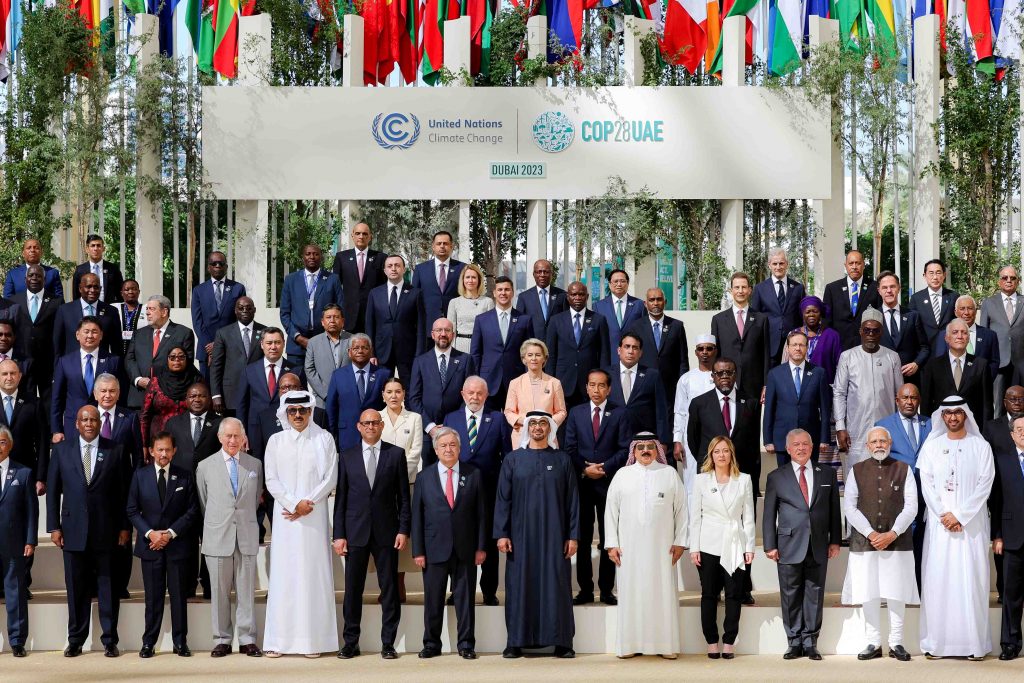
On 1-2 December 2023, world leaders gathered in Dubai, United Arab Emirates, for the world climate action summit to kick off the 28th United Nations climate change conference (COP28). The EU is the biggest provider of public climate finance in the world. In Dubai, President Charles Michel underlined that the EU is honoring its commitment to deliver on the $100 billion goal set by the Paris Agreement. The EU and its member states announced a contribution of €220 million to the loss and damage fund to help the poorest and most vulnerable countries. President Charles Michel also called for a reform of the international financial institutions to make them more just and more inclusive.
Every year, the COP meets to determine ambition and responsibilities for climate action, and to identify and assess climate measures. This year’s conference is hosted by the United Arab Emirates, which holds the COP28 presidency. The presidency’s plan of action to deliver on the pillars of the Paris Agreement focuses on four areas: fast-tracking the energy transition;
fixing climate finance; putting nature, people, lives and livelihoods at the heart of climate action; underpinning everything with full inclusivity. The main agenda items for COP28 are expected to be: a global stock-take, the mitigation work programme, the global goal on adaptation and climate finance, including financial arrangements for loss and damage. (Source: consilium.europa.eu)
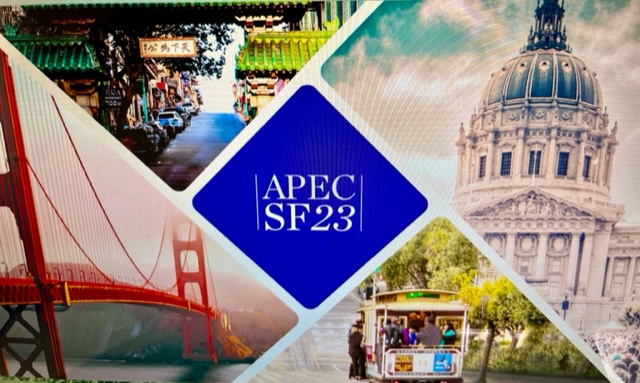
On 15.-17. November 2023, San Francisco hosted the Asia-Pacific Economic Cooperation (APEC) Leaders’ Week 2023 with the theme of “Creating a Resilient and Sustainable Future for All.”
During the summit, US President Joe Biden and Chinese leader Xi Jinping spoke for several hours face-to-face, striving to stabilize the fraught US China relationship. The reached agreements include combating illegal fentanyl and re-establishing military communications.
After several years of deteriorating relations between Washington and Beijing, Biden described the talks as the “most constructive and productive” since he came to office. “We’re not trying to decouple from China, but what we’re trying to do is change the relationship for the better,” he told reporters at the White House. But there were still deep differences on economic competition and global security threats.
A press conference with China’s Foreign Minister Wang Yi in California following the bilateral meeting also underscored some of those optics. “(The Xi-Biden meeting) is sure to become a milestone … and a major event in today’s international relations,” Wang said.
Xi signaled later Wednesday that China would send the U.S. new pandas, just a week after three from the Smithsonian National Zoo were returned to China much to the dismay of Americans. The signals are marking a shift in tone for China on US. The positive coverage of the event is huge on the Chinese social media.
China is ready to be a partner and friend of the United States, and there is plenty of room for bilateral cooperation, President Xi Jinping told American executives in San Francisco on Wednesday, as Beijing looks to reassure global business and counter his country’s struggles to entice foreign investment. (20231117)
(Sources: USIP, apnews, CNN, REUTERS)

On the Friday morning of October 7, Hamas launched several thousand rockets into southern and central Israel, killing more than 1400 people and taking more than 200 as hostages. Israeli forces started their bombardment in Gaza Strip hours later. Since then, the humanitarian situation in Gaza Stripe with around 2.2 million inhabitants has been drastically worsening.
As of this Saturday, October 21, the Rafah border crossing between Egypt and Gaza opened to let 20 aid trucks enter Gaza, bringing some desperately needed aid to Palestinians include food, medicine and water. Shortly before that, two American hostages were released by Hamas.
The UN praises Egypt for its humanitarian efforts, but says that 100 trucks are needed every day to meet basic needs in the Gaza Strip.
Meanwhile, an Israeli army spokesman announced this Saturday evening that the army would continue preparations for the “next phase of the war” in the Gaza Strip, which includes operations on the ground.
Hezbollah deputy leader Sheikh Naim Kassem says the Iran-backed militant group is already “at the heart of the fight” in Lebanon and that Israel will pay a heavy price if it begins its ground offensive in the Gaza Strip.
Speaking on the phone this Saturday with Hamas leader Ismail Hanija, Turkish President Recep Tayyip Erdogan is committed to a ceasefire as soon as possible (according to the Turkish government’s press service). Erdogan wants to seek further humanitarian aid for the Gaza Strip, too. He also reiterated his view that a lasting peace solution in the Middle East would only be possible with a Palestinian state within the 1967 borders with East Jerusalem as its capital.
Egypt also continues to advocate for a two-state solution between Israelis and Palestinians. An “independent Palestinian state” must emerge in a short time should the current crisis lead to a “new political spirit,” said the Egyptian presidential office in Cairo.

This November (11-17, 2023) will see the Asia-Pacific Economic Cooperation Leaders’ Meeting on its 30th anniversary being held in San Francisco, California. The 21 APEC Member Economies account for nearly 40 percent of the global population and nearly 50 percent of global trade.
This year’s themes include Sustainability / Inclusivity / Innovation / Resilience.
The joint vision of APEC and its 21 Member Economies is to realize an open, resilient, dynamic, and peaceful Asia-Pacific community by 2040 for the prosperity of all our people and future generations. To achieve this, APEC relies on three drivers of economic growth: trade and investment; innovation and digitalization; and strong, balanced, secure, sustainable, and inclusive growth.
(Source: apec2023sf.org)

The 15th BRICS Summit was held this year from 22. To 24. August 2023. On 24 August, BRICS CHAIR President Cyril Ramaphosa’s Media Briefing Remarks announced the Outcomes of the XV BRICS Summit, which is as follows:
Excellencies, Members of the Media,
Good Afternoon!
We successfully concluded the 15th BRICS Summit yesterday.
It is the first BRICS Summit to be hosted in-person since the COVID-19 pandemic and the subsequent global travel restrictions.
Leading up to the Summit, there was a wide-ranging BRICS business programme aimed at attracting investment, promoting collaboration and showcasing opportunities within South Africa, Africa and BRICS countries.
We welcome the clear vision of Ms Dilma Rousseff as the President of the New Development Bank on the role that the Bank should play in support of infrastructure and sustainable development in Africa and the Global South.
We celebrated the 10th anniversary of the establishment of the BRICS Business Council and welcomed the self-review by the Council and the subsequent recommendations made to Leaders.
We also welcomed the work of the BRICS Women’s Business Alliance in their first in-person engagement with leaders. We particularly welcomed the participation of youth representatives in the Summit.
We addressed our expectations for the BRICS economic partnership to generate tangible benefits for our communities and deliver viable solutions for common challenges faced by the global South.
We shared our vision of BRICS as a champion of the needs and concerns of the peoples of the Global South. These include the need for beneficial economic growth, sustainable development and reform of multilateral systems.
We reiterate our commitment to inclusive multilateralism and upholding international law, including the purposes and principles enshrined in the United Nations Charter.
We are concerned about ongoing conflicts in many parts of the world. We stress our commitment to the peaceful resolution of differences and disputes through dialogue and inclusive consultation.
The Summit noted that an unbalanced recovery from the hardship of the COVID-19 pandemic is exacerbating inequality across the world.
We encourage multilateral financial institutions and international organisations to play a constructive role in building global consensus on economic policies.
We have noted that there is global momentum for the use of local currencies, alternative financial arrangements and alternative payment systems.
As BRICS, we are ready to explore opportunities for improving the stability, reliability and fairness of the global financial architecture.
The Summit agreed to task the BRICS Finance Ministers and/or Central Bank Governors, as appropriate, to consider the issue of local currencies, payment instruments and platforms and report back to the BRICS leaders by the next Summit.
This Summit reaffirmed the importance of BRICS people-to-people exchanges in enhancing mutual understanding, friendship and cooperation.
The Summit appreciates the progress made over the last year in the fields of media, culture, education, sports, arts, youth, civil society and academic exchanges.
We adopted the Johannesburg II Declaration which reflects key BRICS messages on matters of global economic, financial and political importance.
It demonstrates the shared values and common interests that underlie our mutually beneficial cooperation as the five BRICS countries.
BRICS itself is a diverse group of nations.
It is an equal partnership of countries that have differing views but have a shared vision for a better world.
As the five BRICS countries, we have reached agreement on the guiding principles, standards, criteria and procedures of the BRICS expansion process, which has been under discussion for quite a while.
We have consensus on the first phase of this expansion process, and further phases will follow.
We have decided to invite the Argentine Republic, the Arab Republic of Egypt, the Federal Democratic Republic of Ethiopia, the Islamic Republic of Iran, the Kingdom of Saudi Arabia and the United Arab Emirates to become full members of BRICS. The membership will take effect from 1 January 2024.
We value the interest of other countries in building a partnership with BRICS.
We have tasked our Foreign Ministers to further develop the BRICS partner country model and a list of prospective partner countries and report by the next Summit.
Today, we will be hosting leaders from Africa and the Global South in the BRICS-Africa Outreach and BRICS Plus Dialogue.
This is so that we can have an inclusive dialogue on key issues affecting developing economies and identify actions that we can take together towards a more equitable, inclusive and representative world.
May I conclude by thanking the leaders of Brazil, Russia, India and China, together with their delegations, for participating in this most successful 15th BRICS Summit held in Johannesburg, South Africa.
Through this Summit, BRICS has embarked on a new chapter in its effort to build a world that is fair, a world that is just, a world that is also inclusive and prosperous.
I thank you. (*ISSUED BY THE PRESIDENCY OF THE REPUBLIC OF SOUTH AFRICA*)
(Source: https://brics2023.gov.za/media-releases/)
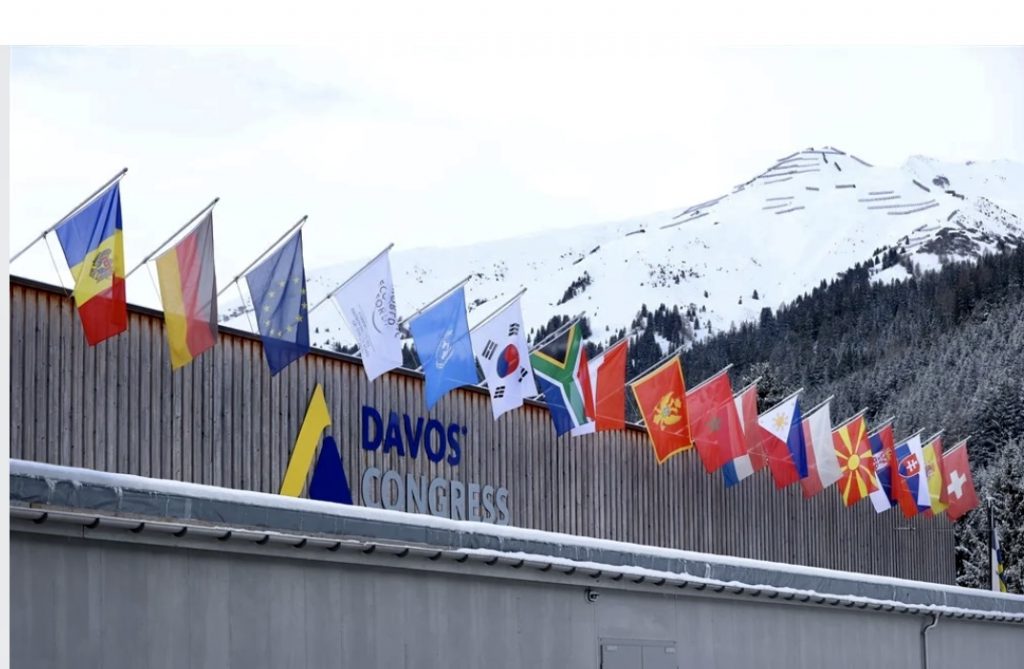
2023 DAVOS Summit from 17-19 January are gathering global leaders to accelerate progress towards reaching net-zero, nature-positive targets by discussing in detail the inextricable links between the climate crisis, nature’s collapse, the energy transition, and global food security. New approaches and partnerships are supposed to be explored to find new solutions – such as leveraging philanthropy in new ways, driving climate adaptation and spurring more ambitious, comprehensive and sustainable infrastructure investment plans that can stabilize the natural world while helping the world meet the 2030 emissions reduction targets.
According to Reuters, the first day of official program kicked off with bold declarations by Europe and China in attempts to bolster their positions in the world. The EU is countering the USA’s game-changing Inflation Reduction Act (IRA) which was described in DAVOS as the most significant climate legislation since the 2015 Paris Agreement, with its own green deal. Ursula von der Leyen said the EU would mobilize state aid and a sovereignty fund to keep firms from moving to the United States. Meanwhile, with Vice-Premier Liu He as participant of the Summit, the reopened China expressed the wish of hoping international investors to play a key role in Beijing’s attempts to revive its slowing economy. (Source: weforum.org, Reuters)
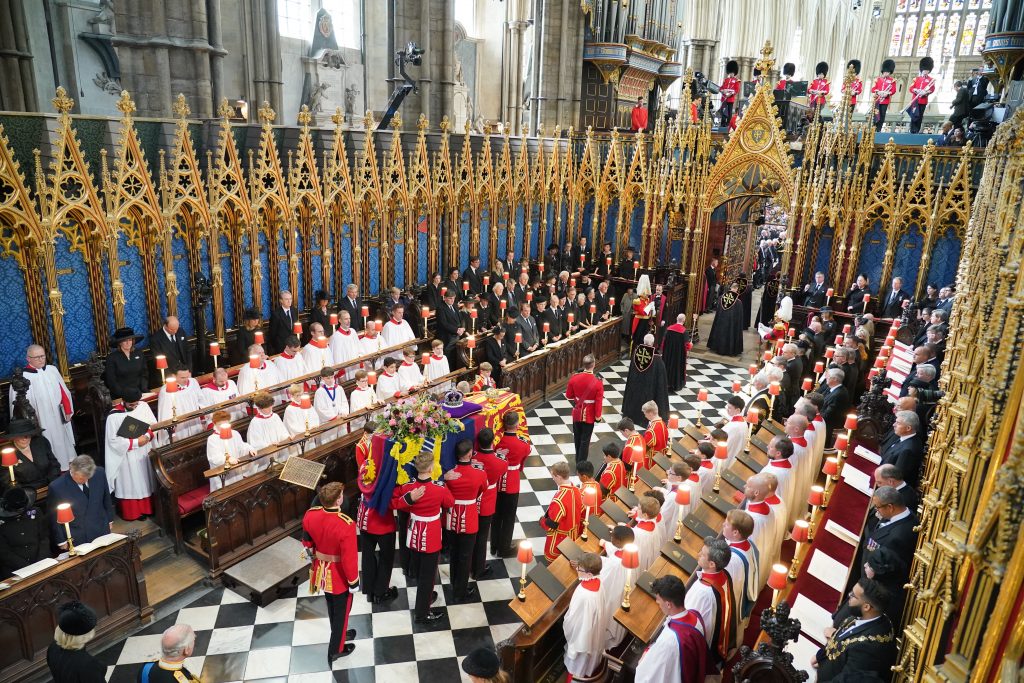
The coffin of Queen Elizabeth II, draped in the Royal Standard with the Imperial State Crown and the Sovereign’s Orb and Sceptre, is carried from her State Funeral at Westminster Abbey in London. Picture date: Monday September 19, 2022.
The State Funeral for Her Majesty The Queen took place at Westminster Abbey on Monday 19th September at 11am. The Funeral Service and the associated ceremonial arrangements paid tribute to The Queen’s extraordinary reign, and Her Majesty’s remarkable life of service as Head of State, Nation and Commonwealth.
The Queen’s Coffin had been Lying-in-State since the evening of Wednesday 14th September. At 6.30am on the morning of Monday 19th September, the Lying-in-State ended.
The funeral included the State Funeral Service, the Procession from Westminster Abbey to Wellington Arch, the Procession from Albert Hall, Windsor to St George’s Chapel, and the Committal Service. The Queen was buried together with The Duke of Edinburgh, at The King George VI Memorial Chapel.
At 10.44hrs the Coffin was borne in Procession on the State Gun Carriage of the Royal Navy from the Palace of Westminster to Westminster Abbey for the State Funeral. Immediately following the Coffin was The King, Members of the Royal Family and members of The King’s Household.
The State Funeral Service was attended by Heads of State and Overseas Government Representatives, including Foreign Royal Families, Governors General and Realm Prime Ministers. Other representatives of the Realms and the Commonwealth, the Orders of Chivalry including recipients of the Victoria Cross and George Cross, Government, Parliament, devolved Parliaments and Assemblies, the Church, and Her Majesty’s Patronages formed the congregation, along with other public representatives. (royal.uk)
The funeral included the State Funeral Service, the Procession from Westminster Abbey to Wellington Arch, the Procession from Albert Hall, Windsor to St George’s Chapel, and the Committal Service. The Queen was buried together with The Duke of Edinburgh, at The King George VI Memorial Chapel.
Queen Elizabeth II was queen regnant of 32 sovereign states during her lifetime and 15 at the time of her death. Reigning for 70 years and 214 days, she is the longest of any British monarch, the longest recorded of any female head of state in history, and the second-longest verified reign of any sovereign in history.

On 15. September, Chinese President Xi Jinping and Russian President Vladimir Putin met in person at the Shanghai Cooperation Organization (SCO) Summit. It is time to reshape the international order and abandon the “zero-sum game and bloc politics,” Xi said in Samarkand, Uzbekistan. While condemning the “instruments of protectionism, illegal sanctions and economic selfishness”, Putin stated that the growing role of new centers of power to cooperate with each other is becoming increasingly clear.
Noticeably, Xi Jinping did not mention Ukraine in his public speech. To this, Putin said that he understood China’s questions/concerns about the situation in Ukraine and praised China’s “balanced position” on the Ukraine issue.
Xi Jinping stressed that China is willing to give strong support to Russia on issues concerning each other’s core interests by deepening practical cooperation in trade, agriculture, connectivity and other fields. The two sides should strengthen coordination and cooperation within multilateral frameworks such as the Shanghai Cooperation Organization, CICA, and BRICS, promote solidarity and mutual trust among all parties, expand practical cooperation, safeguard the security interests of the region, the common interests of developing countries and emerging market countries. (20220916)

Becoming Britain’s new prime minister today, Liz Truss is Britain’s fourth Tory prime minister in six years after Tory MPs ousted Boris Johnson. She is expected to announce plans for an energy price freeze soon as she faces the worst economic crisis in a generation. A politician from toughly going against Brexit to completely supporting it, Liz Truss is supposedly a pragmatist. (20220906)
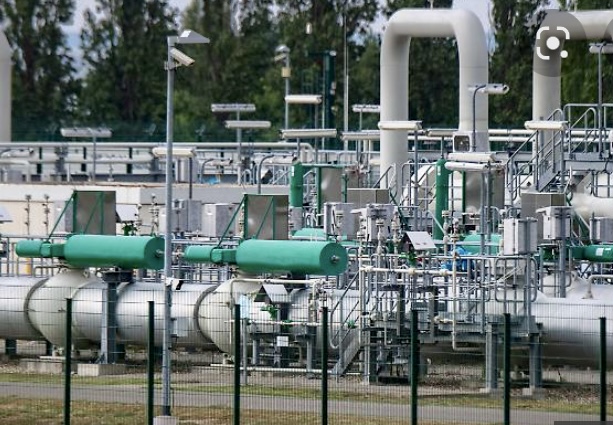
For weeks and months, Russia has been accused of using the “technical problems” with maintenance work on Nord Stream 1 as an excuse to restrict gas supplies. As the “Financial Times” now reports, Russia is linking an end to the gas freeze with the lifting of European sanctions against it. (20220906)
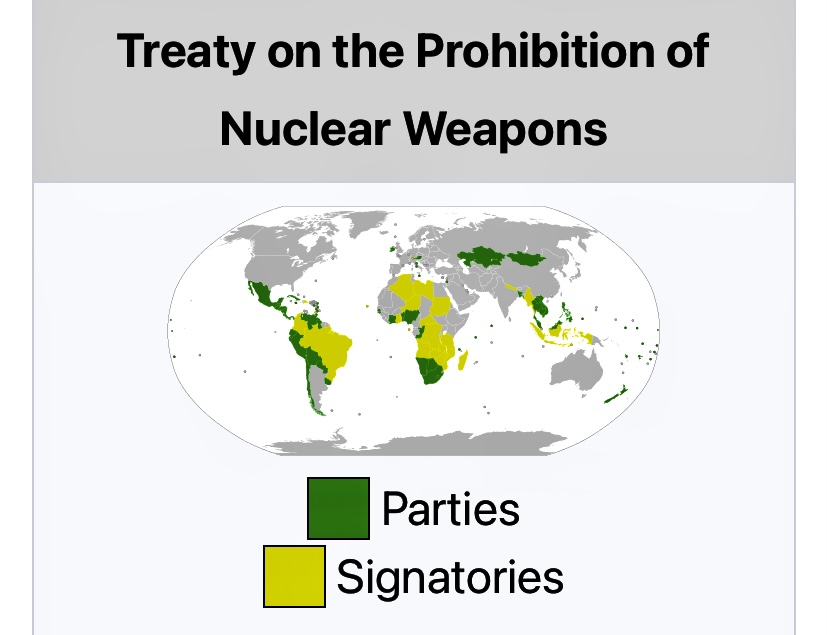
From 21 to 23 June 2022, the UN States Parties’ Meeting on Treaty on the Prohibition of Nuclear Weapons (originally scheduled to be held in January this year) is held at the Austria Center Vienna. The Secretary-General of the United Nations António Guterres circulated a note on 4 April 2022, verbale convening the Meeting of States Parties and inviting States not party to the TPNW to attend the Meeting as observers. The Treaty on the Prohibition of Nuclear Weapons (TPNW) entered into force on 22 January 2021. Article 8, paragraph 2, of the Treaty specifies that “the first meeting of States Parties shall be convened by the Secretary-General of the United Nations within one year of the entry into force of this Treaty.” (20220621 Source: UNODA)
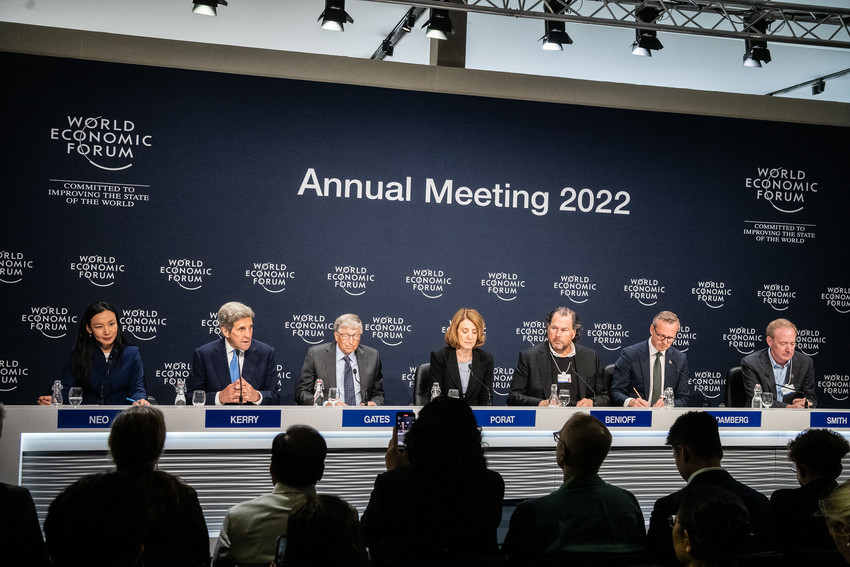
From May 22 to 26, 2022, the Davos Forum, hosted by the WEF (World Economic Forum), was held in Davos, Switzerland. About 2000 global participants were present including heads of state and governments, company CEOs, civil society leaders, global media outlets, and youth leaders from around the world. It was the first time since the outbreak of COVID-19 that the Forum was held in an in-person meeting format.
For more than 50 years, the Davos Forum has served as a global platform for leaders of business, government, international organizations, civil society and academia to gather together to address the actual critical issues.
This year, the Forum agenda includes topics such as the war in Ukraine, world economy, the future of globalization, technology, health matters, food and energy crises, climate change and environment, the role of business and entrepreneurs, etc.. (20220528) (Source: weforum.org)

On Thursday 25. November, the discovery of a new coronavirus variant with the scientific name B.1.1.529 was announced in South Africa. Soon afterwards, it is given the name of Omicron. The medical world is very much concerned, believing that this variant could lead to the virus multiplying much faster or more infectious. If the antibodies through the vaccinations up to now could still neutralize the virus efficiently is a big question, too. The rapid viral load of the new variant observed through the two confirmed Omicron infected cases in Hong Kong is a bad sign. While still tested negative a few days earlier,the PCR test results of the two men showed a Ct value of 18 and 19. More worrying is the ability of the infection by Omicron. The man in Hong Kong infected a 60-year-old in the opposite room of the quarantine hotel, despite strict isolation.
In the Netherlands, 61 flight passengers from South Africa tested positive today for the corona virus. The tests were carried out on arrival at Schiphol Airport in Amsterdam, said the Dutch health authority GGD. The passengers arrived on two flights from South Africa. (Source: tagesschau.de 20211127)

The 2021 United Nations Climate Change Conference (COP26) is being held right now in Glasgow, Scotland, United Kingdom. 197 nations negotiate for two weeks at the UN climate conference in Glasgow on the further implementation of the Paris climate protection agreement of 2015. It provides for the limitation of global warming to well below two degrees, ideally 1.5 degrees, compared to the pre-industrial age.
Now that the G20 summit in Rome at the past weekend did not provide the signal that many would have wished for the summit in Glasgow, the COP26 between 31 October and 12 November 2021 is very much anticipated, even if the joking keyword is “hot air”.
Concerning the climate change, the UN Secretary General António Guterres spoke of a “moment of truth”, saying that the world was heading for a climate catastrophe. For island states and other particularly vulnerable countries, the failure of climate protection efforts is not an option, but “a death sentence for their economies and our planet”, he warned, ending his speech at the conference by saying: “There is one path forward. A 1.5 degree future is the only viable future for humanity. Leaders must get on with the job in Glasgow, before it’s too late.”
On the second day of the Conference, leading politicians again made an urgent call for climate protection. German Chancellor Angela Merkel is making a plea for pricing carbon emissions, and US President Biden promised actions instead of words, an effort to stand out from his predecessor.
Merkel made it clear that Germany will contribute and save a total of 65 percent of emissions by 2030 compared to 1990. By 2045, the Federal Republic wants to be climate neutral. Biden said that emissions in the USA would be reduced by more than a gigaton, or 50 to 52 percent, by 2030. He was referring to the emissions from 2005.
French President Emmanuel Macron called on countries with particularly high greenhouse gas emissions to adopt more committed climate policies. “The key for the next two weeks is that the largest emitters, whose national plans do not match the 1.5-degree target, set their ambitions higher,” Macron said in Glasgow. India’s Prime Minister Narendra Modi mentioned a goal for his country’s climate neutrality, too: by 2070, the world’s most populous country only wants to emit as many climate-damaging emissions as can be absorbed in sinks such as oceans and forests.
By the end of the first week, more than 40 countries made a commitment to phase out coal by 2050, and around another 100 countries pledged to end or reverse the vicious state of deforestation by 2030. At the same time, the United States and the European Union announced that they would cooperate to reduce methane emissions.
On 10th November, two days before the official end of the conference, China and the United States unexpectedly issued a joint statement, with a view to working together to accelerate the development of green and carbon dioxide-free future transformation.
The conference was lengthened to 13th November. But the day saw the final statement being weakened, failing to pass the cancellation of “ineffective” subsidies for oil, natural gas and coal under pressure from China and India. European Commissioner Frans Timmermans expressed disappointment, meanwhile praised the requirement to phase out coal as “historic.” (20211114)
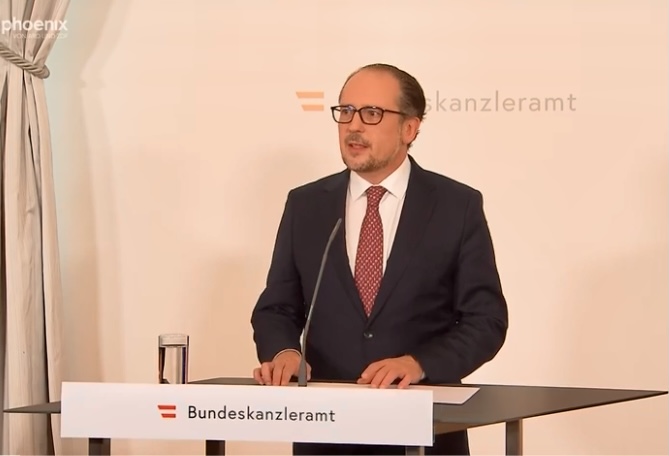
Austrian Chancellor Sebastian Kurz stepped down on 10th October in a bid to defuse a government crisis amid a corruption probe. A target of a corruption investigation, Kurz denied all the blames and prosecutions.
Alexander Schallenberg, the former Foreign Minister, took over the office as new chancellor. His post was followed by Michael Linhart. Schallenberg’s immediate declaration in public that he would continue to work closely with Kurz, who was newly elected ÖVP club chairman of the parliamentary club and federal party chairman, has aroused a big debate on the present political culture in Austria, and also offered a window to look into the Austrian mentality. (20211015)
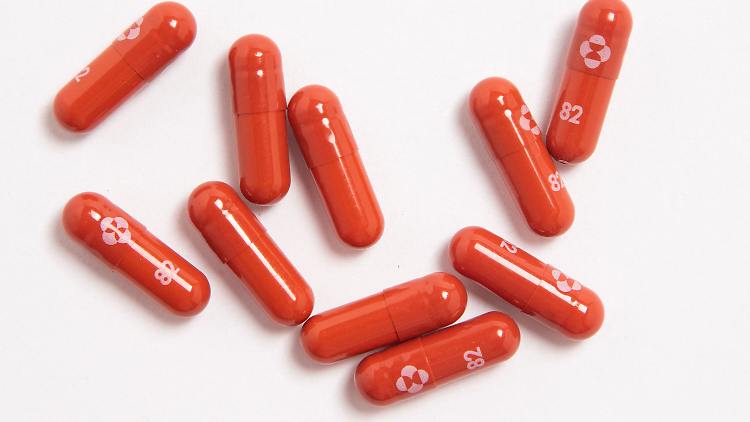
Merck and Ridgeback Biotherapeutics announced on 1. October 2021 that molnupiravir (MK-4482, EIDD-2801), an investigational oral antiviral medicine, significantly reduced the risk of hospitalization or death at a planned interim analysis of the Phase 3 MOVe-OUT trial in at risk, non-hospitalized adult patients with mild-to-moderate COVID-19. At the interim analysis, 7.3 percent of patients who received molnupiravir were hospitalized through day 29, compared with 14.1 percent of placebo-treated patients who were hospitalized or died.
In anticipation of the results from MOVe-OUT, Merck has been producing molnupiravir at risk. Merck expects to produce 10 million courses of treatment by the end of 2021, with more doses expected to be produced in 2022.
Earlier this year, Merck entered into a procurement agreement with the U.S. Government under which Merck will supply approximately 1.7 million courses of molnupiravir to the U.S. government, upon EUA or approval from the U.S. FDA. Additionally, Merck has entered into supply and purchase agreements for molnupiravir with other governments worldwide, pending regulatory authorization, and is currently in discussions with other governments.
Merck is committed to providing timely access to molnupiravir globally, if it is authorized or approved, and plans to implement a tiered pricing approach based on World Bank country income criteria to reflect countries’ relative ability to finance their health response to the pandemic.
The Phase 3 portion of the MOVe-OUT trial was conducted globally in more than 170 planned sites in countries. The most common risk factors for poor disease outcome included obesity, older age (>60 years), diabetes mellitus, and heart disease. To date, the Delta, Gamma, and Mu variants have accounted for nearly 80% of the evaluable cases in the trial. Recruitment in Latin America, Europe, and Africa accounted for 55%, 23% and 15% of the study population, respectively. (merck.com)
Meanwhile, there are words spreading that according to some study, an effective component of the drug has at least the potential to damage the human genome. It is the N4-hydroxycytidine (NHC) molecule. It mimics nucleosides, the building blocks of RNA viruses such as Sars-CoV-2, and it can stop them from multiplying by making the viruses’ genetic makeup illegible. (20211006)
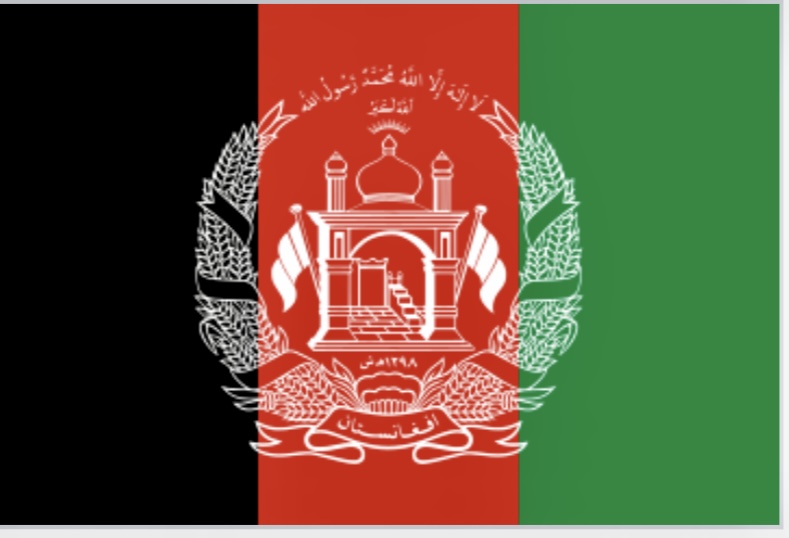
Facing the situation in Afghanistan, the UN Secretary General António Guterres expressed great concern about the worsening humanitarian and economic crisis in the country. He added that basic services threatened to collapse in the Taliban-ruled country.
Around 38 million people currently live in Afghanistan. Three quarters of them cannot read or write. The infrastructure is on the ground. The country has the lowest Internet penetration in the Asia-Pacific region, with fewer than ten connections per 100 inhabitants. In addition, almost half of women and a third of all men live below the poverty line. Every third Afghan does not know where their next meal will come from, warned Guterres.
Meanwhile, the US president Joe Biden again emphasized that he did not want to forever prolong the war, which should have ended a long time ago. His predecessor Donald Trump had signed an agreement with the Taliban and promised the withdrawal of US troops. He himself had the choice of sticking to it or sending tens of thousands more US soldiers to Afghanistan and continuing the mission. Biden said he took responsibility for the US withdrawal from the country, which was dramatic, deadly, chaotic, frustrating, and tragic for those left behind, but did not admit his own mistakes in the event. He blamed the former Afghan government and the country’s security forces for the Taliban’s takeover. Contrary to expectations, the Afghan security forces were not a strong opponent in the fight against the Taliban, said Biden.
Shortly before, the radical Islamic Taliban displayed the US military equipment captured in the Afghan city of Kandahar. Many of the US-made vehicles had the white and black Taliban flag mounted on their antennas.
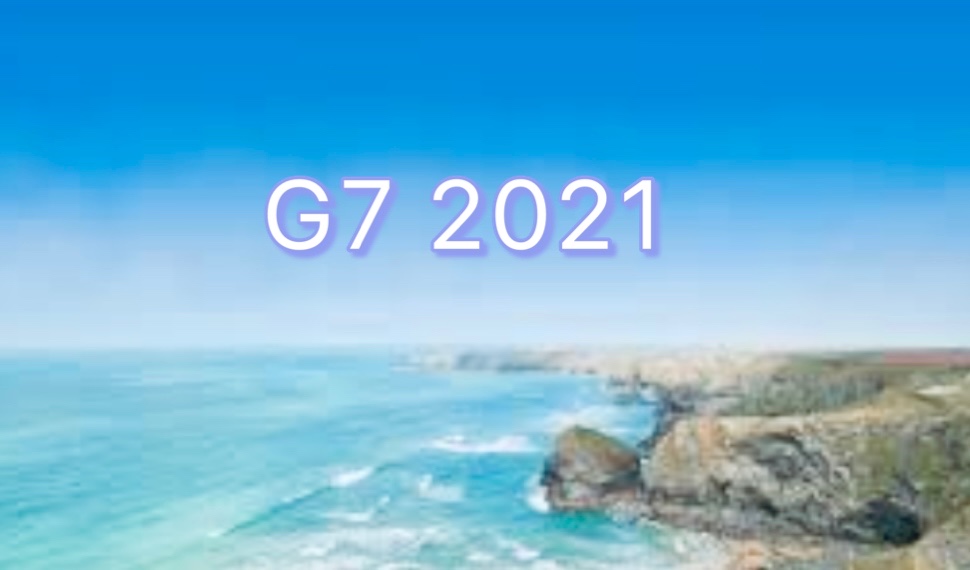
On 11-13 June 2021, the 47th G7 Summit was held in Cornwall in the UK, who holds the presidency of the G7 inter-governmental political forum.
The participants included not only heads of state and government of the G7 member states, but also representatives of the European Union. As the host, UK Prime Minister Boris Johnson also invited heads of government from India, South Korea, South Africa and Australia to participate.
This year’s agenda included global anti-pandemic plan, infrastructure project investment plan and global warming. Initiated by the US President Joe Biden, China was targeted during the Summit, resulting in China’s negative reaction to it, accusing the G7 group of “meddling, lies, and false accusations”.
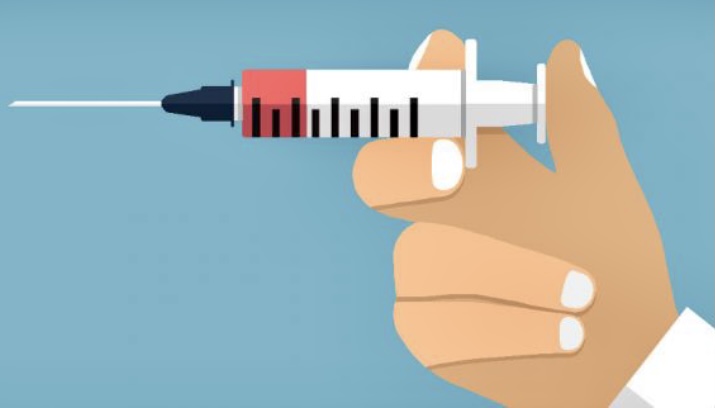
According to the vaccination data provided by the Our World in Data project at the University of Oxford, more than 1.19 billion vaccine doses have been administered worldwide, equal to 16 doses for every 100 people. New York Times points out that there is a stark gap between vaccination programs in different countries and between continents. Africa has the slowest vaccination rate of any continent. Less wealthy countries are relying on a vaccine-sharing arrangement called Covax, which aims to provide two billion doses by the end of the year. By now, 83% of shots gone into arms worldwide have been administered in high- and upper-middle-income countries. Only 0.3 percent of doses have been administered in low-income countries. (20210506)
——
By February 22, 2021, around 205 million doses of vaccine against the coronavirus (COVID-19) had been administered worldwide. With an average of 78.8 vaccinations per 100 inhabitants, Israel has been vaccinated the most so far. The Great Britain has reached around 27, the USA around 19, EU 6, and China 2.9.
The cumulative number of the confirmed COVID-19 infections is currently more than 18.3 million worldwide, with the related death toll reaching more than 2.4 million. The underlying coronavirus has now spread to more than 190 countries. The highest case numbers are currently reported from the United States (with half a million of the death toll) , Brazil, India and Russia. In Europe, the most corona infections have taken place in Italy, Spain, France, Germany and the United Kingdom. (de.statistika.com)
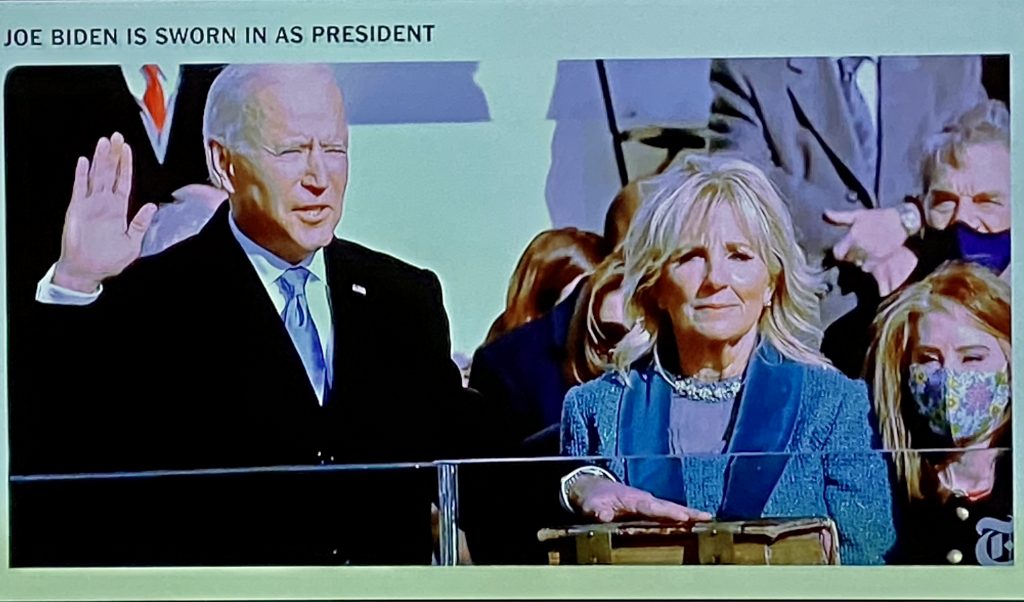
On January 20, 2021, Joe Biden was sworn in as the 46th president of the United States on the West Front of the US Capitol, and Kamala Harris as Vice President. The participation of the inaugural ceremony was restricted to a small number due to the coronavirus pandemic. The former US presidents including George W. Bush, Bill Clinton and Barack Obama attended the ceremony.
Biden’s 21-minute-long inauguration speech was described by the New York Times as a “direct rebuttal” in tone to Trump’s inaugural address. Biden called for an end to the “uncivil war” of political, demographic and ideological American cultures through a greater embrace of diversity. (20210121)
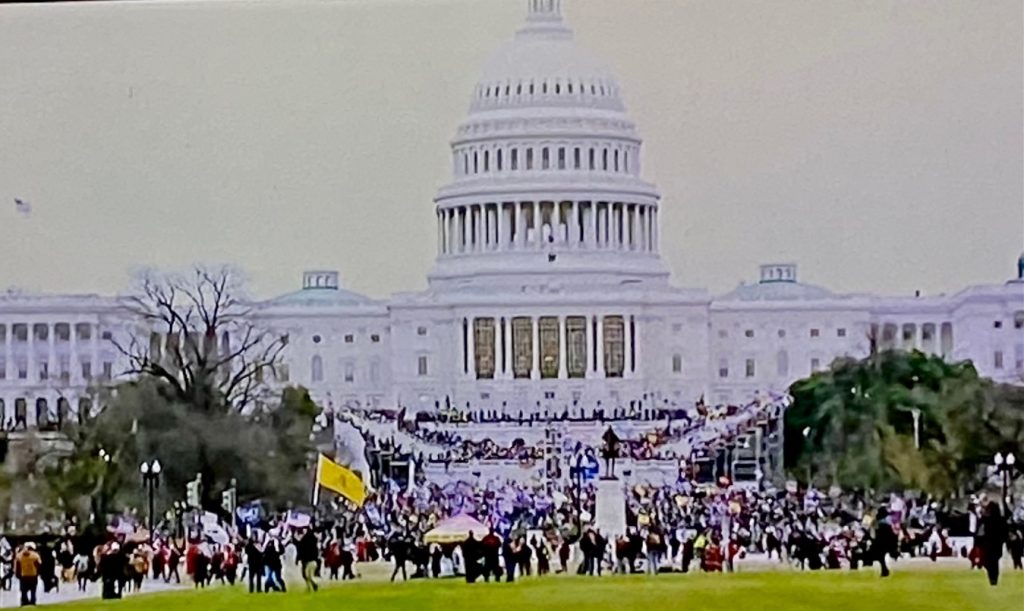
On Wednesday, the 6. January, crowds of Trump supporters stormed the symbol of democracy in America. The mob pushed into the US Capitol building with violence and caused alarming damage and debris. The deed was the first of its kind in the US history and caused five casualties, among them also a police officer.
The indecent storming of the Parliament was welcomed by the silence of Trump. Only under huge amount of criticism and pressure did he give a Video message on Thursday to condemn the riots and to call for an ‘orderly transition of power’. Meanwhile, the message he brought to the mob was that he understands them and loves them. (20210108)
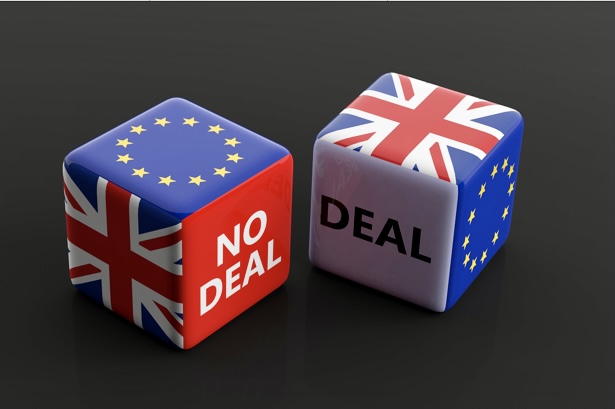
*On 24. December, the EU and the UK government finally reached an agreement, avoiding the consequences of a hard Brexit. Though the treaty must still be ratified by the 27 EU member states, the 4-year-long battle has probably come to an end.
The trade agreement is to regulate the economic relations between the island and the continent from January 2021. The most important point is to avoid tariffs and ensure that trade is as smooth as possible. The contract also includes fishing and cooperation on energy, transport, justice, police and many other topics.
British Prime Minister Boris Johnson made his statement on the success of the negotiations by saying that “We have taken back control of laws and our destiny.We have taken back control of every jot and tittle of our regulation…British laws will be made solely by the British Parliament. Interpreted by UK judges sitting in UK courts. And the jurisdiction of the European Court of Justice will come to an end.”
On the topic of fishing which brought a big controversy during the negotiations with the EU, he said “for the first time since 1973 we will be an independent coastal state with full control of our waters. With the UK’s share of fish in our waters rising substantially from roughly half today to closer to 2/3 in five and a half years’ time. After which there is no theoretical limit beyond those placed by science or conservation on the quantity of our own fish that we can fish in our waters.” He even declared the government help for the fishers “with a big £100m programme to modernise their fleets and the fish processing industry”.
The EU expressed relief and satisfaction for the time being, shared by quite a few EU member states. But what the deal turns out to be on the long run, is still a big question mark. (20201226)
*The EU and the UK government are seeking talks with each other as a last-minute effort to reach a post-Brexit trade deal between the two sides before the expiration of the transitional phase as of Dec. 31, 2020. As a matter of fact, the UK government is communicating about withdrawing 44, 45 and 47 of the UK internal market bill, and not including similar ones in another bill, contradicting the UK Withdrawal Agreement with the EU last year.
The most concerning passages are the ones about the Northern Ireland Protocol. The regulations of the open border between British Northern Ireland and the EU member Ireland could bring extremely precarious situations, the worst-case scenario being a resurgence of violence in the former civil war region. The protocol stipulates that after the end of the Brexit transition phase, Northern Ireland will de facto continue to follow the rules of the EU Customs Union and the EU internal market.However, this would require controls between Northern Ireland and the rest of the UK, which does not look rosy. (20201208)

*The transition after Joe Biden won the US election on November 3rd has not been smooth with Donald Trump refusing to acknowledge his defeat up to now, even though the latter directed his team on November 23rd to cooperate with the president-elect, giving Biden access to the government infrastructure previously denied to him.
Without providing any evidence, Trump and his campaign team have filed lawsuits against vote counting in the states of Pennsylvania, Georgia, Nevada, and Michigan. Judges in all four states dismissed the suits. OSCE election observers described the accusations as unfounded.
Today (December 8th) is the day when there should be certified election results from all states, followed by the electorate votes for the next president. The result will be announced in Congress on January 6th, legally securing the sworn-in of the next president. (20201208)
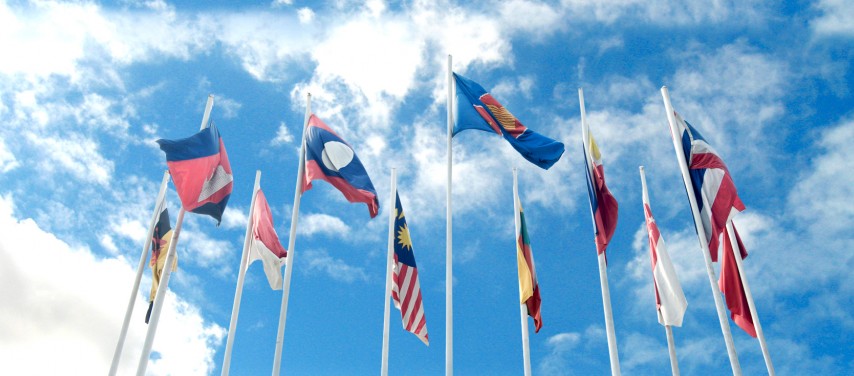
*On November 15. 2020 following the conclusion of the 4th RCEP Summit, ASEAN hit a historic milestone with the signing of RCEP. Leaders of ASEAN Member States, Australia, China, Japan, Republic of Korea and New Zealand witnessed the signing of the Regional Comprehensive Economic Partnership (RCEP) Agreement, according to the asean.org website.
The RCEP marks ASEAN’s biggest free trade pact to date, covering a market of 2.2 billion people with a combined size of US$26.2 trillion or 30% of the world’s GDP. “The signing of the RCEP Agreement is a historic event as it underpins ASEAN’s role in leading a multilateral trade agreement of this magnitude, despite global and regional challenges and eight years of negotiations,” said Dato Lim Jock Hoi, Secretary-General of ASEAN.
“RCEP will give a much-needed boost for a swift and robust recovery for businesses and peoples in our region particularly during the current COVID-19 pandemic crisis,” he added.
The deal will improve market access with tariffs and quotas eliminated in over 65% of goods traded and make business predictable with common rules of origin and transparent regulations, upon entry into force. This will encourage firms to invest more in the region, including building supply chains and services, and to generate jobs. The Agreement has 20 Chapters, 17 Annexes and 54 schedules of commitments covering market access, rules and disciplines, and economic and technical cooperation.
The Regional Comprehensive Economic Partnership (RCEP) Agreement is an agreement to broaden and deepen ASEAN’s engagement with Australia, China, Japan, Korea and New Zealand. Together, these RCEP participating countries account for about 30% of the global GDP and 30% of the world population. The objective of the RCEP Agreement is to establish a modern, comprehensive, high-quality, and mutually beneficial economic partnership that will facilitate the expansion of regional trade and investment and contribute to global economic growth and development. Accordingly, it will bring about market and employment opportunities to businesses and people in the region. The RCEP Agreement will work alongside and support an open, inclusive, and rules-based multilateral trading system. (Source: asean.org)

*The COVID-19 pandemic is affecting 209 countries and territories around the world as well as 2 international conveyances now. As of the evening of 8. April, 2020, the active coronavirus cases are 1,501,061, the death tolls 87,830, the recovered 319,214. The numbers are changing every minute.
To stop the spread of the virus, many countries across the world have been implementing tough measures such as closing shops and restaurants, asking for self-quarantine and social distancing, ect.. While the negative effects of lockdowns are visible, halting the global supply chains, destroying the travel industry and hitting the stock markets drastically, the European Space Agency has registered an impressive fall in pollution across the European skies. (20200408)
*The deadly COVID-19 cases around the world are soaring upward, raising big concerns worldwide. As of 2. March, 2020, around 89,869 cases of the virus have been reported inside and outside of mainland China, with 3,069 deaths. The number of deaths outside mainland China has also increased, including 66 in Iran, 26 in South Korea, 6 in Japan and 41 in Italy. Austria has a confirmed number of 16 as of today.
The outbreak has not yet reached the level of pandemic, WHO’s Director-General Tedros Adhanom Ghebreyesus said at the end of February. A pandemic is an epidemic that spreads over several countries or continents, which is as a matter of fact already the case with COVID-19. (20200302)
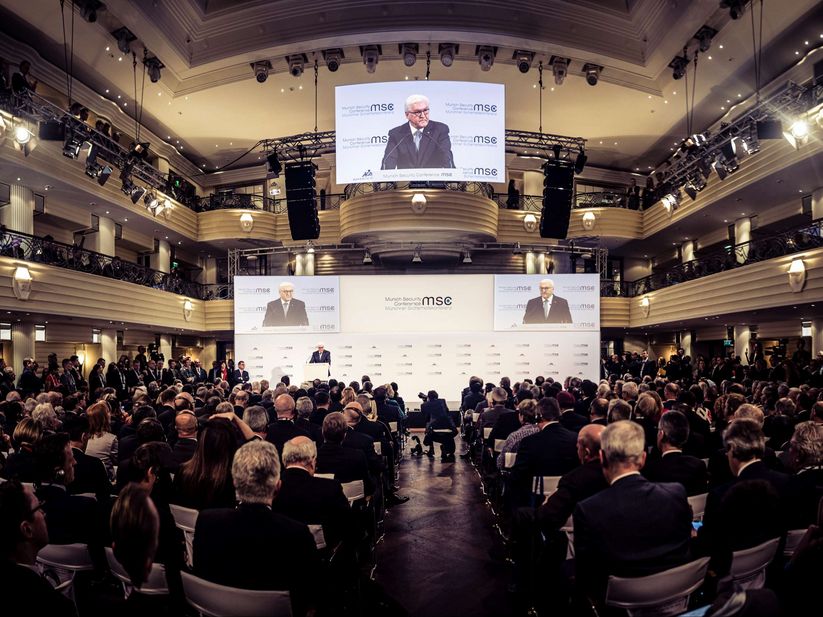
*The 56th Munich Security Conference took place from February 14 to 16, 2020 in the Hotel Bayerischer Hof in Munich. This year the conference was again the center of international diplomacy and welcomed leading figures from politics, science and civil society, including more than 30 heads of state and government as well as almost 100 ministers.
The main topic of this year’s conference was to do with a feeling of increasing “Westlessness”. The term coined by the Munich Security Report 2020 describes a West that is divided on the inside and driven by illiberal forces, and that is increasingly losing its global political aspirations. The term has become the subject of controversial debates. The transatlantic partners in particular were clearly divided among the state of the West and the extent of its crisis (represented respectively for instance by the USSecretary of State Mike Pompeo and the French President Emmanuel Macron for instance). Besides, China’s perception of threats was significantly more pronounced among the US representatives than among the Europeans.
Concern about nationalist developments moved a large number of conference participants. Growing nationalism is increasingly preventing the international community from standing together in the face of pressing challenges. The conference also focused on climate change. The “defining issue of our time”, as Canada’s Prime Minister Justin Trudeau put it.
MSC Roundtables during the conference also mentioned topics ranging from the role of women in peace and security to updates on the situation in Palestine and the new coronavirus in China. (20200218)
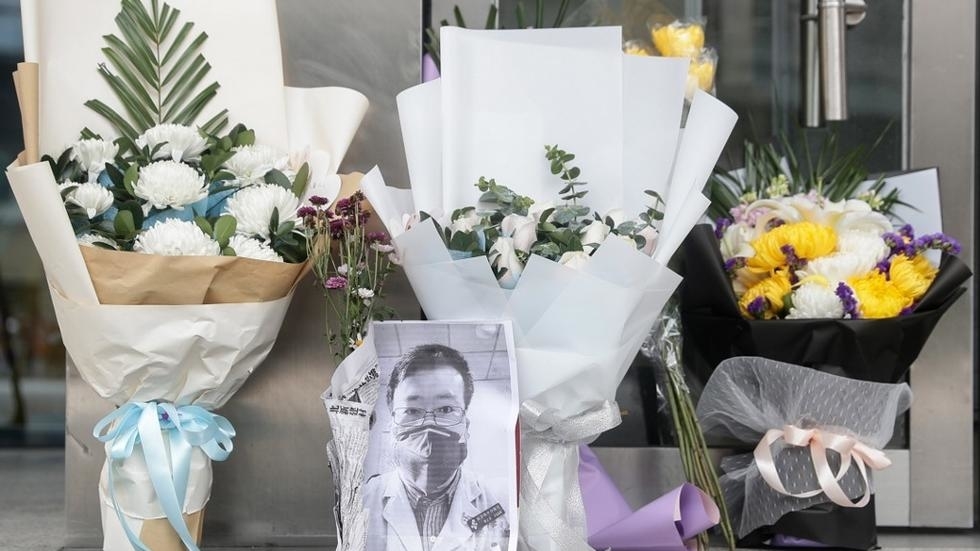
*In China, the 34-year-old whistleblower Dr. Li Wenliang died of the 2019-nCoV. His death on 6. of February has fueled anger and large-scaled criticism of how the authorities dealt with the epidemic. The police in Wuhan tried to silence him after he warned his colleagues about the new SARS-like virus in late December. Li is recognized as a hero in the Chinese people’s heart.
The Chinese anti-corruption agency announced extensive investigations into Li’s case. Ministry of Foreign Affairs and National Health Commission published grief messages.
Dr. Li is now one of the more than 630 fatalities. According to the WHO, virus protection equipment is becoming scarce due to the epidemic with more than 31,100 detected infections. There are more than 240 other confirmed infections in around two dozen countries, too. On Wednesday, 5. February, the WHO announced the delivery of respiratory masks, rubber gloves, protective suits and test sets to countries in need with the help of 613 million euros from the international community. (20200207)
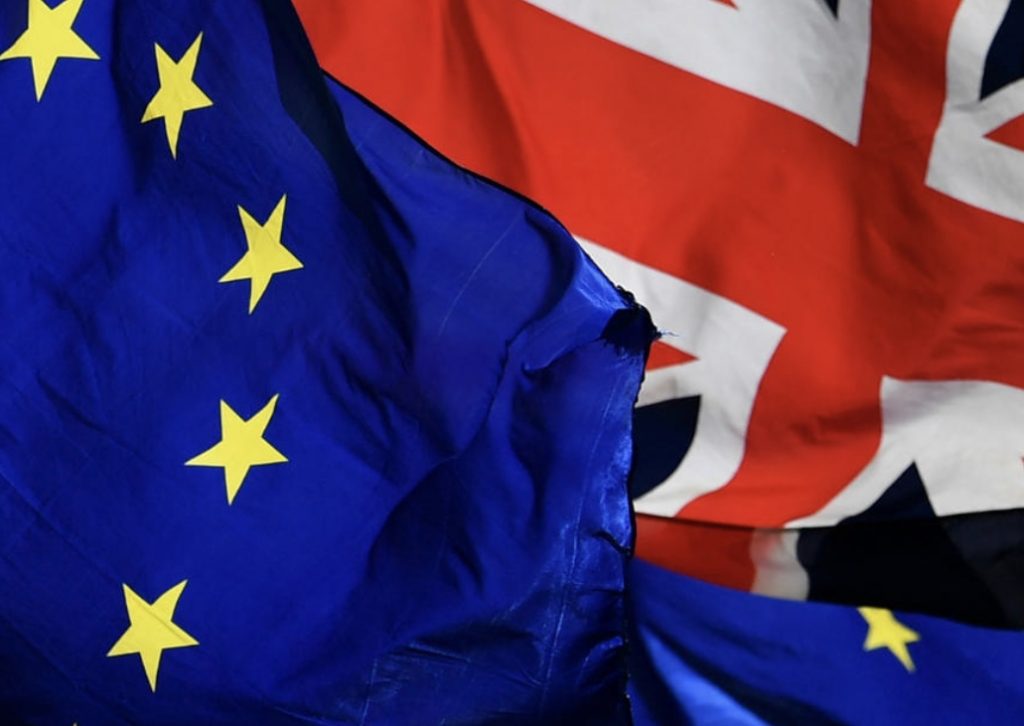
*The end of January, 2020 saw the final exit of Britain out of the EU. Even if there is still a whole year as the transition period, the British Prime Minister Boris Johnson has already made it clear that Britain won’t be contractually committed to compliance with EU standards. Johnson emphasizes that he is striving for a “pragmatic” trade agreement with the European Union. It is not necessary for the United Kingdom to adopt EU rules on competition, government subsidies, social protection or the environment, Johnson said in the passages of his speech released by the British government on 2.February.
In return for a free trade agreement, Brussels insists on level playing field. The formula is zero tariffs, zero quotas, zero dumping. EU Commission President Ursula von der Leyen stressed on the importance of the EU market as the largest single market in the world. Nothing is free, she said, and the EU must protect the interests of its citizens as well as its companies. (20200204)
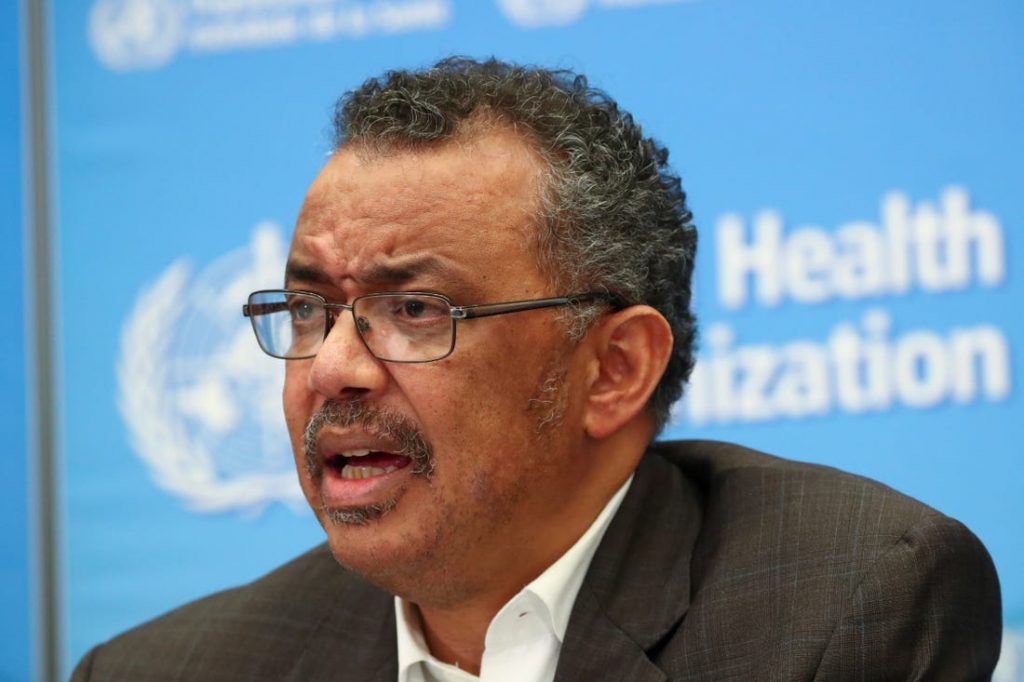
*The World Health Organization declared coronavirus a public health emergency of international concern at a news conference Thursday in Geneva.
This is only the sixth time such an emergency has been declared, with past examples including the Ebola outbreak in the Democratic Republic of Congo and the Zika virus.
The WHO deliberated for two days last week before deciding not to declare an emergency. Since then, however, patients from Germany, Japan, Taiwan, Vietnam and the U.S. have been diagnosed with the new coronavirus without having visited China. The new coronavirus is in the same family of viruses as the common cold and SARS.
At last count, more than 7,700 people have been sickened by the novel coronavirus and 170 have died from it. More than 90% percent of those cases, and every death, have been in China. According to WHO, 20% of cases are considered to be severe and 2% have been fatal. It’s expected that the fatality rate of the new coronavirus will decrease as more cases are reported, since the sickest individuals tend to seek medical treatment first.
Airlines around the world have suspended some routes to China — United, Delta, American Airlines, British Airways, Air Seoul, Lion Air, Lufthansa Group, Cathay Pacific, Finnair, Air Asia, Air India, Air Canada, All Nippon Airways, Asiana Airlines and Korean Air. (Source: ABC News 20200130)

*As of 29. January, 2020, a total of 6072 confirmed cases with Novel Coronavirus have been announced worldwide. 5994 of all confirmed cases have been reported in China, including the 132 deaths reported to this date.
The countries and territories currently affected are China (including Hong Kong, Macau and Taiwan), Thailand, Japan, South Korea, the United States, Vietnam, Singapore, Australia, Malaysia, Canada, Nepal, Sri Lanka, Cambodia, the United Arab Emirates, France and Germany. Eight confirmed cases have been reported in Europe, four in France and four in Germany. So far, most of the imported cases have had direct travel to affected regions in China.
On December 31, 2019, 27 cases of pneumonia with an initially unknown cause were reported by Chinese health authorities. The majority of the people affected were found to have previously been to a fish market selling fish and other animals in the Chinese metropolis of Wuhan (visit or work). The market was then closed and disinfected on January 1, 2020.
In the course of the investigations, various pathogens of infectious diseases with similar symptoms could initially be excluded, including Influenza, SARS and MERS. According to the WHO, the sickness is caused by a new type of coronavirus, which was identified in China on January 7. The possibility of transmission from person to person has been proven. A precise clarification of the transmission mode is still ongoing. In addition, the WHO states that so far most patients involved have had a mild course. More severe courses occur by around 20%. The most common initial symptoms are fever, cough and difficulty breathing.
After a crisis meeting of the WHO on January 23, 2020, no health emergency of international scope was declared until further notice. But Lufthansa Group will cancel all flights to and from China from January 30 to February 9. Hong Kong will continue to be served as planned.
Lufthansa, Europe’s largest airline with its subsidiaries Swiss and Austrian Airlines, is the second European airline to stop all flights to and from China after British Airways. Companies, universities, sports associations and travellers also avoid the country of origin of the Novel Coronavirus.
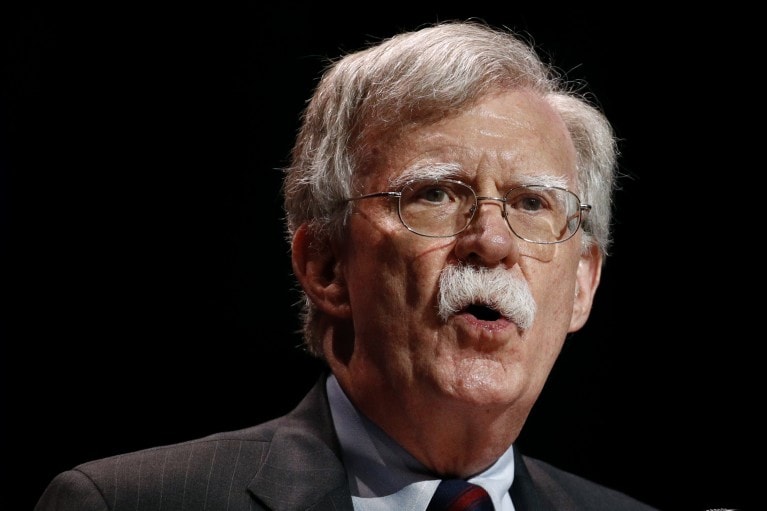
*Against the backdrop of new allegations in the Ukraine affair, US President Donald Trump has attacked his former National Security Advisor John Bolton. The latter in his soon-to-be- published new book “The Room Where It Happened” states that there has been a lot of circumstantial evidence that Trump was pressuring Ukraine to agree to investigate the Bidens when he blocked $391 million in military aid to the country.
The impeachment of Donald Trump, the 45th president of the United States, occurred on December 18, 2019, when the House of Representatives approved articles of impeachment on charges of abuse of power and obstruction of Congress. Trump is said to have misused the power of his office. For personal reasons, his team has put Ukraine under pressure to announce investigations into the son of his democratic rival Joe Biden. A whistleblower from the secret service started the affair.
The Democrats consider themselves encouraged to summon Bolton as a witness in the impeachment process. The Senate, in which Trumps Republicans have a majority, could vote on this later this week. (20200129)
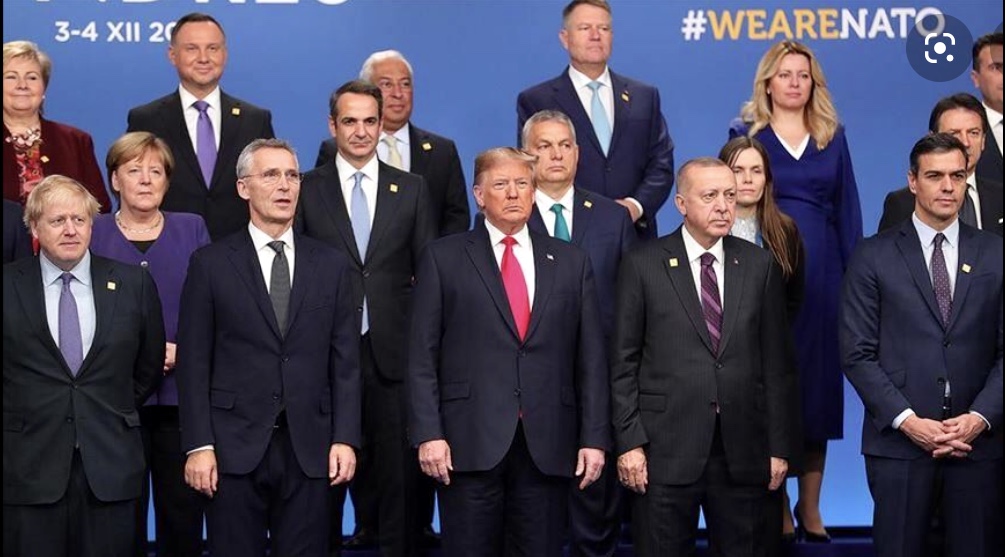
*On 3. and 4. December, leaders from 29 NATO (North Atlantic Treaty Organisation) member states gathered in a luxurious hotel north of London for a summit marking 70 years of the alliance.
Though there have been discussions on if the concept of NATO is still of a necessity, the NATO Secretary General Jens Stoltenberg said at the summit that “NATO remains the only platform where North America and Europe discuss, decide, and take actions together every day to protect almost 1 billion people,” adding the notion of „all for one, one for all” later on.
German chancellor Merkel and the US President Donald Trump expressed their satisfaction to this summit. “A very successful meeting“, said Merkel. Trump is but not happy with the Germany’s NATO budget. He demands that all NATO members – as agreed – spend at least two percent of the defense’s economic output by 2024. Germany reaches 1.38 percent in 2019. The goal of the Federal Government is to achieve 1.5 percent by 2024.
The quarrel during the summit was mainly between the French President Emmanuel Macron and the US President Trump on the issue of Turkish army in the Kurdish region in Northern Syria. Macron blamed the Alliance with the lack of coordination between the US and Turkey on the one hand, and the Europeans on the other, saying it was “brain dead”.
Turkish President Recep Tayyip Erdogan was surprisingly conciliatory at the meeting, though, promising that Ankara would support the plan to strengthen the Baltic countries. About the Russian missile defense system S-400 eyed by Turkey, NATO Secretary General Jens Stoltenberg stressed that the system cannot be integrated into the NATO defense architecture.
For the first time, the emerging military power China is mentioned as a non-current, but possible new threat (London Declaration). This was important to US President Donald Trump with regard to the expansion of 5G mobile networks. He warned against security risks and dangers, which is why in the US Huawei is not used. But the alliance partners are not prohibiting Huawei, based on the safe and resilient systems in the 5G communication, as NATO Secretary General Jens Stoltenberg said in conclusion. (20191204)
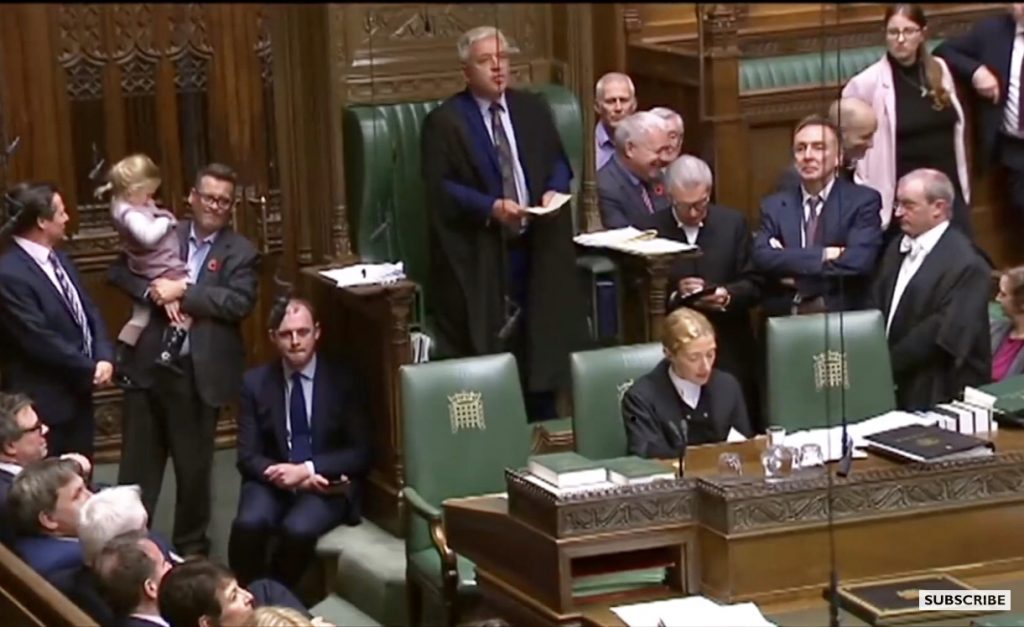
*According to BBC News, the House of Commons in the UK approved legislation by a margin of 438 votes to 20, paving the way for the first December election since 1923. The bill is still to be approved by the Lords but could become law by the end of the week. If that happens, there will be a five-week campaign up to polling day.
The UK prime minister Boris Johnson has said the public must be “given a choice” over the future of Brexit and the country, hoping that the election will give him a fresh mandate for his Brexit deal and break the current Parliamentary deadlock, which has led to the UK’s exit being further delayed to 31 January.
The PM said it was time for the country to “come together to get Brexit done”, as he left a meeting of the 1922 Committee of backbench Conservatives held minutes after the vote. (20191029)
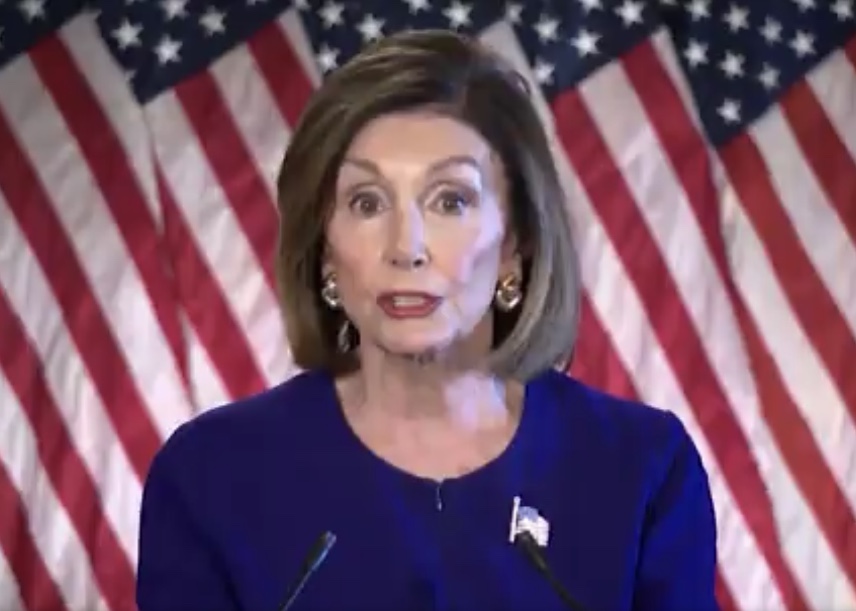
*President Donald is facing impeachment proceedings due to the abuse of power after the release of a White House phone transcript and a whistleblower complaint indicating that Trump pressured the new Ukrainian president to interfere in the 2020 election by investigating Democratic candidate and former Vice President Joe Biden. The White House tried to cover up records of the troubling phone call between the two leaders.
Efforts to impeach Donald Trump have been made by various people and groups who assert that President Donald Trump has engaged in impeachable activity during his presidency. Talk of impeachment began even before Trump took office.
The House speaker, Nancy Pelosi, is said to be hoping for a quicker resolution to the impeachment inquiry. Yet various scenarios might still come around in the following months to challenge the resolution. (20190928)
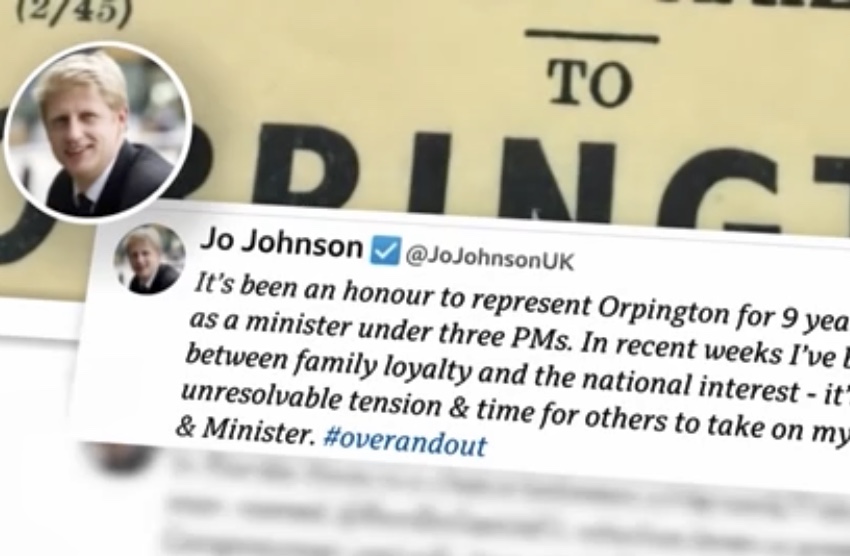
*The British House of Lords is expected to pass a law against Britain’s no-deal exit from the EU tomorrow, Friday 6. September. If the Lords make changes to the bill, Prime Minister Boris Johnson would have to go back to the House of Commons on Monday (9. Sept.) before the bill can be submitted to Queen Elizabeth II for signature.
The bill had passed all three readings in the lower house on Wednesday (4. Sept.) against the will of the Prime Minister, who requested for new elections in Parliament on 15 October. It stipulates that the Prime Minister must submit an application for a three-month extension of the Brexit deadline, which falls on 31 October, should no EU exit agreement be ratified by 19 October.
As if the mess is not enough, another drawback happened today for Boris Johnson: His brother Jo Johnson resigned as a Tory MP and Minister of State. Jo Johnson tweeted that he is “torn between family loyalty and the national interest – it’s an irresolvable tension.” (20190905)
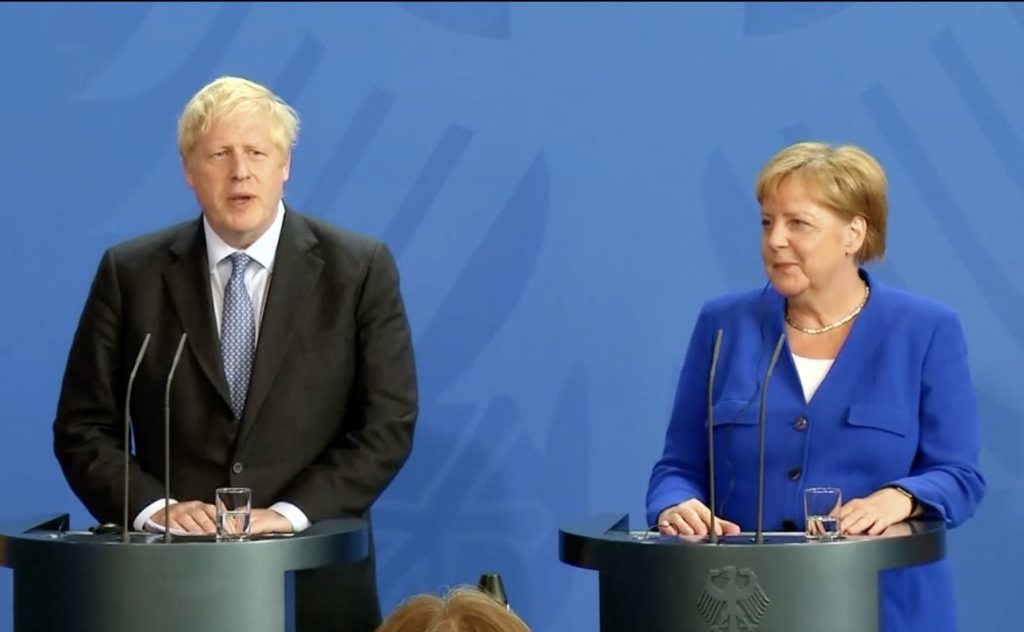
*The new British Prime Minister Boris Johnson visited Berlin and Paris on Wednesday, 21. and Thursday, 22. August, meeting German Chancellor Angela and French President Emmanuel Macron respectively on the issue of Brexit.
At the heart of the issue is what is known as the Irish “backstop” in order to maintain the single EU market. The backstop, opposed by Mr. Johnson, aims to prevent a hard border on the island of Ireland after Brexit. If implemented, the backstop would see Northern Ireland staying aligned to some rules of the EU single market, should the UK and the EU not agree a trade deal after Brexit. This would mean that the UK would “stay” in a single customs territory with the EU, aligning with current and future EU rules on competition and state aid.
Though politically and emotionally inclined towards the British, saying to Johnson such words as “”it was said we will probably find a solution in two years. But we could also find one in the next 30 days. Why not?” Angela Merkel is likely to give a rebuttal to Boris Johnson concerning the issue. After all, in the eyes of the politicians and officials in Berlin, Johnson’s inelegant letter to Donald Tusk a couple of days before his visit to Germany asking the EU to drop the Irish backstop didn’t contain any constructive proposals for further negotiations.
French President Emmanuel Macron praised the long history of friendship between France and Britain, which, he said, goes beyond EU issues. But coming back to reality, Macron stressed that the Ireland-Northern Ireland backstop plan was “indispensable” to preserving political stability and the single market.
UK Prime Minister Mr Johnson insists the backstop must be ditched if a no-deal exit from the EU on 31 October is to be avoided. The EU has repeatedly said the withdrawal deal negotiated by former PM Theresa May, which includes the backstop, cannot be renegotiated.
Not to exaggerate, a no-deal Brexit is even more credible after Johnson’s trips to Germany and France. What’s behind his self-confident attitude and high-pitched words has yet to reveal. Maybe the upcoming G7 summit in France this weekend is going to offer the world a chance to understand more of his statesmanship. (20190823)

*The United Nations Convention on International Settlement Agreements Resulting from Mediation (the “Singapore Convention on Mediation”) opened for signature in Singapore today, 7 August 2019.
46 States signed the United Nations Convention on International Settlement Agreements Resulting from Mediation (New York, 2018) at today’s ceremony, including Afghanistan (Islamic Republic of), Belarus, Benin, Brunei Darussalam, Chile, P.R.China, Colombia, Congo, Democratic Republic of Congo (the), Eswatini (Kingdom of), Fiji, Georgia, Grenada, Haiti, Honduras, India, Iran (Islamic Republic of), Israel, Jamaica, Jordan (Hashemite Kingdom of), Kazakhstan, Laos (Peoples Democratic Republic of), Malaysia, Maldives, Mauritius, Montenegro, Nigeria, North Macedonia, Palau, Paraguay, the Philippines, Qatar, Republic of Korea, Samoa, Saudi Arabia (Kingdom of), Serbia, Sierra Leone, Singapore, Sri Lanka (Democratic Socialist Republic of), Timor-Leste (Democratic Republic of), Turkey, Uganda, Ukraine, United States of America, Uruguay, Venezuela (Bolivarian Republic of). The ceremony was attended by delegations from more than 70 States.
This marks the first occasion that a multilateral convention prepared under the auspices of the United Nations is named after Singapore. To commemorate this event, Singapore put together a comprehensive programme and organized related events to celebrate the opening for signature (www.singaporeconvention.org/). Formal opening addresses were given by Lee Hsien Loong (Prime Minister of Singapore), Antonio Guterres (Secretary-General of the United Nations, by video), and Stephen Mathias (Assistant Secretary-General for Legal Affairs for the United Nations).
The Convention is a landmark instrument, prepared by the United Nations Commission on International Trade Law (UNCITRAL), and adopted in December last year by the UN General Assembly. By providing for the first time a cross-border enforcement mechanism for settlement agreements that result from mediation, the Convention brings certainty and stability to the international framework on mediation, thereby promoting more prosperous, stable and sustainable international trade relationships among States and regions. The Convention will undoubtedly enhance the use of mediation and will therefore foster access to justice.
The Singapore Convention on Mediation is complemented by the UNCITRAL Model Law on International Commercial Mediation and International Settlement Agreements resulting from Mediation (2018), which was developed by UNCITRAL in parallel to the Singapore Convention. This provides States with the flexibility in implementing the cross-border enforcement mechanism and achieving a comprehensive legal framework on mediation.
During the signing ceremony, a memorandum of understanding was signed between the United Nations and the Government of Singapore for collaborating in promoting international mediation and other dispute settlement methods as well as in supporting the harmonized use of the Singapore Convention and other UNCITRAL instruments. (20190807 UNIS)
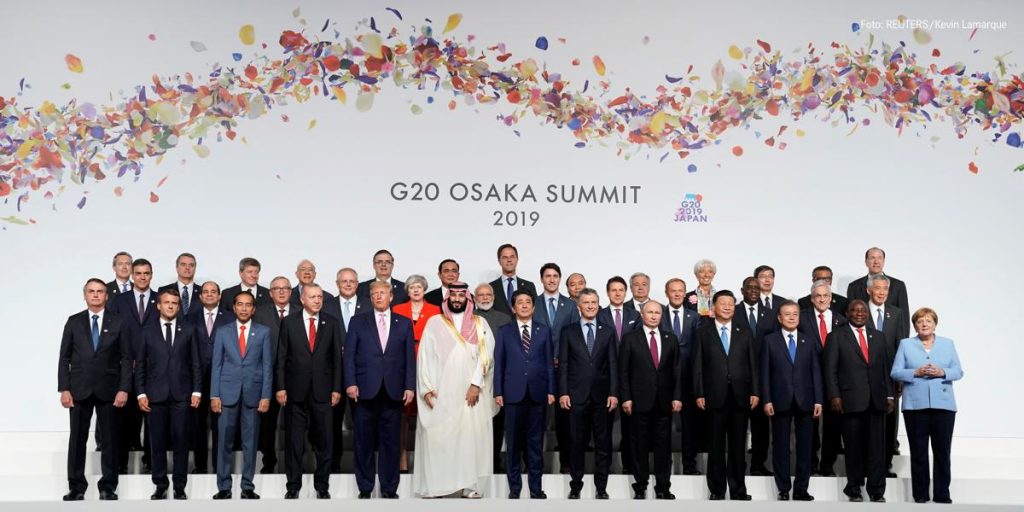
*G20 Summit in Osaka from 28-29 of June reached an agreement on climate change, a deal similar to the one signed in Argentina in 2018. Not regarding the negative attitude of the Trump administration, this is observed as a triumph of the summit. Other issues such as finance, immigration, women’s rights, health insurance and support of the developing countries were discussed at the summit, many of which remain status quo.
Criticising the immigration policy of German Chancellor Merkel and praising that of Trump’s towards Mexico, Putin stressed on his image of being a tough leader of Russia at the summit by saying “Liberals cannot simply dictate anything to anyone just like they have been attempting to do over the recent decades.”
As for Sino-US relationship, the summit turned out to be showing some positive signs. US President Donald Trump and China’s President Xi Jinping reached agreement at the summit. US companies would be allowed to continue to sell to the Chinese tech giant Huawei. And after the meeting on the sidelines of the main G20 summit in Osaka, Trump confirmed that the US would not add tariffs on another $300bn worth of Chinese imports. (20190630)
*The G20 summit 2019 has begun in Osaka today. The heads of state and government of the major industrialized as well as the emerging countries will take the chance to discuss issues including the global trade issues, digitization and climate protection.
The summit is held under growing political tensions and weakening global economy. While Japan’s Prime Minister Shinzo Abe called the summit attendees to compromise (“We should look for similarities instead of highlighting our differences,” ), the US President Donald Trump made a strike against G20 partner countries when arriving in Osaka, criticizing Japan for military weakness, Germany for under-funding, China for its trade practices, and India for over-taxing. But he changed his tone later by calling the German Chancellor Angela Merkel a “great friend” and “fantastic woman”.
According to the German government spokesman Steffen Seibert, the focus of the bilateral talks with the US will concentrate on developments in Libya and the Sahel, the situation in eastern Ukraine, the US conflict with Iran and transatlantic trade. The relationship between Germany and the United States has been tense since Trump took office, partly because of the large German trade surplus. But Merkel emphasized at the meeting with Trump that the German economy also invested heavily in the United States.
It is expected that she meet Chinese President Xi Jinping, Turkish President Recep Tayyip Erdogan and Russian President Vladimir Putin in Osaka. Putin sharply criticized Merkel’s refugee policy before the summit began, while praising Trump as a talented person.
Merkel is still a key person to present the EU image. In the eyes of many, unfortunately, EU Commission President Juncker is a “Lame Duck” at the summit. The leftists in Europe strongly calls for united efforts and determined action to tackle the problems with the aggressive global trade wars and the Paris Climate Agreement, very often in vain, though. (20190628)
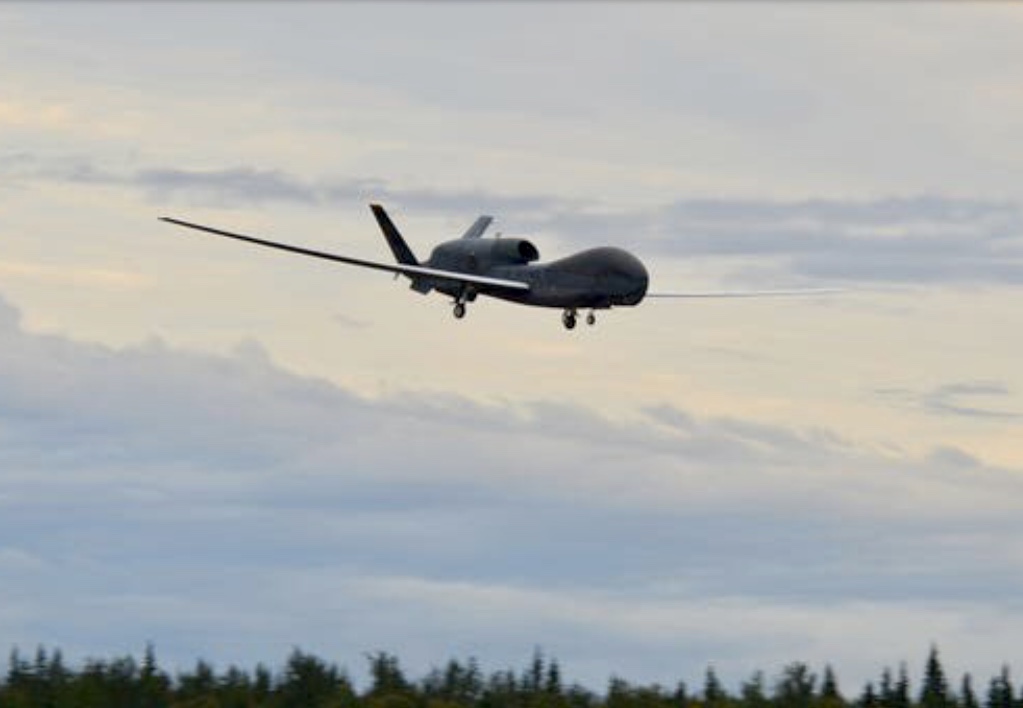
*The shadow of war is hanging in the mid air after Iran fired down an American surveillance drone last Thursday, 20. June, 2019, claiming that it entered Iranian airspace. The US said the launch was in international airspace. US President Donald Trump abortedan attack in retaliation to avoid casualties when the fighter jets F35 were already on the way to the targets in Iran.
Meanwhile, the commander of the Iranian Navy has threatened the US with further drone killings. According to the semi-official Tasnim news agency, Rear Admiral Hossein Chansadi said Iran’s armed forces have the capacity. Iran will always give a “devastating answer … and the enemy knows that”.
There is a presumption that Iran used the military radar system offered by China in detecting the US military drone. Last Friday, the Chinese government warned its citizens in Iran to take extra safety precautions and repeated its earlier warnings against opening a “Pandora’s box”. Beijing also restated commitment to Iran nuclear deal.
The EU plus China will open talks again about Iran situations this Friday, 28. June in Vienna. In case the talk should fail to reach any agreement, Iran might begin to stockpile more enriched Uranium than allowed by a 2015 accord. (20190624)
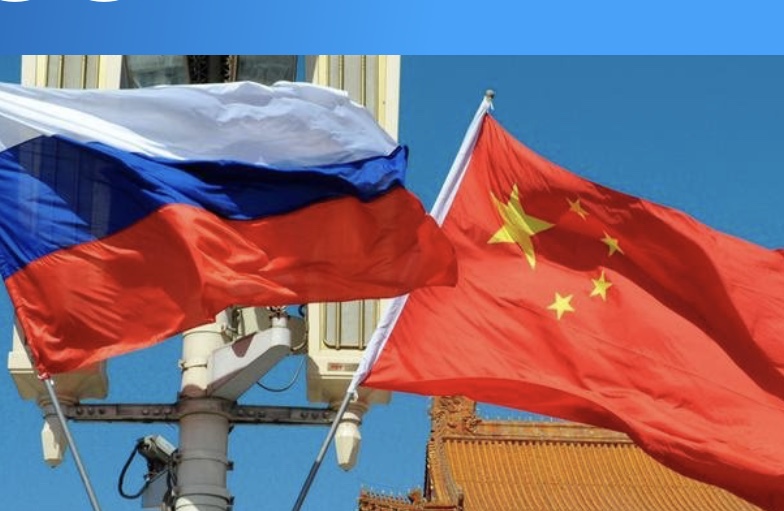
*President Xi Jinping of China arrived in Moscow on Wednesday, 5. June, at the start of a high-profile three-day state visit that will include some panda diplomacy and underscore the strengthening Beijing-Moscow axis at a time when relations for both with Washington continue to fray.
The Kremlin released figures showing that trade between Russia and China grew almost 25 percent last year, reaching $108 billion — finally breaking the $100 billion milestone sought for years, even if partly based on higher oil prices.
After a day in Moscow, where Mr. Xi will present two pandas on loan to the Moscow Zoo, the Chinese president is scheduled to be the guest of honor at the St. Petersburg International Economic Forum, Russia’s main annual event to attract international investors. (Source: nytimes20190605)
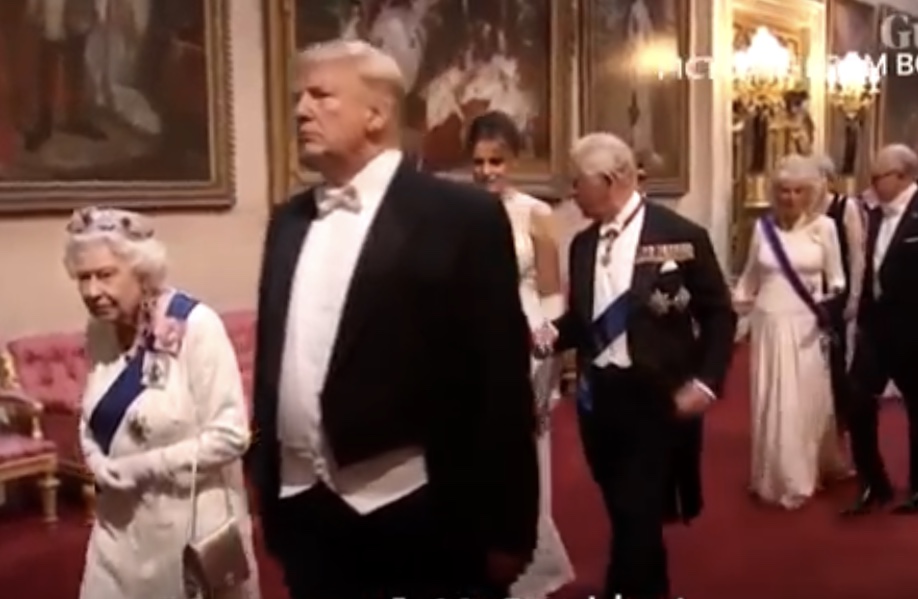
*On June 3, local time, the US President D. Trump took the “Air Force One” plane to the airport near London, England, before being transferred to the “Navy No. 1” helicopter to land directly on the lawn of Buckingham Palace, officially opened his three-day state affairs.
The Queen, together with Prince Charles, accompanied him in reviewing the guards , having lunch, visiting the Buckingham Palace collection, and going to the Prince Charles residence to have afternoon tea. After the formal state banquet dinner, Trump returned to the US Embassy official residence for overnight.
On the second day of Trump’s visit, he focused on “politics”, having breakfast with the stepping-down British Prime Minister Teresa May and the business people from both countries before going to Downing Street for a talk with May. On the third day, Trump and the Queen attended the 75th anniversary of the Normandy landing (D-Day).
After his visit to the UK, Trump is heading for Ireland and France.
Trump’s state visit to Britain should have been an important opportunity to show the firm friendship between the two countries and to commemorate the sacrifice of the two countries in Normandy. However, the two sides of the Atlantic seem to have no confidence in Trump. Differences in NATO defense issues and climate change issues remain.
Trump “sinned” the British royal family and British politicians before the visit, which made his trip there unusually “ironic”. Specifically, Trump had previously said in the interview that Princess Megan of the United Kingdom was “nasty”, and London Mayor Sadiq Khan „stone cold loser“. He intervened in the British internal affairs by praising one of the British Prime Minister’s candidates Boris Johnson as the “best choice”. About Brexit, he told the country to go for no deal Brexit and to refuse to pay 39 billion pounds of breaking-up fees. (20190605)
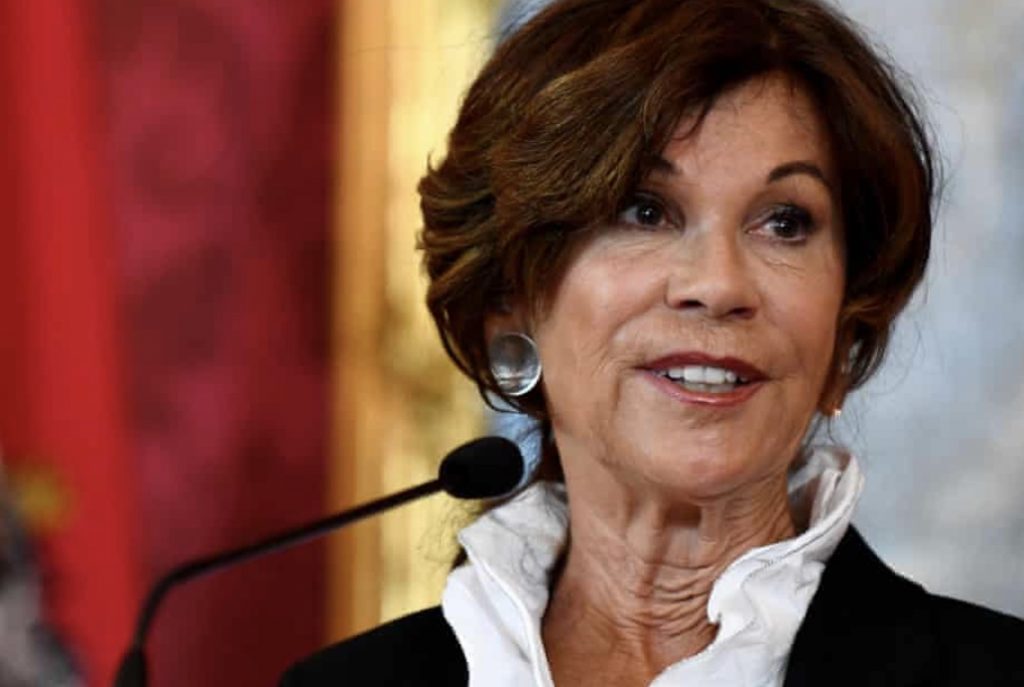
*After the scandalous “Ibiza video” which resulted in the government crisis, the parties in Austria have agreed on Brigitte Bierlein as transitional chancellor for the coming months. The Austrian President Alexander Van der Bellen declared it on 30 May in Vienna.
On 27 May, the entire government in Austria had been deposed by Sebastian Kurz vote of no confidence. The transitional government will remain in office until the new election in September and during the subsequent coalition negotiations.
The dismissal of the government was the temporary climax of the government crisis triggered by the scandal video from Ibiza. The photographs of 2017 published by “Spiegel” and “Süddeutscher Zeitung” in Germany on 17 May showed former FPÖ leader Heinz-Christian Strache talking to an alleged Russian oligarchs niece. Among other things, he promises government contracts for campaign assistance in favor of the FPÖ and speculates on the beneficial consequences of the investor buying into the popular “Kronen-Zeitung”. (20190530)
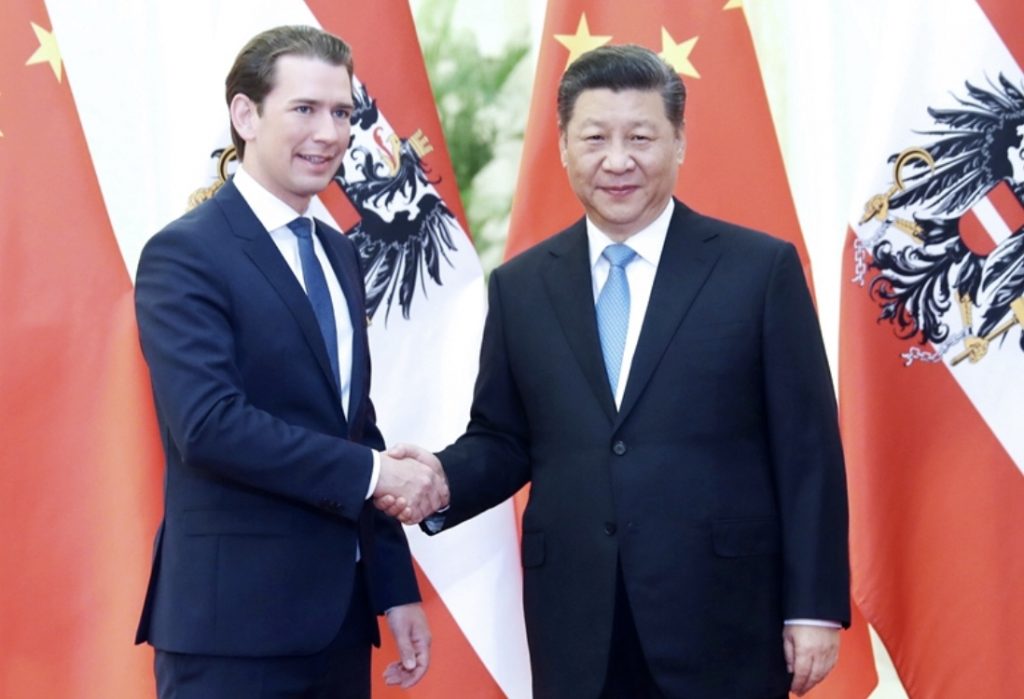
*On 29. April, Austrian Prime Minister Sebastian Kurz finished his 5-day visit in China. During his trip, Kurz visited Shanghai, Hangzhou and Beijing, participated in the Beijing Belt and Road Summit, and met with Chinese Premier Li Keqiang and President Xi Jinping.
Kurz’s trip brought a lot of good news to Austria, e.g. in tourism (by 2025, Austria plans to double the number of Chinese tourists there). The two countries will strengthen the aviation business (from June this year on, passengers will be able to fly directly to Vienna from four Chinese cities). And by 2025, the trade volume between the two countries is aimed at a significant increase (to increase from the current 13 billion Euros to 20 billion Euros). Kurz mentioned the human rights situation in China. Li Keqiang responded that China’s focus for now is still how to get rid of poverty, not human rights.
Kurz and Xi Jinping talked about the relations between EU-China as well as US-China. The new Silk Road project was also an emphasis. Kurz said that China is becoming the world’s number one economic power, showing more and more confidence. Strengthening partnership with China, therefore, will benefit Austria. He demanded “to treat China with a pragmatic attitude”. „Austria is valued by China“, he said, „Austria is very satisfied with the way it is valued in China”.
Kurz visited China three times in 12 months which is considered a very positive signal. The Austrian side highly appraised China’s further reform and opening up measures announced by President Xi Jinping, and is willing to expand the scale of bilateral trade and humanities exchanges, and to strengthen the third-party market cooperation. Firmly supporting multilateralism and trade liberalization, Austria expressed its willingness to contribute to the deepening of EU-China relations. (20190430)
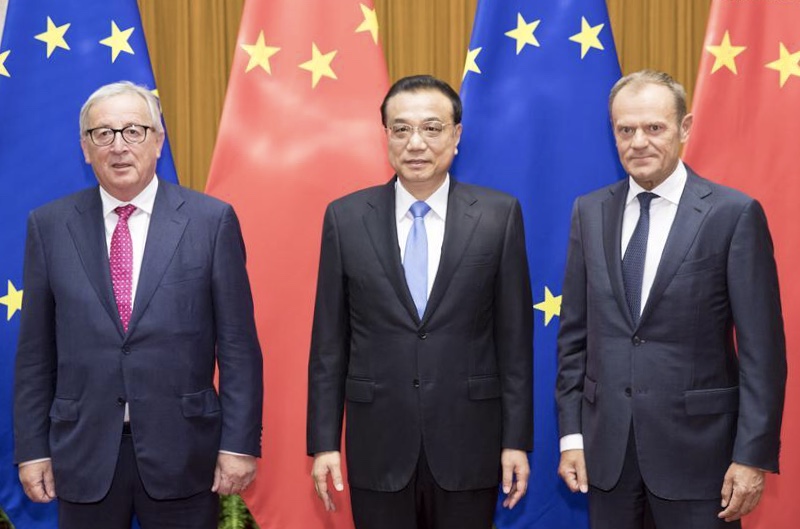
*The 21st EU-China Summit took place on 9 April in Brussels, providing a forum for engagement at the highest level and for advancing the relationship as regards the bilateral and multilateral agendas.
President of the European Commission Jean-Claude Juncker and President of the European Council Donald Tusk represented the European Union at the Summit. The People’s Republic of China was represented by Premier Li Keqiang. The EU High Representative for Foreign Affairs and Security Policy/Vice-President of the European Commission, Federica Mogherini, and European Commission Vice-President for Jobs, Growth, Investment and Competitiveness, Jyrki Katainen, also attended the Summit.
While China’s economic and political influence makes it a vital partner for the European Union, as well as vice-versa, there is a growing appreciation in Europe that the balance of challenges and opportunities presented by China has shifted.
In line with last month’s Joint Communication on China and the discussion among EU leaders at the March European Council discussion, the EU pursues a realistic and multi-faceted approach with a view to ensuring fair, balanced and mutually-beneficial relations. The EU will work for a more balanced economic relationship with China while at the same time pursue deeper engagement on global and multilateral issues, including reform of the World Trade Organisation.
At the Summit, the EU and China confirmed their firm support to the rules-based, transparent, non-discriminatory, open and inclusive multilateral trading system with the World Trade Organisation (WTO) at its core. Building on the work of the joint working group on WTO reform established at last year’s summit, they will intensify discussions with a view to strengthening international rules on industrial subsidies.
The shared objective of equitable and mutually beneficial cooperation in bilateral trade and investment was one of the key topics discussed. The EU and China reiterated their willingness to provide each other with broader, non-discriminatory market access. With this in mind, the parties will work expeditiously on a number of key market access barriers ahead of the next EU-China Summit.
Progress was also made on the ongoing Investment Agreement negotiations, a top priority for maintaining an open, predictable, fair and transparent business environment for European and Chinese investors. The Leaders committed to achieving decisive progress to conclude the negotiations in 2020. In this regard, they also established a political mechanism to continuously monitor the progress in the negotiations.
With a provisional agreement reached on the text of the agreement on Geographical Indications (GIs) and on the protection for the majority of GI names, Leaders committed to work together to resolve the remaining issues to conclude the negotiations in 2019. The EU and China agreed that steel overcapacity remains a global challenge that requires collective responses. To this end, the EU and China will maintain communication in the Global Forum on Steel Excess Capacity, ahead of a substantive report by June 2019.
The EU and China have signed a Memorandum of Understanding on a dialogue in the area of the State Aid Control and the Fair Competition Review, reconfirming a Memorandum of Understanding signed in 2017. The State aid dialogue is a mechanism of consultation, cooperation and transparency between China and the EU in the field of State aid control. This dialogue will further the EU and China’s mutual interest and joint work to promote fair global competition.
It is also part of the Commission’s broader strategy to address the distortion that national subsidies policies put on a global level playing field where companies can compete on their merits. The Agreement on the Terms of Reference of the EU-China Competition Policy Dialogue, also agreed today, will replace two earlier documents signed by the EU and China in order to facilitate requests to investigate alleged anti-competitive behaviour. The Agreement acknowledges that the EU and China share a common interest to minimise any potentially adverse effects of enforcement activities on each other’s interests.
Beyond trade and investment, China has a responsibility to contribute to a rules-based global order, which can be decisive for ensuring effective multilateral responses to global challenges. EU-China cooperation has already proven crucial, from the fight against climate change to upholding the Joint Comprehensive Plan of Action on Iran’s nuclear programme.
Following the High-Level Strategic Dialogue, co-chaired by the High Representative/Vice-President, Federica Mogherini and Chinese State Counsellor, Wang Yi, as well as the discussion between EU Foreign Ministers and State Counsellor Wang on EU-China relations on 18 March, leaders held fruitful discussions on foreign and security cooperation and the situation in their respective neighbourhoods. Ways to support a peaceful solution on the Korean Peninsula; the continued, full and effective implementation of the Iran nuclear deal; joint, coordinated work on the peace process in Afghanistan; and the situation in Ukraine were all addressed. Leaders also discussed other foreign and security challenges, such as in Venezuela and Africa.
The EU recalled the importance of the application of international law and cooperation against malicious cyber activities, including on ICT-enabled theft of intellectual property, for an open, stable and secure cyberspace. The Summit also recognised that 5G networks will provide the backbone for future economic and social development. On 26 March, the Commission recommended that when deploying 5G networks all Member States conducta thorough risk assessment and take the appropriate security measures. The recommendation also aims at building an EU coordinated approach to both risk assessment and management. It does not target specific companies or countries.
With the protection and improvement of human rights at the very core of the European Union and its global partnerships, Leaders also addressed such issues, one week after the EU and China held their latest Human Rights Dialogue.
Leaders discussed the huge potential to further connect Europe and Asia in a sustainable manner and based on market principles. Building on the fourth meeting of the EU-China Connectivity Platform, held in the margins of the Summit, the EU and China looked at ways to create synergies between the EU’s approach to connectivity, including the Trans-European Transport Network, and China’s Belt and Road Initiative. Leaders committed to openness, transparency and a level playing field in the area of infrastructure connectivity, as well as mutually beneficial implementation of the EU-China Connectivity Platform projects. Leaders also welcomed the agreement reached under the Connectivity Platform on the Terms of Reference for a Joint Study to identify the most sustainable railways-based transport corridors between Europe and China.
The EU and China lead the clean energy transition towards meeting the objectives under the Paris Agreement. Commissioner for Climate Action and Energy, Miguel Arias Cañete, and his Chinese counterpart, Zhang Jianhua, the Administrator of the Chinese National Energy Agency, signed in the margins of the Summit a Joint Statement on the Implementation of the EU-China Cooperation on Energythat will provide a framework for deepening and intensifying EU-China energy cooperation. Cooperation will cover the expansion of renewable energy sources, energy efficiency, the development of energy markets and systems, as well as greater involvement for companies in the energy sector based on equal exchange and reciprocal business opportunities.
A number of other high-level meetings took place in the margins of the summit, including the 4th Innovation Cooperation Dialogue, co-chaired by Carlos Moedas, Commissioner for Research, Science and Innovation, and Wang Zhigang, Chinese Minister of Science and Technology. The EU and China will develop a joint roadmap to enrich and balance cooperation in research and innovation, while the Dialogue also focussed on framework conditions for cooperation, including mutual openness of the respective research and innovation programmes.
The Regional and Urban Policy Dialogue, co-chaired by the Commissioner for Regional Policy, Corina Crețu, and the Vice-Chairman of the National Development and Reform Commission, Luo Wen, will take place tomorrow. They will discuss ways to enlarge on-going cooperation to innovation, support to start-ups and small and medium businesses, as well as industrial transition. To this end, the EU and China will soon launch a joint study comparing the EU’s approach to regional innovation (“smart specialisation”) and relevant innovation strategies from China, to identify areas of future cooperation in this field. (20190411 Source: Europan Commission Press Release)
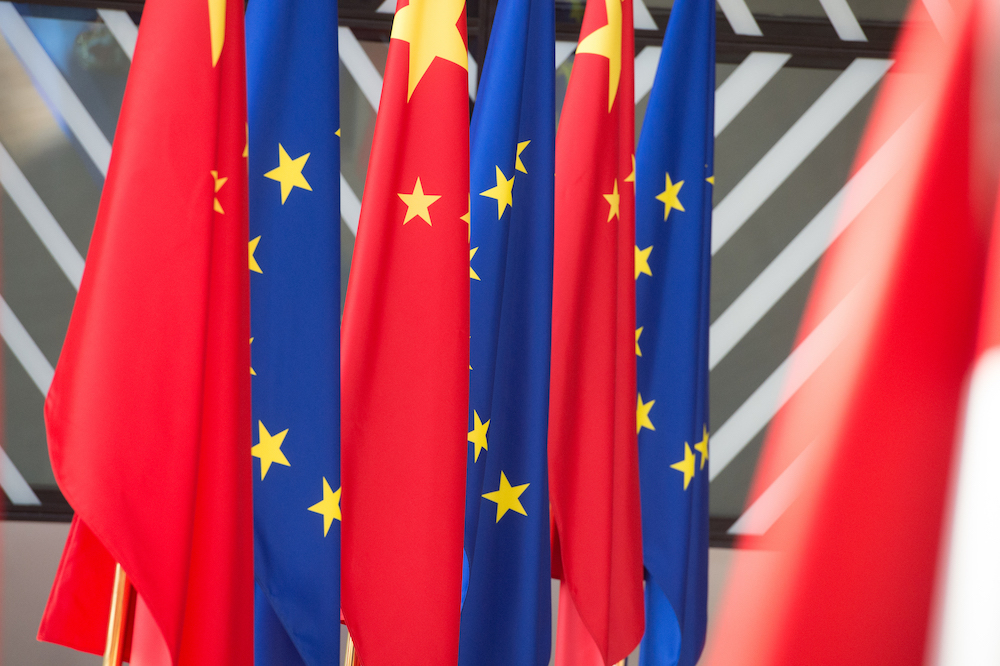
*On the second day of their European Council meeting, Heads of State and Government agreed on a common approach to industrial, trade and investment policy towards the People’s Republic of China on Friday.
They were confident that the Union was now more united than it has been with China’s growing global economic power. They want to insist to Beijing that in all economic areas, reciprocity must apply, said the Chancellor of Germany, Angela Merkel. China, for example, has to open up its hitherto completely sealed off public procurement market if it wants to bid for such projects in Europe.
At the meeting, the Italian government’s decision to conclude an agreement with China to include key Italian infrastructure and businesses in the “New Silk Road” initiative was critically scrutinized. (20190322)
*On 12 March, European Commission contributed to the European Council with the „EU-China Strategic Outlook“.
Against the backdrop of China’s growing economic power and political influence, the European Commission and the High Representative is reviewing the European Union-China relations, the related opportunities and challenges. They set out 10 concrete actions for EU Heads of State or Government to discuss and endorse at the European Council of 21-22 March (also included are the issues of European Citizens’ Initiative and Brexit).
These actions are formulated in the context of relations with China, but some of them relate to the EU’s global competitiveness and security. In general, the EU’s response will pursue three objectives:
Based on clearly defined interests and principles, the EU should deepen its engagement with China to promote common interests at global level.
The EU should robustly seek more balanced and reciprocal conditions governing the economic relationship.
Finally, in order to maintain its prosperity, values and social model over the long term, there are areas where the EU itself needs to adapt to changing economic realities and strengthen its own domestic policies and industrial base.
Specifically, the Commission and the High Representative invite the European Council to endorse the following 10 actions:
Action 1: The EU will strengthen the EU’s cooperation with China to meet common responsibilities across all three pillars of the United Nations, Human Rights, Peace and Security, and Development.
Action 2: In order to fight climate change more effectively, the EU calls on China to peak its emissions before 2030, in line with the goals of the Paris Agreement.
Action 3: The EU will deepen engagement on peace and security, building on the positive cooperation on the Joint Comprehensive Plan of Action for Iran.
Action 4: To preserve its interest in stability, sustainable economic development and good governance in partner countries, the EU will apply more robustly the existing bilateral agreements and financial instruments, and work with China to follow the same principles through the implementation of the EU Strategy on Connecting Europe and Asia.
Action 5: In order to achieve a more balanced and reciprocal economic relationship, the EU calls on China to deliver on existing joint EU-China commitments. This includes reforming the World Trade Organisation, in particular on subsidies and forced technology transfers, and concluding bilateral agreements on investment by 2020, on geographical indications swiftly, and on aviation safety in the coming weeks.
Action 6: To promote reciprocity and open up procurement opportunities in China, the European Parliament and the Council should adopt the International Procurement Instrument before the end of 2019.
Action 7: To ensure that not only price but also high levels of labour and environmental standards are taken into account, the Commission will publish guidance by mid-2019 on the participation of foreign bidders and goods in the EU procurement market. The Commission, together with Member States, will conduct an overview of the implementation of the current framework to identify gaps before the end of 2019.
Action 8: To fully address the distortive effects of foreign state ownership and state financing in the internal market, the Commission will identify before the end of 2019 how to fill existing gaps in EU law.
Action 9: To safeguard against potential serious security implications for critical digital infrastructure, a common EU approach to the security of 5G networks is needed. To kickstart this, the European Commission will issue a Recommendation following the European Council.
Action 10: To detect and raise awareness of security risks posed by foreign investment in critical assets, technologies and infrastructure, Member States should ensure the swift, full and effective implementation of the Regulation on screening of foreign direct investment. (20190315 Source: ec.europa.eu)
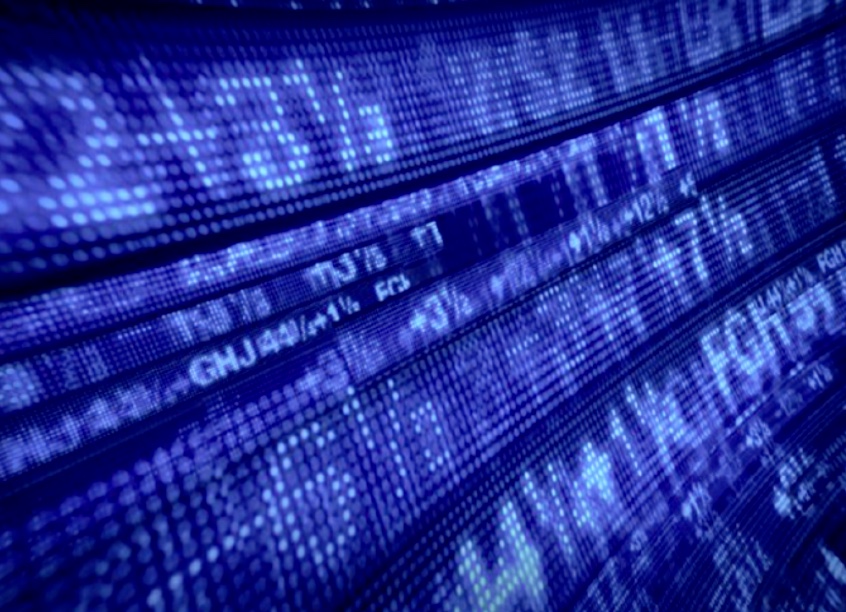
*The rate of global manufacturing growth has slowed, mainly as a consequence of trade and tariff barriers, according to the International Yearbook of Industrial Statistics 2019 published by the United Nations Industrial Development Organization (UNIDO).
World manufacturing value added rose by 3.6 per cent in 2018, slightly lower than the 3.8 per cent recorded in the previous year. The slowdown is mainly attributed to emerging trade and tariff barriers involving the USA and China, as well as the USA and the European Union (EU), which has exposed markets to a significant amount of uncertainty, limiting investment and future growth. China, the EU and the USA account for over half of global manufacturing production.
The slowdown in production in 2018 was observed in industrialized economies as well as developing and emerging industrial economies. The manufacturing value added (MVA) growth rate for industrialized countries rose by 2.3 per cent in 2018, compared to 2.6 per cent in 2017. For the group of developing and emerging industrial economies, the MVA growth rate in 2018 was 3.8 per cent, down from 4.1 per cent in 2017.
In North America, manufacturing production maintained relatively higher growth, mainly thanks to the USA where manufacturing production rose at the higher pace of 3.1 per cent in 2018, compared to 1.8 in 2017. However, in the European Union and East Asian countries, the annual manufacturing growth rate decreased, from 3.5 per cent to 2.6 per cent, and from 3.1 per cent to 1.9 per cent, respectively.
The International Yearbook of Industrial Statistics 2019 also presents data at manufacturing sector level by country. For example, if China is excluded from a global ranking of developing countries, Indonesia ranked top among food manufacturing and rubber and plastic products, while India took first position in production of textiles, pharmaceuticals and basic metals. Similarly, Bangladesh stood as the largest producer of wearing apparel.
Overall structural change in manufacturing was characterized by the increasing share of high-tech sectors in manufacturing output. For example, the medium-high and high-technology sectors accounted for more than 75 per cent of manufacturing of Singapore. Japan and the Republic of Korea were among other leading manufacturers in high-tech sectors.
African countries continue to struggle in their efforts to catch up with the industrial development of the rest of the world. The average share of manufacturing in GDP of African least developed countries (LDCs) has further dropped to 8.3 per cent compared to the 19.6 per cent average of the developing countries and emerging industrial economies group. This represents a serious challenge to the Sustainable Development Goal 9 target of doubling the MVA share in GDP in LDCs by 2030. (Source: UNIS Vienna 20180227)

*Barcelona is holding the 5G Summit from 25. to 28. February, bringing together CXOs and experts from global operators, vertical industry leaders, consulting firms, chipset and device manufactures, and other ecosystem players – all of whom are excited to share their thoughts and perspectives on the phenomenal growth of the mobile broadband industry and its transformative impact on many industries, according to MWC Barcelona.
This event includes visionary keynote speeches and thought-provoking panel discussions featuring such topics as Evolving and Deploying – Leading 5G Network and Business, Exploring and Enabling – 5G shaping the future, and How to build win-win cooperation for industry players in the 5G Era.
Nearly all smartphone manufacturers announced the launch of the Mobile World Congress first cell phones for the 5G standard. The first Samsung had made with the Galaxy S10 5G, which will come in summer onto the European market (Germany, for example). Huawei incorporates the 5G reception technology into the top-of-the-line, flexible-screen Mate X, so proudly speaks of the “fastest folding smartphone in the world”.
LG also mixes with the 5G devices, brings out with the LG V50 ThinQ a mobile phone for the super-fleet data transmission. Chinese manufacturer Xiaomi presented its Mi Mix 3 5G smartphone. Cristiano Amon, President of semiconductor manufacturer Qualcomm, cheered to it, saying: “5G is here and will be available to customers in the second quarter.” (20190226)
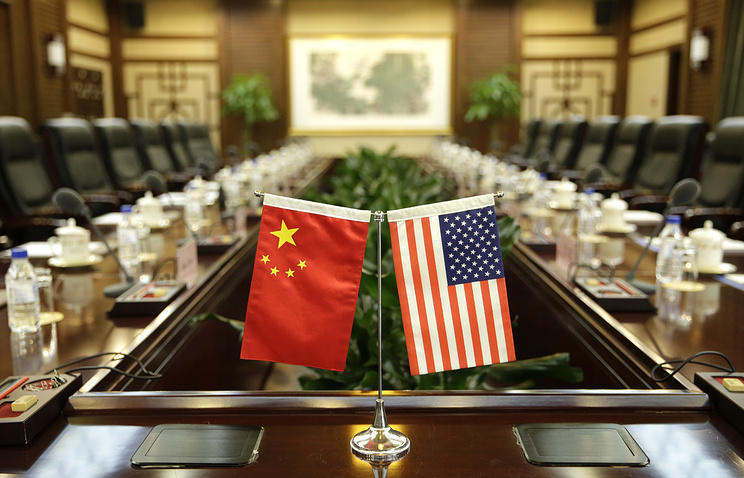
*On 19. Feb., Trump surprisingly stated that the increase in special duties on Chinese goods will be postponed indefinitely. March 1 deadline for trade negotiations with China is “not a magical date,” said the US president to journalists in the Oval Office, “They are very complex talks. They’re going very well. I can’t tell you exactly about timing.“
Trump recently threatened to introduce special duties on March 1 should Beijing refuse to accept Washington’s conditions. The US leadership’s demands ranged from cutting Chinese surpluses to halting the promotion program “Made in China 2025”.
The program seems suddenly forgotten. Washington has not mentioned it for some time. Rather, it is now focusing on getting the Chinese leadership to renounce the Yuan’s devaluation. The weakness of the Chinese currency has not been a central issue in discussions between Washington and Beijing so far. (20190219)
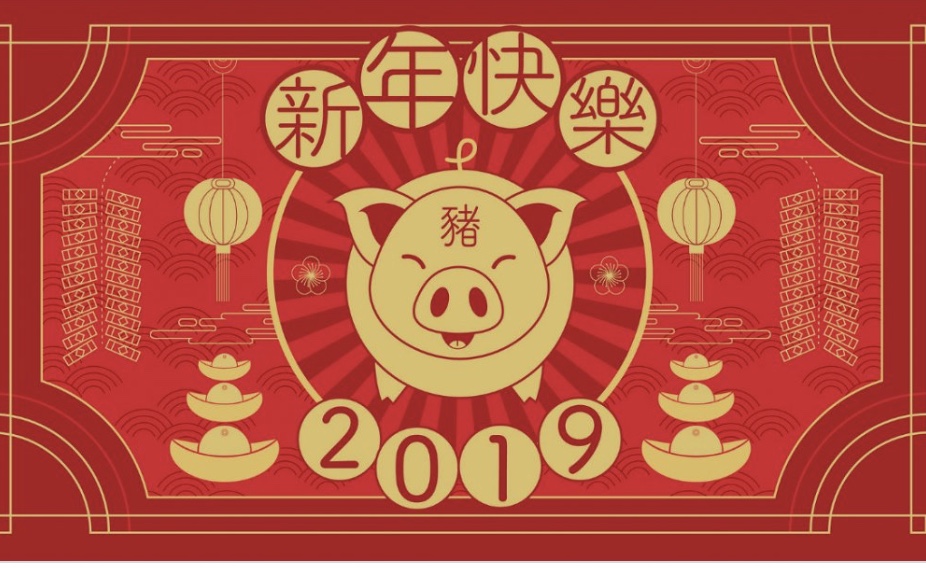
*Starting 5. February, 2019, it is the Chinese Lunar New Year, the Year of the Earthy Pig. The Pig is the twelfth of all zodiac animals. According to one myth, the celestial Jade Emperor said the year order should be decided by the time order in which they arrived to his party. Pig was late because he overslept. Another story says that a wolf destroyed his house. He had to rebuild his home before he could set off. When he arrived, he was the last one and could only take the twelfth place. But funnily, it is Pig who becomes the symbol of wealth. Its chubby face and big ears are supposed to be signs of fortune.
The Chinese celebrates the lunar new year for 15 days, ending with a fabulous Lantern Festival.(20190208)
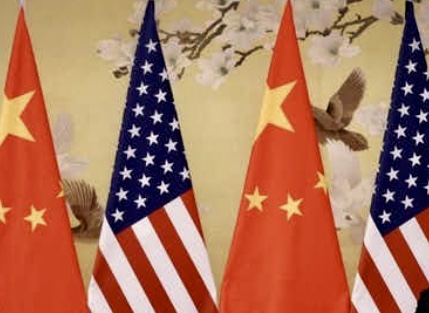
*China and the U.S. have begun to try again today to find solutions to end a damaging trade war. With a new round of high-level talks aimed at bridging deep differences over China’s intellectual property, cyberspying, cybertheft, forced technology transfer policies, market-opening as well as the Chinese government’s subsides of state-owned enterprises, the talk is complicated by the Huawei issue and the US government shutdown.
Trump and Xi agreed on 1. December, 2018 to a 90-day tariff cease-fire that expires in March 2019. The US imposed raised duties on Chinese products with an annual trade value of approximately $200 billion by 10% from 24. September 2018. The rate of additional duty for the products will increase to 25 % on 2. March, 2019 if no deal is successfully negotiated.
The trade war is beyond doubt a lose-lose game. The negative effect on the economy in the US is showing the numbers already, with 36 percent of manufacturers raising prices and 27 percent delaying investments. But if the ball is in China’s court is also a question mark. (20190130)
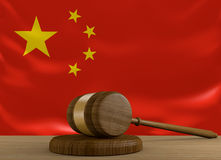
*China developed a national public legal service network by the end of 2018, Vice Minister of Justice Xiong Xuanguo said on 29. January, 2019.
The country set up a total of 2,917 legal service centers at the county and district level, as well as 39,380 legal service stations at the township level and in urban communities, Xiong said at a press conference. Through these institutions, citizens will have access to legal services such as legal aid, judicial intermediation, notarization and arbitration, according to Xiong.
Thirty-one provinces, autonomous regions and municipalities have opened provincial-level legal service websites and linked them to the national website, www.12348.cn, he said.
In a judicial reform plan from 2018 to 2020, published by the ministry at the press conference, public legal service remains a priority. The ministry will step up efforts to further extend the network, raise public awareness and improve the legal aid system and management of lawyers, according to the plan. (Source: Xinhua)
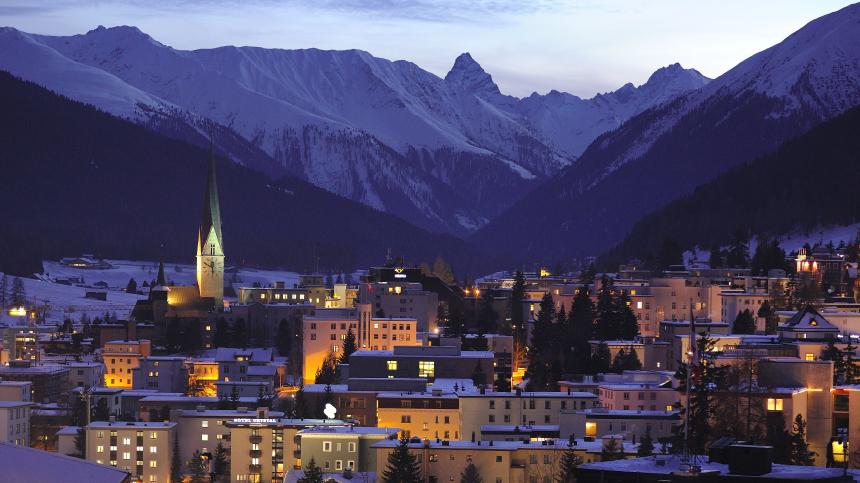
*Leaders, experts and top managers met in Davos, Switzerland, from January 22 to January 25, 2019 for the 49th World Economic Forum Annual Meeting, discussing how to steer policy amid worries of slowing economic growth, damaging trade wars and Brexit.
This year’s forum concentrated on such topics as shaping a global architecture in the age of the Fourth Industrial Revolution (Globalization 4.0), building a new economy and society to create a more inclusive capitalism in order to reduce the gap between the poor and the rich, as well as environmental stewardship. The forum isoffering platform for public-private cooperation and centre for the Fourth Industrial Revolution.
For nearly 50 years, world business and political leaders have headed to the small Swiss village to discuss the future of the global economy with the collective mission statement of the organising body, the WEF, to “improve the state of the world”.
The event was first held in 1971 and was originally named the European Management Forum before being renamed in 1987. (20190126)
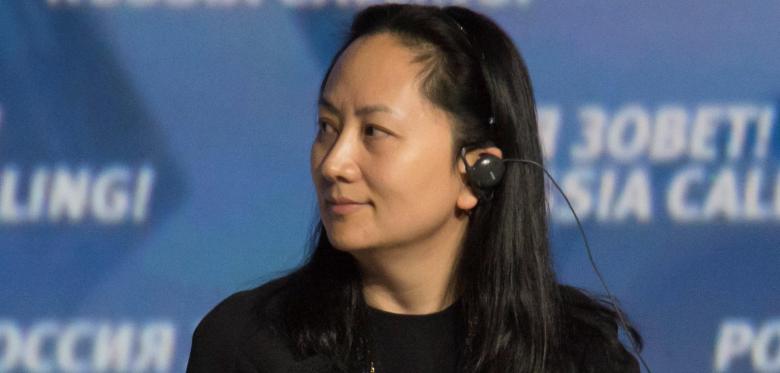
*Sabrina Meng (Wanzhou), Huawei’s chief financial officer, daughter of the influential Huawei founder, was detained by the Canadian authorities in Vancouver on December 1, 2018, reportedly for violating US trade sanctions against Iran with equipment supplying.
This came right after a friendly meeting betweenUS President Donald Trump and his counterpart Xi Jinping at the G20 summit in Argentina.
China immediately protested the action made at the request of the US government. The Foreign Ministry in Beijing demanded the release of Meng Wanzhou. The “Global Times” in China called the US behavior like “horrible hooligans”.
Huawei is the company that embodies China’s dream of becoming the leading technology nation.
The timing of the arrest of the CFO couldn’t be worse. And the follow-ups might not be as optimistic as some Chinese media or public opinion thought. After all, it has been well planned out. For now, the Chinese head of state definitely feels that the process was humiliating, if not worse. (20181206)
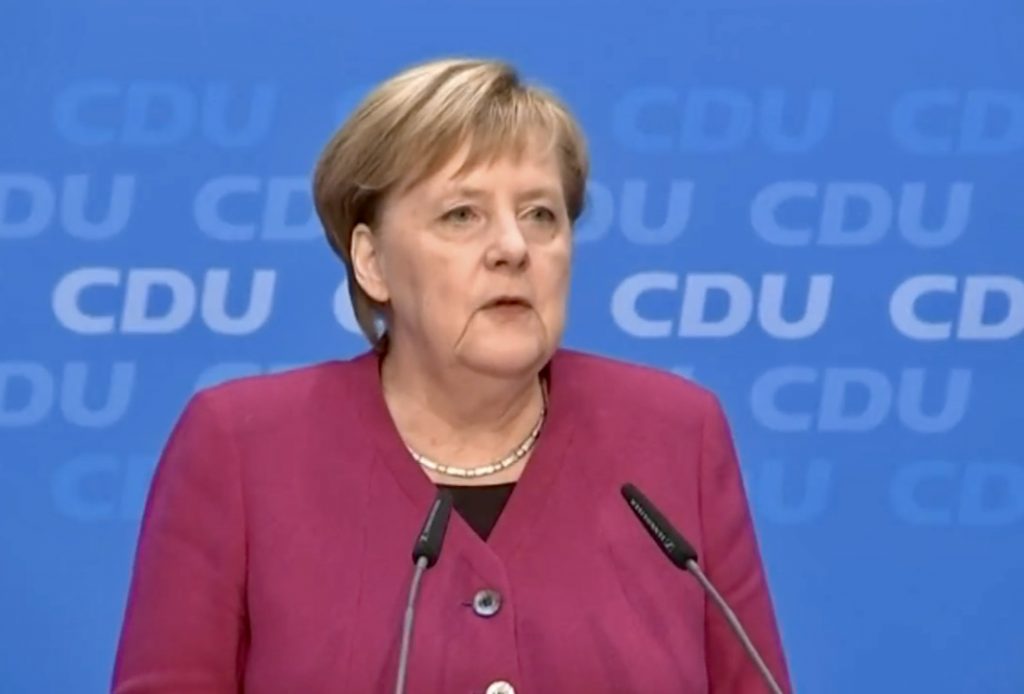
*On October 29th, German chancellor Angela Merkel made a dignified, matter-of-fact speech, announcing her stepping down as chancellor in 2021, at the end of her fourth term. She is going to surrender her 18-year leadership of the Christian Democratic Union (CDU) next month, too.
This announcement came a day after a regional election in the German state of Hesse. Mrs Merkel’s CDU plunged 11 percentage points to 27% in Sunday’s elections in Hesse. The coalition party SPD fell by a similar amount to 19.8%.
As the magazine The Economists put it, after 13 years under Mrs Merkel as chancellor, Germany is ready for change. But at first glance it is not clear why. The economy is stronger than ever, with unemployment at an all-time low. The country has managed to deal well with the large influx of asylum-seekers in 2015 and 2016, and since then migrant arrivals have fallen dramatically. The issue of refugees barely featured in election campaigns in Hesse. “The dissatisfaction is not about policies, but rather about how politics is carried out,” says Thorsten Haas, of Berlin’s Free University. The squabbles in Berlin play into feelings that politicians are out of touch and more interested in their own jobs than serving the country. Loyalties to the traditional big-tent parties have also weakened, and voters are less likely to vote according to affiliations to a trade union, the church or a particular social class.
The German chancellor has been measured, cautious, methodical, pragmatic, sometimes maddeningly noncommittal and seemingly always in control, the Guardian wrote. Whoever taking over her position will have to face the challenge of being as cool as her, and most importantly, always in control.
Who is going to be Mrs Merkel’s successor in Germany is one question. Who is going to continue steer EU toward the open, tolerant and optimistic direction is another. As Austria has drawn out of the UN „Global Compact for Safe, Orderly and Regular Migration“, more EU countries are tending to follow the mode. EU’s future is by all means gloomier than ever. (20181104)
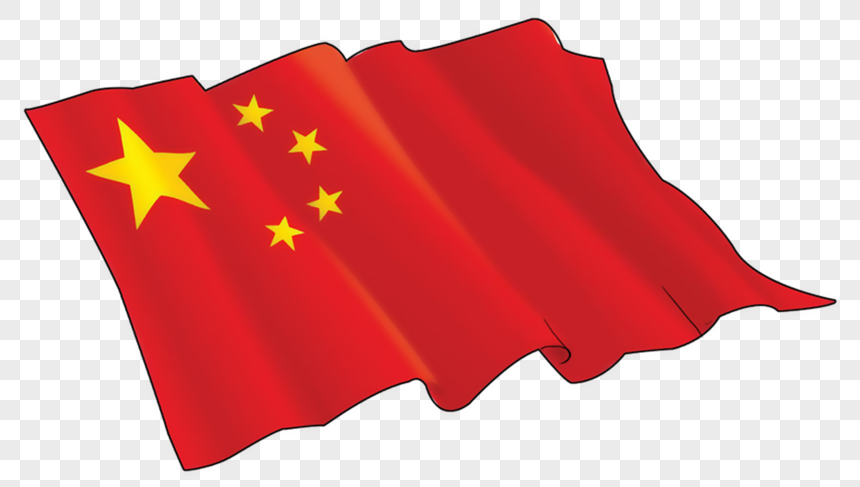
*This year, CRS has arrived in China, which is causing waves of uneasiness home and abroad.
The Common Reporting Standard (CRS), a FATCA like regime, is a global standard for countries to exchange information about offshore accounts. It aims to prevent offshore tax evasion by giving countries transparency about offshore financial assets. It was developed by the Organization for Economic Cooperation and Development (OECD), encourage the government from different countries to obtain the details of account information from their financial institutions, and to automatically exchange such information annually with the tax jurisdictions of the place of residence of account holder. CRS applies to both individuals and legal entities.
The European Union adopted CRS on January 1, 2016 after amending the part on administrative cooperation ofre-taxation.
As of June 2017, the following countries are already committed to CRS:
Anguilla, Argentina, Barbados, Belgium, Bermuda, British Virgin Islands, Bulgaria, Cayman Islands, Colombia, Croatia, Curaçao, Cyprus, Czech Republic, Denmark, Estonia, Faroe Islands, Finland, France, Germany, Gibraltar, Greece, Greenland, Guernsey, Hungary, Iceland, India, Ireland, Isle of Man, Italy, Jersey, Korea, Latvia, Liechtenstein, Lithuania, Luxembourg, Malta, Mexico, Montserrat, Netherlands, Niue, Norway, Poland, Portugal, Romania, San Marino, Seychelles, Slovak Republic, Slovenia, South Africa, Spain, Sweden, Trinidad and Tobago, Turks and Caicos Islands, United Kingdom.
Starting to report in 2018are the following countries including China, Austria, Switzerland and Hongkong, China.
Albania, Andorra, Antigua and Barbuda, Aruba, Australia, Austria, The Bahamas, Bahrain, Belize, Brazil, Brunei Darussalam, Canada, Chile, China, Cook Islands, Costa Rica, Dominica, Ghana, Grenada, Hong Kong (China), Indonesia, Israel, Japan, Kuwait, Lebanon, Marshall Islands, Macao (China), Malaysia, Mauritius, Monaco, Nauru, New Zealand, Pakistan, Panama, Qatar, Russia, Saint Kitts and Nevis, Samoa, Saint Lucia, Saint Vincent and the Grenadines, Saudi Arabia, Singapore, Sint Maarten, Switzerland, Turkey, United Arab Emirates, Uruguay, Vanuatu. (20180902)
*China is facing right now not only the nasty challenges initiated by the US President D. Trump, but also going through some political instability. The two matters have obviously close links to each other.
Trump’s tariffs and trade threats are intimidating in the sense that the counter-attack by the Chinese government seems to be lacking in volumes. While Trump has instructed his trade team to consider 25% tariffs on $200 billions of Chinese imports (starting possibly as early as September) plus the already affective sum of 50 billions, China’s announced retaliation (as of 3. August) is a mere $60 billions. This is causing waves of fear and criticism in China. The business of exports see the direct impact already. It is said that in the past days, officials from the Commerce Ministry, the police and the related agencies have been asking the Chinese exporters to make plans to lay off workers or shift supply chains to other countries.
A more active fiscal plan is necessary to boost the economy in China, which is also key to the present government. The communist party under the strongman President Xi Jinping needs the strong economy to justify its monopoly, its sustainability and its image on the world stage.(20180817)
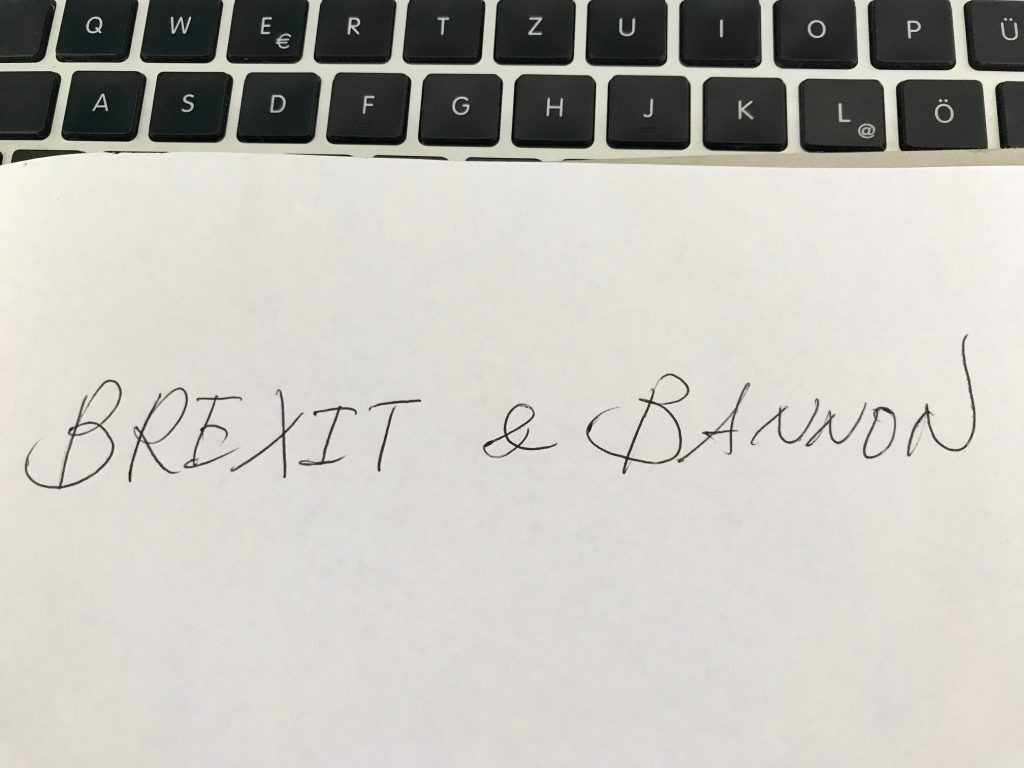
*The Brexit negotiations are obviously going through crucial yet odd ways. Brussels are accusing London of cherry picking because Britain wants a free trade area for goods and agricultural products but not for services after Brexit, while the EU internal market also requires the free movement of services, capital as well as that of EU citizens. Besides, the Irish border issue is by no means neglectable.
If Britain leaves the EU with regulated agreement, it could generate significant economic consequences. The new British Foreign Minister Jeremy Hunt came to Berlin yesterday, Monday, 23 of July . warning against a disorderly leaving of Britain from the EU. British Prime Minister Theresa May will meet this week the Austrian chancellor, and Czech and Estonian prime ministers, trying to go forward with the time-ticking negotiations, due at March, 2019.
What should worry the EU, though, is not only the Brexit itself, but also Steve Bannon who is somehow allowed to have made London into his propoganda base for masterminding the European right extremists from France to Sweden in order to mess up the EU Election in 2019. His goal is to realize one third of the EU parliament seats for the right extremists through „ The Movement“, which would be an unimaginable catastrophe for Europe, including the EU and Britain, shaping the continent into an isolated wasteland of xenophobia, anti-establishment and anti-globalization. (20180724)
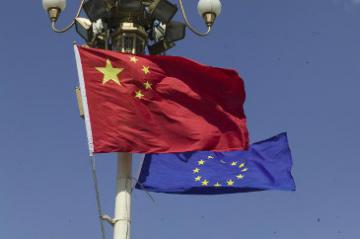
*The EU-China Summit in Beijing today, 16.7.2018, has the trade and investment as the central topic. While the EU Council President Donald Tusk stressed on “commen task”, calling USA, Russia, EU and China to commenly avoid chaos threatened by possible trade wars, the Chinese Premier Li Keqiang asked for sustaining multilateralism and free trade.
EU leaders also hold talks with President Xi Jinping. Both sides are jointly expressing their support for a rules-based trading system. Talking about modernizing the World Trade Organization is also on the agenda.Besides, the summit program includes foreign and security policy challenges, i.a.the denuclearization of the Korean Peninsula,the nuclear agreement with Iran,the situation in Syria,Afghanistan as wellthe Rohingya crisis.
The networking of Europe and Asia and China’s “One Belt, One Road” initiatives are also on the agenda. Tackling global challenges such as climate change and green energy, maritime policy and environmental protection as well as migration are also advised to be discussed on the summit.
The EU has never been so near to China in the past couple of years, which is a sign of the new geo-political situation in the world. As Trump is pushing the EU away and anticipating new conflicts with Russia in Helsinki, it is by all means a wise move for the EU and China to get closer to each other. (20180716)

*Last Friday, 6. July 2018, the US President Trump took action and put the tariffs on $34 billion worth of Chinese industrial imports. This may be interpreted as the beginning of a real trade war between the two strongest economies in the world. After all, nobody knows if Trump means to continue or even win the battle of protectionism. Trump threated another $16 billion worth of tariffs against China in the coming weeks and a total sum of $550 billion in the next few months.
Imports of steel, aluminum, washing machines and solar panels are among the tariffed items. A CNBC analysis put the key problem on 5G technology, the next generation of mobile internet which will offer high-speed mobile service, great internet experience, movie-downloading in seconds as well as support the next generation of infrastructure including smart cities and driverless cars. Both China and the US are striving to be the leader of 5G to set the standards defining the next generation of mobile internet.
The 5G argument might be true just like that of Made in China 2025. But the trade war has much broader and profounder ground. It has to do with the intellectual property, goods dumping and fear of another strong economy. Least but not last, a (neurotic) wish of having a cold-war like opponent.
What the US government seems to ignore is the plain fact that China has long become its biggest federal reserve, allowing the Americans to maintain their living standards without worrying much about the future. From this point of view, one can see a boomarang not only for America but also for China. (20180708)
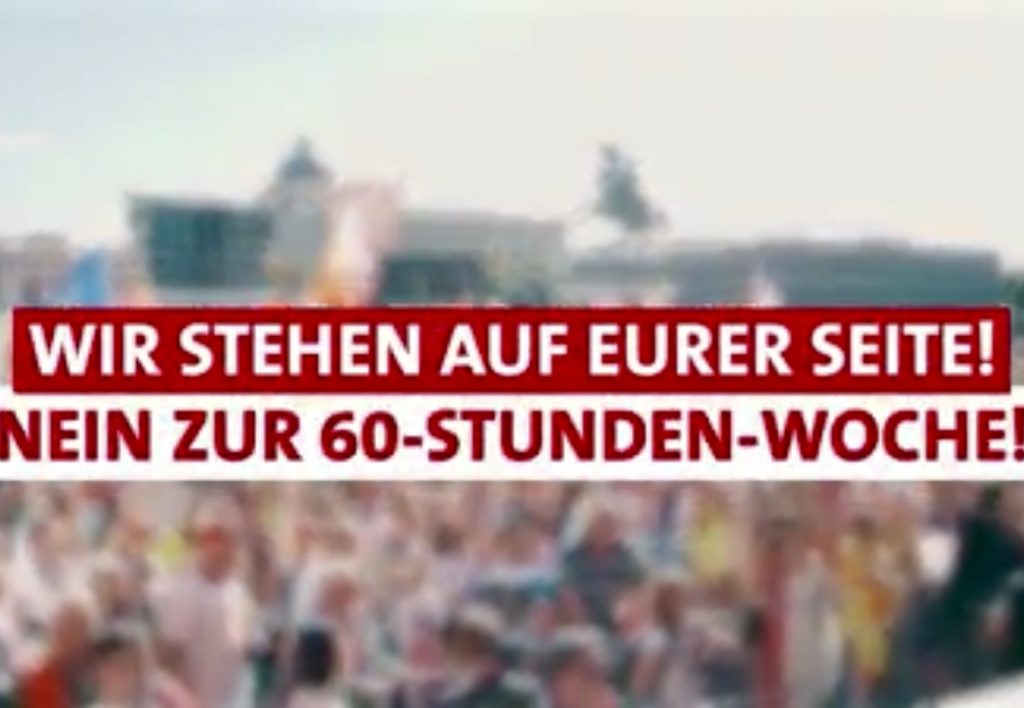
*The Austrian coalition government with ÖVP and FPÖ agreed last week on a series of measures to strengthen Austria as a business location. Yet it comes with a big scrifice. Among other things, the once long-time and highly controversial discussion between SPÖ and ÖVP as well as the social partners about “Arbeitszeitflexibilisierung” (Flexible working time) came to an end. In the future, there will be the voluntary option of a 12-hour working day, as ÖVP boss Sebastian Kurz and FPÖ leader Heinz-Christian Strache announced after the Wednesday round in front of the assembled press.
This brought a big demonstration on 30. June in Vienna. The ÖGB mobilized around 100,000 people in the East, who opposed the extension of maximum working hours. The SPÖ also swam in a prominent role in the demonstration, including party leader Christian Kern, and Vienna Mayor Michael Ludwig. According to the new law, the employer can ask the employee to stay up to 12 hours per working day without extra pay. Even if the 11th and 12th hours are not mandatory, the position of the employee could be weakened in the eyes of the employer. Scenarios like possible layoff are thus not excluded.
Doubtless to say, this is not only a struggle between SPÖ and ÖVP/FPÖ, but also between law and human nature. Law might be protective but can’t control human sentiments from taking advantage of the legal loopholes. The new law can be observed as a result of the present Austrian government which is clearly in favor of the business owners instead of the working class. (20180702)
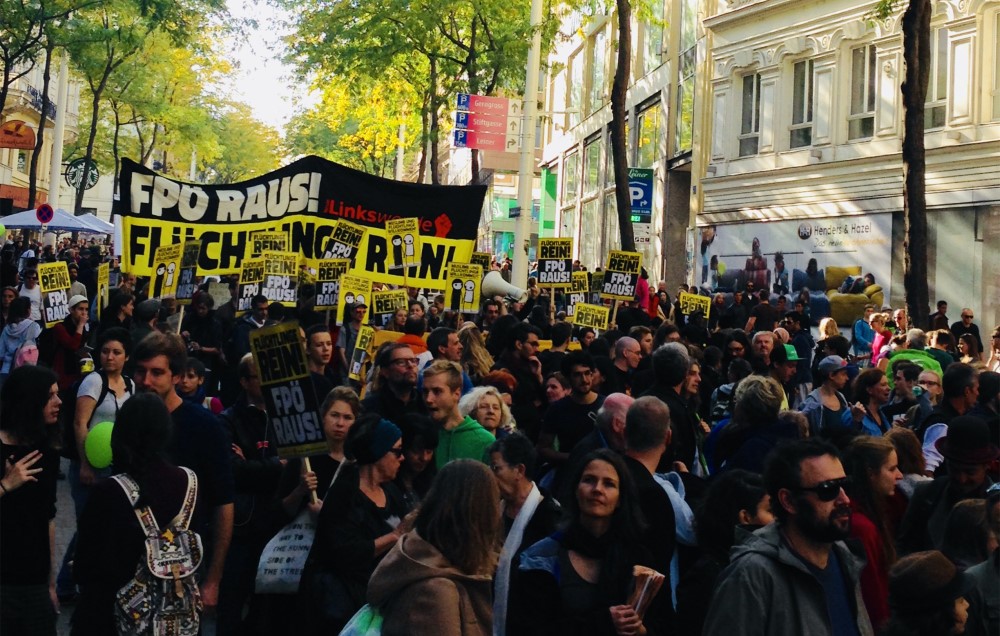
*Today, the heads of state and government of the EU reached an agreement in Brussels: The asylum policy should be tightened. There will be refugee centers in and outside the EU. On European soil, there will be closed camps established when the member states voluntarily do it.
Even if such centers are useful in the coastal countries like Italy and Greece, other membership countries will not be motivated to follow the move. And the implementation of those getto-like camps might bring back terrible memories in human history.
The present migration crisis in Europe, being at its peak in 2015, can be better dealt with if the eastern European countries are more cooperative as EU’s family members. Unfortunately, the European idealism has often ignored its political past.(20180629)

*US President Donald Trump has threatened China with further punitive tariffs on goods worth US $ 200 billion. He ordered his Trade Representative Robert Lighthizer on Monday evening (18.June,2018) to determine appropriate products, as the White House announced.
Trump described the move as a retaliatory move. The new tariffs of ten percent should come into effect if the Chinese government refuses to change their course of action and, as announced, make their tariffs serious, the US president said. China has threatened retaliation with the US following the announcement. “The United States is initiating a trade war and violating the laws of the market,” a spokesman for the Beijing Ministry of Commerce said Tuesday.
The trade conflict between the world’s two largest economies continues to rocket. Trump had imposed fines of 25 percent on 1102 products from China worth $ 50 billion only on last Friday. They are aimed primarily at technology products and should be collected from 6th July. China charges retaliatory duties from 6th July in response, announcing retaliatory tariffs on $ 50 billion worth of American goods. (Source:WELT)

*Chinese president Xi Jinping met with Kim Jong Un at the Diaoyutai State Guesthouse in Beijing on Wednesday, 20. June, 2018. The two leaders had an in-depth conversation over tea in a cordial and friendly atmosphere.
Noting that Kim has paid three visits to China within 100 days to meet with him, Xi said the two sides have jointly created a new history of China-DPRK high-level exchanges.
He said he believes that under the joint efforts of both sides, China-DPRK relations will certainly benefit the two countries and the two peoples. With joint efforts of China, the DPRK and related parties, the Korean Peninsula and the Northeast Asia will surely embrace the bright prospects of peace, stability, development and prosperity, said Xi.
Kim said the two countries are as close and friendly as family, and help each other, adding that Xi has offered affectionate care and support for the DPRK people. He vowed to work with Chinese comrades to upgrade bilateral ties to a new high, and play their due roles in safeguarding world and regional peace and stability.
Xi’s wife Peng Liyuan and Kim’s wife Ri Sol Ju also attended the meeting. (Source: Xinhuanet)

*Addressing members of the West Point football team at the White House, Trump floated the idea of adding a “Space Force” branch to the US military — a concept that has received some support on Capitol Hill but drawn skepticism from the Pentagon.Trump previously voiced his support for creating a “space force” during a speech in March before military members in California.
Rogers and Cooper spearheaded a push last year to establish a new military branch — under the umbrella of the Air Force — focused on space. That proposal, which was included in the House version of the 2018 National Defense Authorization Act, would have set up a Space Corps in the mold of the Marine Corps, which is a separate military branch that’s housed within the Navy.
Bolstered by Trump’s show of support in March, House lawmakers are moving forward with their push to establish “a subordinate unified command for space under U.S. Strategic Command that would be responsible for joint space warfighting operations.” (Source: CNN)

*Italy’s interior minister Matteo Salvinihas sparked a new migration crisis in the Mediterranean by barring two rescue boats from bringing refugees to shore, a week after the Aquarius was prevented from docking. Following Salvini’s decision, Malta quickly followed suit, leaving the vessel stranded at sea until Spain offered to take the ship. It arrived in Valencia on Monday (18.June, 2018).
More than 600,000 migrants have made the crossing from Libya to Italy in the past four years. Salvini’s stance reflects frustration that the rest of Europe refuses to take its share of arrivals. At least 13,000 people have drowned trying to reach European shores. (Source: The Guardian)

*A major rift has opened up between German Chancellor Angela Merkel and her interior minister over migrant policy, threatening her coalition government. The minister, Horst Seehofer of the Christian Social Union (CSU), wants police to have the power to turn away undocumented migrants at the border. He has been a long-standing critic of that open-door policy, which was summed up at the time by Mrs Merkel’s phrase “we can manage”.
Mrs Merkel, widely criticised for letting in about one million in 2015, has held emergency talks with her Christian Democrat (CDU) MPs and wants a new deal at EU level over migrants. She says that “go-it-alone” policy would further hurt Italy and Greece, countries whose capacity to house migrants is stretched to breaking point. Among them are many refugees from the Syria war and other conflict zones.
While Mrs Merkel’s CDU MPs gave her their support, their Bavarian colleagues from the CSU decisively backed their leader, Mr Seehofer. The “sister” conservative parties have been in alliance at the federal level since 1949. (Source: BBC)

*The contract of Tomas Zierhofer-Kin, the director of the Vienna Festival, who has only been in office for two years, will be dissolved by mutual consent three years before the end of June 30.
Zierhofer-Kin himself offered his resignation, as he didn’t receive, despite many artistic successes and the successful efforts to attract a new audience for the Festival, a wider response. “This decision is an expression of my responsibility, which I especially perceive vis-à-vis the international artists and the Wiener Festwochen, which in my opinion was subjected to unjustified criticism,” Zierhofer-Kin is quoted as saying. (Source: ORF)
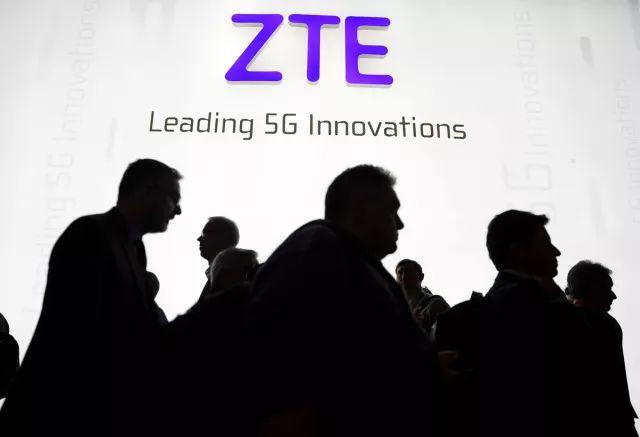
*The U.S. Department of Commerce announced a market-shaking decision on Monday to deny export privileges against ZTE, a leading Chinese telecom equipment company, stoking up the tension of trade relations between the two countries.
This was only the latest and one of the many cases of Chinese companies being sanctioned by the United States over the past years. The Trump administration has been accusing China on trade surplus, intellectual property protection and other issues.
China’s biggest smart phone producer Huawei still can’t make a meaningful entry into the United States after decades of efforts, as AT&T and Best Buy rejected or stopped selling Huawei phones weeks ago due to pressure from the administration in the name of “national security” concerns.
“National security” has become a magic tool for the world’s biggest developed free market economy to restrict businesses of Chinese companies.
The latest U.S. decision on ZTE may hit the Chinese company hard, but the first casualties are its U.S. suppliers. The stock price of ACIA plunged 35.97 percent on Monday, that of Oclaro dropped 15.18 percent, and Lumentum fell by 9.06 percent. (17.April, Source: Xinhuanet)
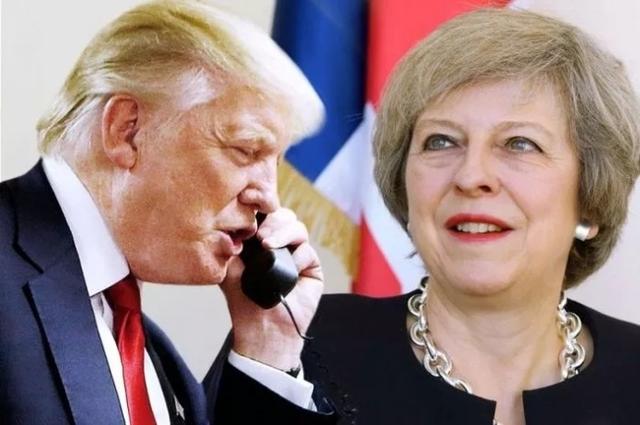
*Britain’s main opposition Labor leader Jeremy Corbyn repeated his call Tuesday for a War Powers Act to force Prime Minister Theresa May to seek parliamentary approval ahead of any military action.
Corbyn led a three-hour debate in the House of Commons over parliament’s rights in relation to the approval of military action by British forces overseas. Although Corbyn won by 317 to 256, a majority of 61, political commentators described it as a symbolic victory.
The vote did however highlight mixed feelings among politicians of different parties over whether the prime minister and her senior ministers can send British troops into battle and military action without first seeking approval from lawmakers at Westminster.
During Monday’s debates in the House of Commons, May refused to give an assurance that she would ask for parliamentary approval before she sanctioned military action. (17.April, Source: Xinhuanet)
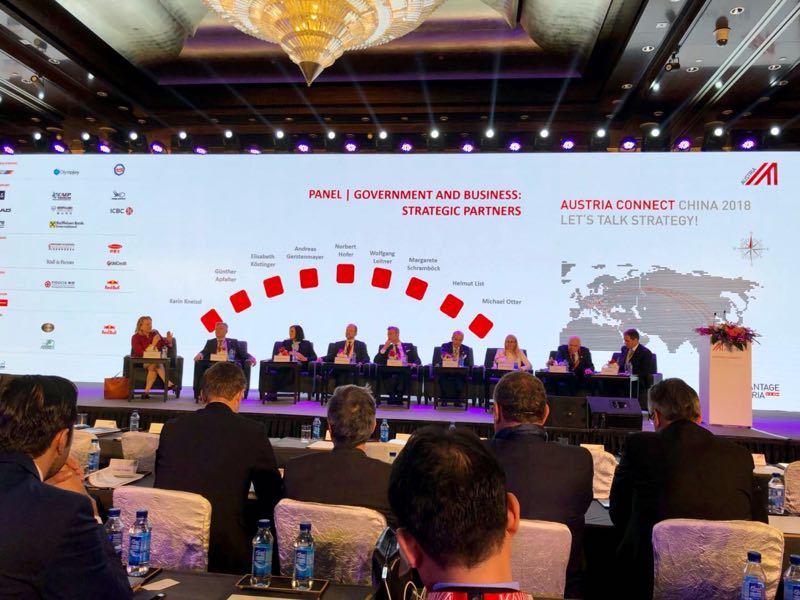
*Leading an almost 300-member delegation of business representatives, cultural and scientific delegates as well as federal ministers, Austrian President Alexander Van der Bellen and Austrian Chancellor Sebastian Kurz set a diplomatic record in Austria’s modern history with their first joint visit to China from 7 to 12 of April.
The collective visit by the Austrian heads of state and government, which is also very rare in the history of international exchanges, manifests the importance Vienna attaches to Beijing, and Austria’s strong willingness to further develop bilateral relations. It also shows Vienna’s strong confidence and determination to tap the potential of comprehensive cooperation with China.
Official data from China show that China is Austria’s largest trading partner in Asia and the fifth largest in the world, while the latter is the sixth largest investor in China among the 19 Eurozone countries.
But the huge potential of bilateral cooperation still heralds better rankings for both sides. This visit saw the signing of around 1.5 Billion-Euro worth of relevant trade agreement, as well as the setting-out of the first train loaded with commercial goods along the „Belt Road“ from Chengdu to Vienna.

*Vienna was confirmed for the ninth time by Mercer, the renowned international consulting firm, as the most livable city in the world. Each year, Mercer carries out a study to assess the quality of life in 231 cities around the world. The results of the study in 2018 gave Vienna top marks again.
Political, social and economic climate, medical care, education as well as such infrastructural conditions as public transportation, power and water supply are among the indicators. Besides, recreational offers including restaurants, theaters, cinemas, sports facilities, the availability of consumer goods from food to cars, environmental conditions from green space to air quality were also taken into consideration.

*On 22. March, 2018, the Trump administration issued trade sanctions against China including restrictions on investment and tariffs on $60bn worth of products.
Donald Trump said that China imposes a 25% tariff on US cars while the US only has a 2.5% duty on Chinese cars, thus the imposition of tariffs was part of an effort for fairness. The US government announced that after a seven-month investigation, they came to that conclusion that China has been challenging American supremacy in technology, including hacking commercial secrets and demanding US companies deliver trade secrets in exchange for access to the Chinese market.
Although Beijing replied to the saction in the words of “taking all legal measures to protect our interest” if the US took “actions that will harm both China and itself”, the reaction has been mild up to now.
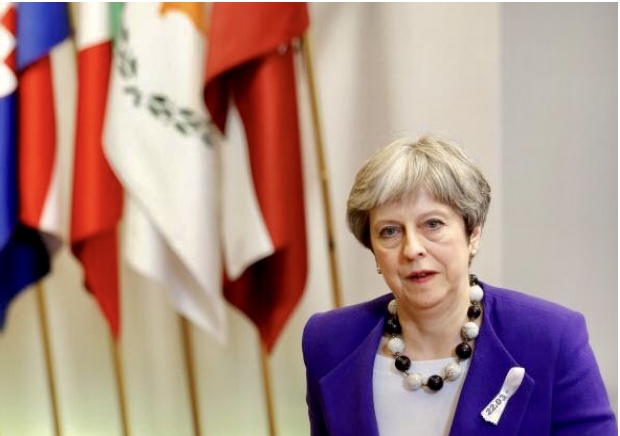
*British Prime Minister Theresa May said that 18 countries had announced plans to expel Russian officials, including 14 European Union countries. The United States confirmed it would expel 60 Russian diplomats, joining governments across Europe in punishing the Kremlin for a nerve agent attack on a former Russian spy in Britain. In total, 100 Russian diplomats were being removed, the biggest Western expulsion of Russian diplomats since the height of the Cold War.
Russia’s Foreign Ministry called the expulsions a “provocative gesture”. Moscow denied being behind the attack on Sergei Skripal and his daughter in the southern English city of Salisbury. Skripal, 66, and Yulia Skripal, 33, were found unconscious on a public bench in a shopping center on March 4 and remain critically ill in hospital. (Source: Reuters)

*US president Donald Trump anounced a tariff levy on imports of steel and aluminium around the world on March the 1st, 2018.
The levy of 25 per cent on steel and 10 per cent on aluminium are not in accordance with WTO policies. The EU believes that the Trump decision might cause domino effect or even retaliation, and is already considering imposing its own import tariff upon the metals as countermeasures.

*In a surprising move for the world, North Korea leader Kim Jong-un approached South Korea vigorously with the declared purpose of normalizing the relationship between the two countries. Kim treated a delegation of senior South Korea officials to a dinner in Pyongyang, which is a rare move, resonating the Winter Olympics before long in Pyeongchang.
South Korea president Moon Jae-in welcomed the gesture by issuing a letter to invite Kim to attend further talks. This is the highest communication between the two countries since 10 years.
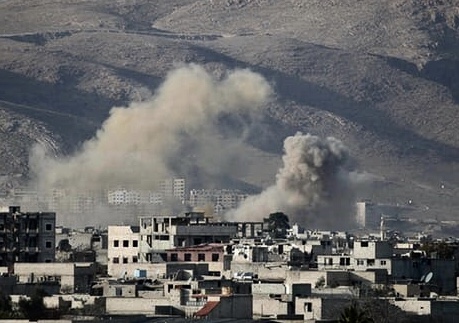
*Despite of UN security council’s demand on ceasefire, the Assad regime in Syria targeted eastern Ghouta on Monday, March the 5th, 2018, killing at least 77 people.
The Syrian authorities refused WHO convoy to deliver the necessary supply of trauma, surgical and dialysis equipments. Doctors on the ground said 712 people had been killed and more than 5,600 wounded since February, the 19th..
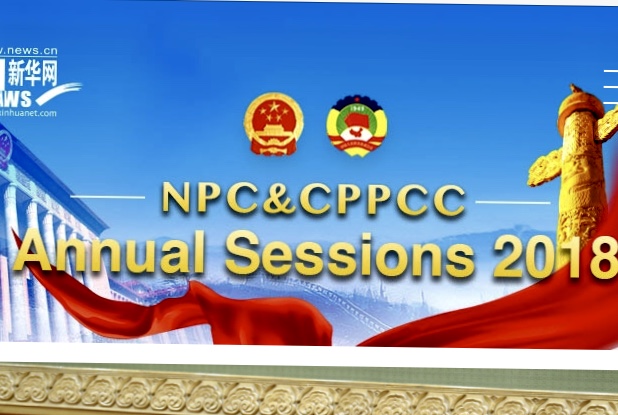
*China’s national legislature convened its annual session Monday, March the 5th, 2018, announcing actions that will shape efforts in the years to come to make China a great modern socialist country. The session marks a key national assembly after the Party congress. Observers say it will lay a solid foundation to turn the Party’s blueprint into action in a “issue by issue, year in and year out” fashion.
Before, nearly 3,000 NPC deputies gathering at the Great Hall of the People’s, listening to Premier Li Keqiang’s government work report. Li struck a confident note as he went over “historic achievements” made in the past five years, despite an “extremely complex” environment both at home and abroad.
China’s gross domestic product rose from 54 trillion yuan to 82.7 trillion yuan. More than 68 million people were lifted out of poverty. 66 million new urban jobs were added. The country is leading the world in high-speed rail, e-commerce, mobile payment and the sharing economy.
According to the work report, quality growth, tax cuts, “three critical battles” against risk, poverty and pollution, as well as wider reform and opening-up policy will be the endeavors of the central government for the coming years.
On Monday, the national legislature started deliberating a draft amendment to China’s Constitution, the first such move in 14 years. Xi Jinping Thought on Socialism with Chinese Characteristics for a New Era is expected to be enshrined in the fundamental law. (Source: Xinhuanet)
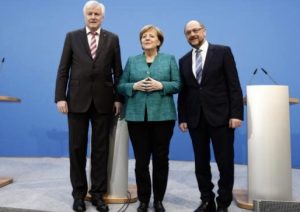
*After long-winding discussions, German chancellor Angela Merkel secured a deal with the SPD to renew a right-left alliance after making painful concessions on Europe and fiscal policy as well as ceding the finance ministry.
The SPD has criticized the “forced austerity” inflicted by Schäuble on southern European countries such as Greece and had vowed in the election campaign to boost investment. Some conservatives are unhappy with Merkel’s decision to allow the SPD to spend a record budget surplus and to embrace their demands for European reform.
Yet Social Democrat Olaf Scholz, who is expected to become finance minister, said on the 10th of February that Germany should not dictate economic policies to its eurozone partners and that mistakes had been made in the past. He said that the SPD supported sound finances and would preserve Schäuble’s balanced budget policy.
As the Christian Democrats (CDU) leader, Merkel was weakened in a September election last year in which her conservative bloc bled support to a far-right party thrust into parliament for the first time by voters angry at her decision in 2015 to welcome more than a million immigrants. In November the same year, her efforts to form a government with two smaller parties failed, leaving the country in political deadlock and prompting some members of her CDU party to demand a succession plan.
Asked whether she was planning to groom a successor to lead the CDU in the next election, Merkel said she wanted a younger generation from her party to fill ministerial posts in a renewed coalition with the SPD. (Source: Guardian)
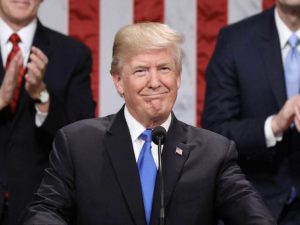
*On Feb. 12, the Trump administration released its 2019 budget proposal for changes to make to the federal government’s spending.
The budget is an important signal of the administration’s priorities. After many years promoted as Republican orthodoxy, eliminating the federal budget deficit is not an element of this budget. To pay for additional defense spending, the border wall and an infrastructure plan, funding would be cut from many executive departments and agencies, including the Environmental Protection Agency (-25%), Small Business Administration (-23%), the State Department, Transportation, Agriculture, Interior, Housing and Urban Development, Labor, Education (-5%), Treasury and Justice (-1%).
NASA (+1%), Energy, Commerce, Health and Human Services, Homeland Security, Defence (+14%) as well as Veterans Affairs (+15%) are among the winners. (Source: Washington Post)
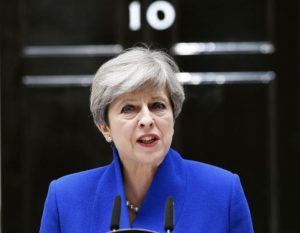
*British Prime Minister Theresa May will deliver a major speech within the next three weeks outlining the future relationship Britain wants to have with the EU. The PM has been under pressure from Brussels and her party to set out her vision for Britain after Brexit.
Before that, senior ministers are also due to give speeches in a campaign dubbed “the road to Brexit” by No 10. Security, the devolution of powers, workers’ rights and trade are to be covered
Theresa May is set to make two keynote addresses in the coming weeks, and arch Brexiteers Boris Johnson, David Davis and Liam Fox will also set out their agendas. Senior ministers are due to hold talks at the prime minister’s country residence Chequers, and soon after that Mrs May is expected to set out her vision.
Mrs May will detail the “security partnership” the UK wants to maintain with the EU. Justice Secretary David Gauke rejected suggestions ministers who favoured a softer Brexit were being silenced. (Source: BBC)
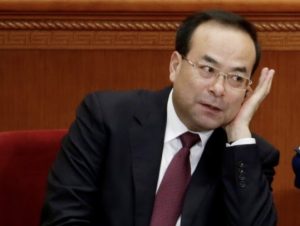
*Sun Zhengcai, former secretary of the Chongqing Municipal Committee of the Communist Party of China (CPC), has been charged with bribery, the Supreme People’s Procuratorate (SPP) said Tuesday. Sun is also a former member of the Political Bureau of the 18th CPC Central Committee.
The indictment paper has been delivered to the First Intermediate People’s Court of Tianjin by the first branch of the Tianjin People’s Procuratorate.
Sun is accused of taking advantage of his posts to seek profits for others and illegally accepted huge amounts of money and property while serving as CPC chief of Shunyi District, Beijing as well as Standing Committee member and secretary general of the CPC Beijing Municipal Committee, agriculture minister, secretary of the CPC Jilin Provincial Committee, Political Bureau member of the CPC Central Committee, and Party chief of Chongqing Municipality, according to the indictment. (Source: Xinhuanet)
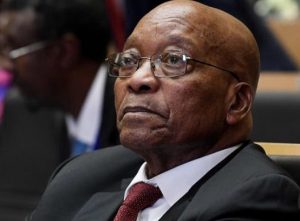
*Jacob Zuma has 48 hours to resign as South African president or face dismissal in a no-confidence debate in parliament later this week, Cyril Ramaphosa, the deputy president told a meeting of African National Congress’s leaders on Monday night, 12. of February, 2018.
After a nine-hour meeting, the ANC’s 86-member National Executive Committee (NEC) agreed to “recall” Mr. Zuma from his position.
Earlier, in a long and politically charged day, South Africa’s opposition parties called for parliament to be dissolved and early elections to be held while the ANC remained locked in talks on whether or not to recall Jacob Zuma.
The president has faced a barrage of calls to step down in recent weeks. (Source: The Telegraph)
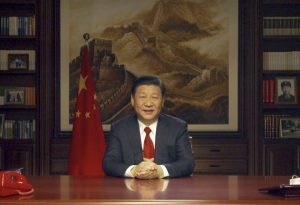
*The well-being of the Chinese people took central place in the New Year speech delivered by the Chinese President Xi Jinping on Sunday, 31. December 2017, highlighting his “people first” governance principle.
Stating the achievements China made in 2017, Xi said gross domestic product had risen to 80 trillion yuan (12.3 trillion U.S. dollars), over 13 million new jobs were created, 1.35 billion people were covered by basic medical insurance, and more than 10 million rural people were lifted out of poverty.
China has set an ambitious target of lifting all its population out of poverty by 2020. The country has already set a remarkable example for the world, lifting over 700 million people out of poverty since it adopted the reform and opening-up policy four decades ago.
“This is a great cause, important to both the Chinese nation and humanity. Let’s do it together and make it happen,” Xi said.
Xi vowed in the speech that China will resolutely carry out reform in 2018: “Reform and opening up are the path we must take to make progress in contemporary China and realize the Chinese dream.” Xi also noted the well-being of the Chinese people cannot be separated from that of the entire mankind.
Xi also vowed that China will resolutely uphold the authority and status of the United Nations, actively fulfill China’s international obligations and duties, remain firmly committed to its pledges to tackle climate change, actively push for the Belt and Road Initiative, and always be a builder of world peace, contributor to global development and keeper of international order.
However, problems do exist in Chinese society that undermine people’s livelihood. Just as Xi said, among the people’s most pressing concerns are education, employment, income, social security, health care, elderly care, housing and environmental protection.
The global vision, as Xi put it, is to chart out a more prosperous and peaceful future for humanity with the joint efforts of the Chinese people and people from other countries.
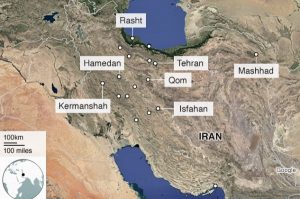
*In Iran, protests broke out since 28. December 2017, causing at least 21 people being killed in clashes with security forces and hundreds being arrested.
The protests began in Iran’s eastern city of Mashhad, initially against price rises and corruption. They have since quickly spread to some 50 towns and cities across the country, including the capital Tehran. Tens of thousands of people take to the streets to vent their anger at the entire establishment.
The demonstrations, reflecting wider anti-government sentiment, are the biggest in the country since 2009, when millions demanded the re-run of a disputed presidential election.
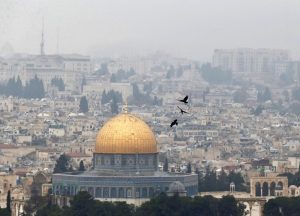
*After recognizing Jerusalem as the official capital of Isreal in December 2017, the US president Donald Trump again dramatically escalated his conflict with the Palestinian leadership, threatening to cut funding for the Palestinian Authority unless it recommences peace talks.
“We have taken Jerusalem, the toughest part of the negotiation, off the table, but Israel for that, would have had to pay more. But with the Palestinians no longer willing to talk peace, why should we make any of these massive future payments to them?” he tweeted, complaining that after millions of dollars being paid every year to the Palestinians, no appreciation or respect has been shown, „They don’t even want to negotiate a long overdue … peace treaty with Israel.”
Trump’s comments came after the US ambassador to the United Nations, Nikki Haley, said during a media conference that the US would cut funds to UNRWA, the UN’s agency for Palestinian refugees, unless the Palestinian Authority went back to the negotiating table.
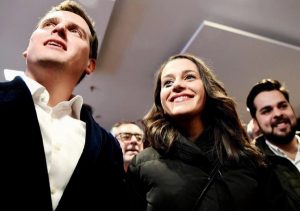
*The result of regional election of Catalonia on Thursday night, 21. December turned out to be „a slap in the face“ for Madrid, who triggered Article 155 of the Constitution, dissolved the Parliament, dismissed Carles Puigdemont and his ministers, imposed direct rule and called new elections after the Catalonian Parliament declared independence on October 27 on the back of a referendum deemed illegal by the Spanish government.
Pro-independence parties secured a renewed majority of seats in the Catalan parliament on Thursday,following the most crucial election in decades with a record turnout of 82%. The three pro-independence parties combined got 70 seats out of 135—enough to form a new government.
It is Spain’s biggest political crisis since democracy was restored in 1975 after the death of Gen Francisco.
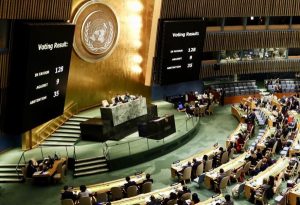
* On 21. December, the UN General Assembly called on the US to withdraw its recognition of Jerusalem as the capital of Israel, saying any decision regarding the status of the city is „null and void“ and must be cancelled.
128 states approved the non-binding resolution while 35 abstaining and nine others voting against it.Voting in favour of the resolution includes the other four permanent members of the UN Security Council (China, France, Russia and the UK) as well as key US allies in the Muslim world. Voting against the resolution were the US, Israel, Guatemala, Honduras, the Marshall Islands, Micronesia, Nauru, Palau and Togo. Canada and Mexico were among the 35 abstaining countries.
US President Donald Trump threatened to cut financial aid to those who backed the resolution.
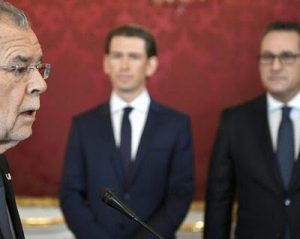
*In Austria, OVP leader Mr Kurz was sworn in as Chancellor (head of government) at Vienna’s Hofburg Palace on Monday 18th of December, while FPO leader Heinz-Christian Strache is the new vice-Chancellor.
Government ministries are split between the two parties under the agreement, with the far right taking control of defence, the interior ministry – which includes security and citizenship – and the foreign ministry. The conservatives will be running the finance, justice business and education ministries.
The new government has unveiled plans for financial “sanctions” on immigrants who keep their own culture and do not “integrate” with mainstream society.
One specific policy outlined in the agreement includes a cut to the basic level of support payments for asylum seekers. The reduction can be recouped by families by earning an “integration bonus” if they are deemed to be adopting Austrian culture, as defined by the government.
The programme also calls for faster deportations of asylum seekers and says undocumented immigration will be halted, as well as vowing to stop the creation of “parallel societies”.
Police said between 5,000 to 6,000 people attended a demonstration against the new government in front of the palace as the inauguration ceremony took place. (Independent)
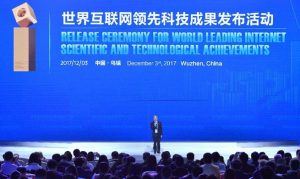
*Upon the opening of the Fourth World Internet Conference on Sunday in the east China town of Wuzhen, Chinese President Xi Jinping said China hopes to encourage countries around the world to take a ride on the express train of internet and digital economic development.
The conference, which runs from Sunday to Tuesday, has the theme “Developing digital economy for openness and shared benefits — building a community of common future in cyberspace.”
Welcoming the government representatives, heads of international organizations, experts, scholars, and entrepreneurs to the conference, Xi hopes that the delegates draw on collective wisdom and enhance mutual understanding so as to deepen exchanges and cooperation on the internet and digital economy, making the internet better serve the well-being of human beings worldwide.
By pointing out that the development of the internet has posed many new challenges for the sovereignty, security and development interests of the world’s countries, Xi stressed on “building a community of common future in cyberspace“.
Xi said China hopes to work with the international community to respect cyberspace sovereignty and to carry forward the spirit of partnership in development, safeguard security, governance participation and benefits sharing. “China’s door to the world will not close, but open wider,” he said.
Over 1,500 guests from more than 80 countries and regions, including government representatives, heads of international organizations, leading figures of internet companies, online celebrities, experts and scholars, are attending the conference.
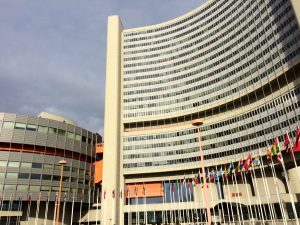
*The President of the General Assembly, H.E. Mr. Miroslav Lajčák, regrets the decision by the United States Government to disengage from the process leading to the global compact for safe, orderly and regular migration.
In the New York Declaration for Refugees and Migrants, all United Nations Member States acknowledged that no one State can manage international migration on its own. Furthermore, they committed to strengthening global governance of migration. To that end, Member States agreed at the highest level to launch a process leading to the adoption of a global compact in 2018.
The role of the United States in this process is critical as it has historically and generously welcomed people from all across the globe and remains home to the largest number of international migrants in the world. As such, it has the experience and expertise to help ensure that this process leads to a successful outcome.
The President stresses that migration is a global phenomenon that demands a global response and that multilateralism remains the best way to address global challenges. In that regard, he counts on the support of all Member States to arrive at a common understanding of this complex issue.
The United Nations should not miss this opportunity to improve the lives of millions of people throughout the world. (UNIS)
*United Nations Secretary-General António Guterres is sending a message on International Day for the elimination of violence against women.
He says „Every woman and every girl has the right to a life free of violence. Yet this rupture of human rights occurs in a variety of ways in every community, particularly affecting those who are most marginalized and vulnerable. Around the world, more than 1 in 3 women have experienced physical and/or sexual violence in their lives; 750 million women were married before age 18, and more than 250 million have undergone Female Genital Mutilation.
„Women’s rights activists are being targeted at alarming levels, and violence against women politicians impedes progress on women’s civil, political, social, economic and cultural rights.
„It is now widely recognized that violence against women, including harassment and harmful practices, are major barriers to the fulfilment of human rights, and a direct challenge to women’s inclusion and participation in sustaining peace. Without tackling it, we will never fulfil the 2030 Agenda for Sustainable Development.
„It is time to further our collective action to end violence against women and girls for good. That takes all of us working together in our own countries, regions and communities, at the same time, towards the same goal.
„The United Nations is addressing violence against women in many ways, including the UN Trust Fund to End Violence against women; the ‘Spotlight Initiative’ with the European Union to connect our efforts with those of national governments and civil society; and the UN Safe Cities and Safe Public Spaces Global Initiative.
„In addition, my zero-tolerance policy towards sexual harassment in the United Nations is part of the Strategy on Gender Parity that was launched in September. We have also committed to continuing the ‘UNiTE to End Violence against Women’ Campaign, under the new title ‘UNiTE by 2030’.
„It is time for united action from all of us, so that women and girls around the world can live free from harassment, harmful practices, and all other forms of violence.“ (UN Information Service)
*The President of the 72nd session of the United Nations General Assembly, H.E. Mr. Miroslav Lajčák, will travel to Vienna, Austria, on 27 November 2017, to visit the United Nations Office at Vienna.
While there, he will deliver opening remarks at the 17th Session of the General Conference of the United Nations Industrial Development Organization (UNIDO), which will be held under the theme, “Partnering for Impact – Achieving the Sustainable Development Goals”.
In Vienna, the President will hold bilateral meetings with: H.E. Mr. Alexander Van der Bellen, Federal President of the Republic of Austria; H.E. Mr. Sebastian Kurz, Federal Minister for Europe, Integration and Foreign Affairs of Austria; H.E. Ms. Doris Leuthard, President of the Swiss Confederation and Minister of Environment, Transport, Energy and Communications; H.E. Ms. Kolinda Grabar-Kitarović, President of the Republic of Croatia; Mr. Yury Fedotov, Director-General of the United Nations Office at Vienna and Executive Director of the United Nations Office on Drugs and Crime (UNODC); and Mr. Thomas Greminger, Secretary-General of the Organization for Security and Co-operation in Europe (OSCE).
The President will then travel to Geneva, Switzerland, to address the 108th Session of the Council of the International Organization for Migration (IOM) on 28 November. The President will also participate in an exchange with Geneva-based actors on the theme “Sustaining Peace,” and meet with Mr. Michael Møller, Director General of the United Nations Office at Geneva.“ (UN Information Service)
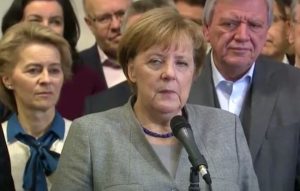
*German chancellor Angela Merkel told the media that CDU and CSU will stand tightly together to get over the most difficult moment right now. Merkel’s failure to secure a so-called Jamaica coalition between her Christian Democratic Union party, the Free Democrats and the Greens has endangered her future as Chancellor and plunged Euro against US dollars.
A long period of economic stability in Germany has been the proud achievement for Ms. Merkel. During her three full terms as chancellor, Ms Merkel has played a leading roll in recovering the euro zone’s economy in the wake of the 2008 financial crisis.
But now, Ms Merkel might face a hard challenge as to how to continue her leadership with an anticipated minority coalition government.
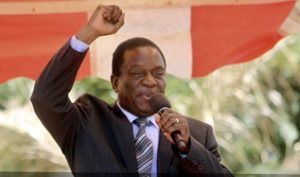
*Mugabe’s ministers will gather for their weekly meeting one week after the coup which happened last Tuesday night. The meeting is set to take place at the State House offices, rather than the traditional Munhumutapa Building in the centre of Harare.
The deposed President of Zimbabwe is reportedly working on “a definitive solution and roadmap for the country” even as he faces impeachment. Zimbabwe’s military says it has held further meetings with the President. Army officials have also confirmed that ousted Vice-President Emmerson Mnangagwa will shortly return to the country to succeed his long-time ally.

*Opium production in Afghanistan increased by 87 per cent to a record level of 9,000 metric tons in 2017 compared with 2016 levels, according to the latest Afganistan Opium Servey figures released today by the Afghan Ministry of Counter Narcotics and the UN Office on Drugs and Crime. The area under opium poppy cultivation also increased to a record 328,000 hectares (ha) in 2017, up 63 per cent compared with 201,000 hectares in 2016.
The increase in production is mainly a result of an increase in the area under opium poppy cultivation, while an increase in opium yield per hectare also contributed. The largest increase of yields occurred in the Southern region where the average yield grew by 19 per cent and the north-eastern region, with a 14 per cent rise.
Afghanistan is the world’s top cultivator of the poppy from which opium and heroin are produced. The 2017 record levels of opium production and poppy cultivation create multiple challenges for the country, its neighbours and the many other countries that are transit for or destination of Afghan opiates. Increased insurgency and funding to terrorist groups is likely within Afghanistan while more high quality, low cost heroin will reach consumer markets across the world leading to increased consumption and related harmful consequences.
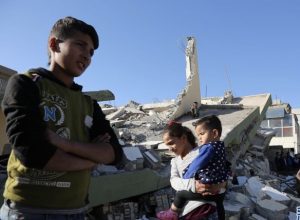
*On Sunday, 12. November, an earthquake of magnitude 7.3, centred 19 miles (30.6km) outside the eastern Iraqi city of Halabja, hit the Iran-Iraq border region, causing the most damage in Kermanshah province, a rural mountainous region in Iran. The earthquake, was felt hundreds of miles away in both Tehran and Baghdad.
Iranian Interior Minister Abdolvahed Mousavi Lari
estimated 20,000 death while a regional politician as well as rescue teams estimated double of the fugure.
Iranian officials declared Tuesday, 14. November, as a national day of mourning. Newspapers broke with tradition, publishing their front page headlines in the Kurdish language, a rare move showing solidarity with the worst-affected Kurdish-majority areas.
Serious questions have been raised about the construction standards of a series of newly built apartments that collapsed or were severely damaged.
Iran has seen powerful earthquakes in recent decades. The 1990 Manjil–Rudbar earthquake in northern Iran resulted in the deaths of 35,000 to 50,000 people. The 2003 Bam earthquake in the southern Kerman province killed at least 31,000.

*A huge new leak of financial documents, dubbed the Paradise Papers, containing 13.4m documents, mostly from one leading firm in offshore finance, has been revealed. Nearly 100 media groups are involved in investigating the papers.
As with last year’s Panama Papers leak, the documents were obtained by the German newspaper Süddeutche Zeitung, which called in the International Consortium of Investigative Journalists (ICIJ) to oversee the investigation.
Many of the stories focus on how politicians, multinationals, celebrities and high-net-worth individuals use complex structures of trusts, foundations and shell companies to protect their cash from tax officials or hide their dealings behind a veil of secrecy.
Keypoint: The vast majority of the transactions involve no legal wrongdoing.
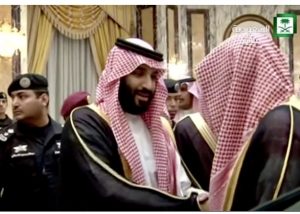
*201 people has been detained as part of a sweeping investigation in Saudi Arabia in the past week, including princes, high officials, military officers and businessmen. Besides, 208 people had been called in for questioning since Saturday evening, among that 7 people were released without charge.
The arrest has presumably to do with more than $100bn worth of misused money through corruption and embezzlement. Critics and observers say the purge is a power grab by the 32-year-old crown prince Mohammed bin Salman to sideline potential rivals and critics. The crown prince is leading the investigation as the head of a newly-formed anti-corruption committee.
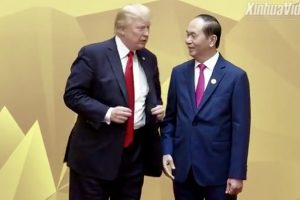
*“I will make bilateral trade agreements with any Indo-Pacific nation that wants to be our partner and that will abide by the principles of fair and reciprocal trade,” the US President Trump said at the Asia-Pacific Economic Cooperation forum in Danang, Vietnam, on Saturday, 11. November, denouncing multi-national trade agreements. “What we will no longer do is enter into large agreements that tie our hands, surrender our sovereignty, and make meaningful enforcement practically impossible.”
The day before (10.November), Trump said at APEC that he is not going to let the United States be taken advantage of anymore, “I am always going to put America first, the same way that I expect all of you in this room to put your countries first.”
Immediately after Mr. Trump, President Xi Jinping of China delivered a sharply contrasting message, championing more robust engagement with the world. Mr. Xi used his own speech to make a spirited defense of globalization, saying relations among countries should be “more open, more inclusive, more balanced, more equitable and more beneficial to all.”
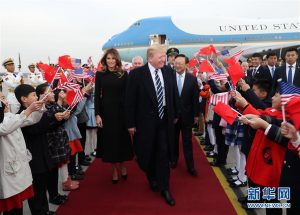
*After his visit in Japan and South Korea, U.S. President Donald Trump arrived in Beijing Wednesday afternoon, beginning his three-day state visit from 8. to 10. of November in China.
Trump’s Asian trip has been stressing on the issue of North Korea. He is asking China and Russia to isolate North Korea more by severing all ties of trade with it.
During his stay in Beijing, Trump will hold talks with Chinese President Xi Jinping and meet with other Chinese leaders on significant topics such as common concern in building new consensus while enhancing mutual understanding and friendship, and promoting bilateral relations in all spheres, according to Vice Foreign Minister Zheng Zeguang.
This is the third meeting between Xi and Trump following their first meeting at Mar-a-Lago, Florida in April and the second in Hamburg, Germany on the sidelines of the G20 summit in July.
This year marks the 45th anniversary of former U.S. President Richard Nixon’s “ice-breaking” visit to China, which began the normalization of relations between the two countries.

*More than 1,600 participants are in Vienna this week for the world’s largest anti-corruption gathering. The Seventh Session of the Conference of the States Parties (COSP7) to the United Nations Convention against Corruption (UNCAC) is being held from 6-10 November 2017.
The United Nations Convention against Corruption, adopted 14 years ago, is the only legally binding universal anti-corruption instrument. Every two years the States Parties to the Convention meet to review implementation of the Convention and discuss how States can better tackle corruption. More than 60 Government Ministers are attending the conference, as well as representatives from inter-governmental organizations, civil society, the private sector and the media.
Among the topics discussed are the role of the private sector in the fight against corruption, the progress achieved by the Convention’s Review Mechanism and the recovery of illicit assets. Another topic focuses on how tackling corruption is vital to achieving the Sustainable Development Goals (SDGs), particularly Goal 16, Peace Justice and Strong institutions.
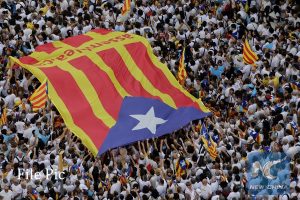
*Catalonia’s separatist government staged a referendum on leaving Spain in September – against the wishes of the national authorities. With a population of 7.5 million, its capital is the proud city of Barcelona.Organisers say 90% backed independence. The region held an independence referendum on 1. October that was declared illegal under Spain’s constitution. The Catalan parliament went on to declare independence, leading the Spanish state to revoke the region’s autonomy, impose direct rule, and call new elections.
The Spanish government subsequently chose to enact Article 155 of the Constitution, which allows for control of the regional government.
The regional government, including ministers and high-ranking officials, were dismissed on Saturday after Article 155 came into effect. Eight sacked Catalan ministers have been jailed by a Spanish judge over their role in the region’s declaration of independence.
The move comes as prosecutors ask judges to issue an international arrest warrant for Carles Puigdemont, the disputed Catalan president who fled to Brussels, as well as four other former ministers who did not show up to court on Thursday.
The former members of the regional government are accused of rebellion, sedition, and misuse of public funds. The crimes are punishable by 30 years in prison.
Catalonia is one of Spain’s wealthiest and most productive regions and has a distinct history dating back almost 1,000 years. Before the Spanish Civil War it enjoyed broad autonomy but that was suppressed under decades of Gen Francisco Franco’s dictatorship from 1939-75. When Franco died, Catalan nationalism was revived and eventually the north-eastern region was granted autonomy again, under the 1978 constitution.
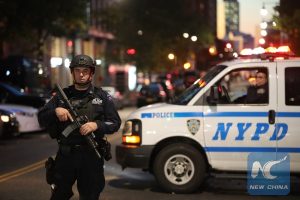
*Eight people were killed and 12 injured in the afternoon of 31. October, when a truck driver struck several pedestrians on a busy bike path in lower Manhattan — an incident New York City mayor Bill de Blasio called a “cowardly act of terror.”
Law enforcement officials said Wednesday that the suspect, who they identified as Sayfullo Saipov, had been planning the attack for weeks, and committed the act in the name of ISIS.
The suspect who exited his rented pickup truck with imitation firearms and was shot by police officers, has been taken into custody, police said.
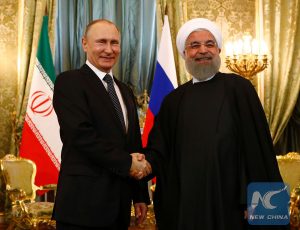
*Russian President Vladimir Putin urged the international community to rally in support of the Iranian nuclear accord after talks with leaders of the Islamic Republic, following U.S. President Donald Trump’s move away from the multinational pact.
The nuclear deal is “working effectively,” and deserves support from all member states of the United Nations, Putin said in a joint statement Wednesday with Iranian President Hassan Rouhani and Azeri leader Ilham Aliyev after a three-way summit in Tehran. Putin also held a separate meeting with Iran’s Supreme Leader Ali Khamenei.
Last month, European allies and his fellow republicans were urging President Trump to preserve the Iran nuclear deal. The White House’s emphasis on Iran is shifting towards other issues, such as its missile program and its support for extremist groups throughout the Middle East.
The 2015 accord to curb Iran’s nuclear program was negotiated between Tehran and the U.S., Russia, France, Germany, the U.K. and China.
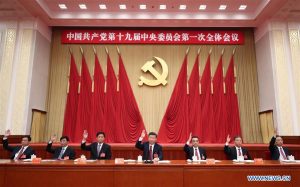
*The 19th National Congress of the Communist Party of China was held in Beijing from 18 to 24 of October, 2017. The congress was closely watched mostly due to a far-reaching change in the makeup of the top leadership of the Communist Party of China. These include the 25-member Politburo, the 7-member Politburo Standing Committee and the Central Commission for Discipline Inspection, the internal discipline organ that has come to the political foreground since 2012.
Five members of the 18th Politburo Standing Committee left the body due to having reached retirement age, while five new members joined the 19th Standing Committee, namely, Li Zhanshu, Wang Yang, WangHuning, Zhao Leji and Han Zheng.
During the congress, a new guiding ideology, labeled Xi Jinping Thought on Socialism with Chinese Characteristics for a New Era was written into the party’s constitution, marking the first time since Mao Zedong Thought that a living party leader has enshrined into the party constitution an ideology named after himself.
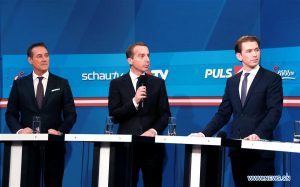
*Austria held a parliamentary election on October 15. The ballot resulted, as expected, in the victory (31.5%) of the People’s Party (ÖVP) with Sebastian Kurz as its candidate. Sebastian Kurz, 31, is set to become Austria’s youngest ever chancellor. A coalition government featuring Austria’s far-right Freedom Party (FPO) is in process, which won up to 26 percent of the vote.
The hot issues are surrounding the rise of the far right, immigration, reform of the EU, and the role of Islam in society. They have featured prominently in a number of elections within the bloc. The current Austrian election mirrors the discussions permeating the European Union at the moment and has been therefore watched closely across the European Union, as the bloc seeks stability in the wake of the UK’s Brexit vote last year and a recent far-right surge in September’s German Election.
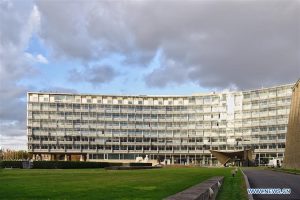
*The Trump Administration says the U.S. is withdrawing from the United Nations’ cultural body UNESCO,citing “anti-Israel bias” as one of its reasons. The withdrawal will take place on Dec. 31, 2018. The State Department said on Thursday that the U.S. will instead establish an observer mission at UNESCO, which is known for designating world heritage sites. Director General of UNESCO Irina Bokova expressed her “profound regret” with the decision. The United Nations Educational, Scientific and Cultural Organization was created in 1945 with a mission to celebrate cultural diversity and foster intellectual cooperation and the free flow of ideas among the world’s nations. Among its first projects was to rebuild libraries, schools and museums destroyed during World War Two. The agency is best known for its World Heritage program, which protects traditions and cultural sites across the globe.
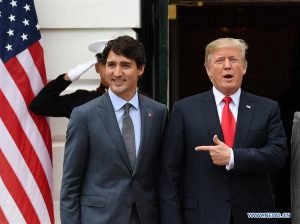
*In meeting Prime Minister Justin Trudeau of Canada, Trump said that it was “possible” that the USA dropped out of Nafta, the North American Free Trade Agreement established in 1994. The collapse of Nafta would damage trading beyond Mexico. Cananda and the USA, expecially in industries like the manufacturing, agriculture and energy.

*With flights as cheap as sometimes $15, an array of low-cost airlines have tramsformed travel in Europe. But these cheap airlines are right now falling apart one after another. Air Berlin filed for insolvency in August. Alitalia filed for bankruptcy in May. Ryanair had to cancel thousands of flights recently which affected about 75,000 passengers flying British Airways.

*The 55. Viennale opened on 19. October at Film Museum in Vienna just closed its curtain. 300 films was shown within two weeks. The yearly festival has been a discovery trip of movie’s past and present, covering retrospectives, hommage, tributes, documentaries, short films, special programs and teasers of new movies in 2017. This year’s retrospectives will showcase the Soviet Union films between 1926-1940 as well as between 1956-1977. The Viennale offers platforms for related lectures, exhibitions, concerts and a few film prizes, too.
(Sources include BBC, CNN, The Guardian, Times, The New York Times, Bloomberg, Xinhuanet, etc.)


very good!